#It has changed over the years but the most vital arcs REMAIN
Explore tagged Tumblr posts
Note
How long will it take till El and Guzma start showing *CANON* feelings towards eachother?
*looks at planned story arcs* Ok so we have regular bonding shenanigans, then we have a vital Guzma arc in here, an El arc planned as well, plans for Season 3, scheduling time for comics between commission work and other projects, calculating... ...ah shit we'll be here for another 7 years again, won't we

#I HAVE NO CLUE HOW LONG THIS WILL TAKE TO MAKE TBH#I HAVE AN OUTLINE OF THE WHOLE STORY#and I mean the W H O L E STORY#It has changed over the years but the most vital arcs REMAIN#I'm working on a new comic RIGHT NOW and I hope I'll continue to improve on my working efficiency#so panels get done quicker with more simplified shading and backgrounds#I AM getting faster at drawing humans I noticed so that's great!#I hope you'll enjoy the ride because there's a lotta good stuff in there along the way!#mod#reply
181 notes
·
View notes
Text
The Sailor Moon AU born from my saltiness towards the manga
Read this for context. tl;dr: basically my love for Sailor Moon's 90s anime and 2003 tokusatsu has only grown over the years, while my feelings for Crystal remained at pure hatred whilst my feelings for the original manga has taken a sharp decrease.
In other words, I seem to work backwards from most other Sailor Moon fans.

Over a year ago, I had written out a hypothetical of how Sailor Moon's manga would play out if Naoko Takeuchi rejected the Super Sentai concept and made Usagi a (mostly) solo hero, sort of in the vein of Sailor V but much less fun with even more tragedy. I guess you could say it's a Sailor Moon but with more of a Kamen Rider motif?
Either way, I never released it anywhere until now. Mind you, it's not really a story so much as it is a gathering of ideas for a story...

THE SAILOR MOON MINIMAL SENSHI AU
One nagging sentiment I felt while rereading the manga is how it so often felt like Usagi, Mamoru, and Chibi-Usa were the only characters who mattered, and on several occasions the only characters who were able to get anything done. Even on the rare occasions where other characters got a chapter named after them, oftentimes the Moon Family still had more pages dedicated to them, and/or the non-Moon Family character's power-up ultimately became more of a battery to beef up Usagi and the character development was often minimal and inconsequential.
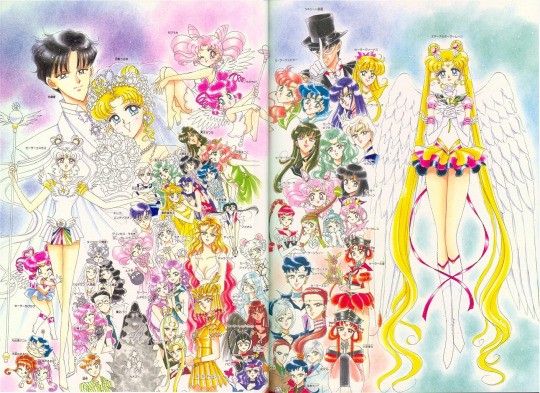
Crystal amplified that feeling many times over, but it was disheartening to realize one aspect of the source material it did justice was marginalizing the rest of the main cast. If I were to look at this in a super-cynical light, I'd hypothesize the likelihood that Naoko never wanted a big cast, or even the Core 5 team. If she did care about the non-Moon Family characters, perhaps it was out of obligation.
I'm willing to bet that the main reason Naoko Takeuchi bloated out her cast was due to mandates from TOEI hoping for more toy sales if more heroic Sailor Senshi existed. But that's just my headcanon on what must have been a nightmare production behind the scenes.

So it made me wonder about how the manga would have been if it “trimmed the fat”, so to speak. For all of Usagi’s protestations about how she “can’t use mist, fire, or lightning” to be useful… well, let’s face it: she already had a higher kill count than all of her friends even that early on in the story. Mamoru often had little episodes later on in the manga where he felt oh-so useless and powerless even though he’s killed monsters/notable antagonists plenty of times AND regularly takes part in killing off the main antagonists WITH Sailor Moon (while her friends were benched, even when they weren’t ragdolled into submission).

So, how much would really change in the manga if Sailor Moon was largely by herself with very few allies who could help her in battle? I can easily picture Mercury, Mars, and Jupiter being snipped from the story entirely.
Believe me, it KILLS me to say that. Mercury was my favorite since the beginning. But if I'm being honest with myself, it'd only take a few tweaks of the story beats to make Sailor Moon's first three allies completely superfluous.
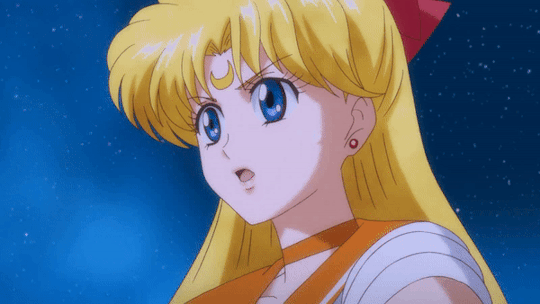
For story purposes, Sailor V/Venus would have to stay in since she does play a vital role as a princess decoy, but otherwise… what if she lost her power entirely after the reveal of the true Princess Serenity? Or dies soon after? Without a team to lead, Minako wouldn’t serve much of a purpose. Heck, in this AU she wouldn't necessarily even need to wield Venus' power (since so few other planet powers are getting represented here) so much as a bootlegged copy of Moon Power.
We have a canon example in the Black Moon arc of how Venus was just “there” for much of it, even when she didn’t have to contend with her three teammates for spotlight/exposure. Hell, I recall her complaining in the manga that she’s bored and frustrated because she can’t do anything.
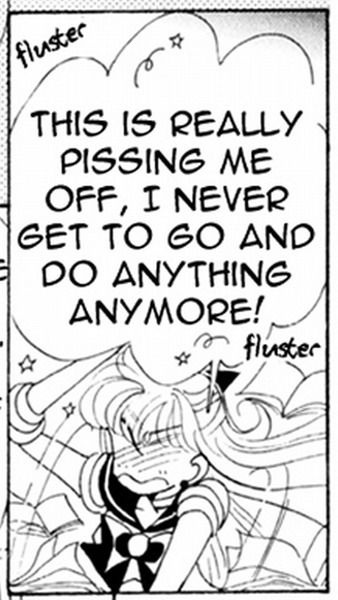
Luna and/or Artemis can easily substitute the exposition given by Venus.

Chibi-Usa would stay on and become Chibi-Moon; as previously stated, she’s a consistently focused-on character in the manga. In fact, she's highly integral to 3 out of the 5 story arcs. Definitely enough to the point where most of the manga would have to be changed if she was denied Senshi-ship.

Sailor Pluto… is tricky, but not impossible to write around. She’s heavily tied in with Chibi-Usa’s backstory and character growth. As Chibi-Usa’s friend and Time Gate guard, that much would stay the same. I would argue that Pluto needn’t be a Senshi to serve either role (she’s succeeding her father Chronos iirc, and Takeuchi is firm in her stance that men can’t be Senshi). So it can be arranged that she can maintain her duty as plain ol' Setsuna. It's heavily implied in the manga that she's not a reincarnation like the other Senshi were... at least, prior to her canon death. It wouldn't be too crazy to say Setsuna has beyond-mortal powers that give her extended life even without being a Senshi.
Hell, Queen Serenity basically enlists this child to duty saying "Here's all these awesome powers that you're not only not allowed to ever use, but if you DO use them, it'll end up killing you!" - Setsuna shouldn't need her powers to guard the Time Keys, and we've seen the Talismans can be held in civilian form. Though I'd argue her Garnet Rod needn't be a proper Talisman if she isn't to transform; it'd just be her means of self-defense.
Perhaps she never gets revived/reincarnated after her death? Because her connection to Chibi-Usa greatly diminishes from Infinity (and beyond).
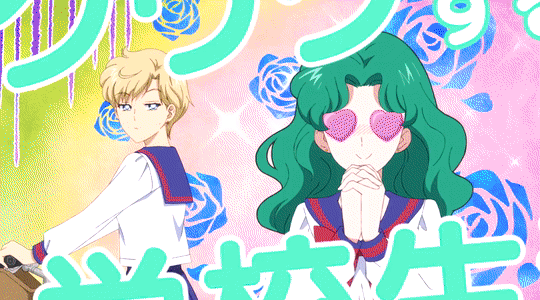
The rest of the Outer Senshi… well. If one tweaks the Talisman prerequisite for the Holy Grail, such as make it LESS than three needed…
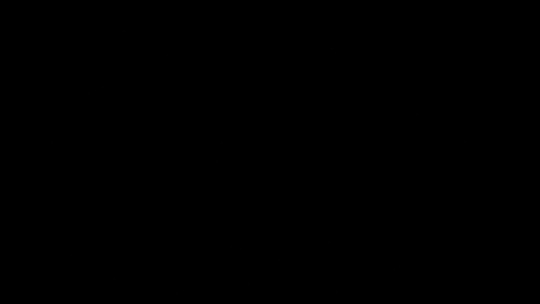
That’s all you need to cut Sailor Neptune and Pluto out entirely of the manga for sure. As much as I love Michiru, I can’t deny she is the epitome of “just there” in the manga. Pretty sure no one’s gonna contest this.

Even her relationship with Haruka is a side-note compared to Haruka’s constant pining/angsting over Usagi. I just kept getting this sense of Michiru being Haruka’s silver medal.

Haruka and Hotaru are the hardest ones to write around for this concept. That much I will admit.
But, one running theme for this AU is that, Moon and Chibi-Moon aside, no one else can wield the power of a Sailor Senshi indefinitely. Well, technically Mamoru is still there representing Earth, but only so much as he's able to in his canon iteration due to that pesky Y chromosome. I slated for Minako to permanently lose her power, and possibly even die for it once her narrative purpose was fulfilled.
Even if Setsuna remained a Senshi in this revision, it’s a similar outcome for her. In a best-case scenario for the latter, a reincarnated Setsuna likely would have no memory of her lonely past life and possibly come off as an entirely different person from who Chibi-Usa knew. She'd finally be able to live out a normal life no longer bound to duty and that's about as happy an end I could imagine for her.
(And hey, that’s all the more impetus for Chibi-Usa being drawn to Hotaru!)

Going back to Hotaru, then, her being a cyborg in this iteration of the story lends well to a tweak in the narrative: Pharaoh 90 attempting to artificially replicate the Moons’ Senshi powers, possibly referencing the means in which Minako was temporarily able to wield her power, to create a Sailor Senshi exclusively to realize its desires. One might say it's a perversion of the Moon Power itself.
But tampering with this dangerous power ends up corrupting Hotaru, of course, and retaining how Hotaru becomes Mistress 9 works nicely with this tweak. A Silver Crystal could sustain her powers without destroying her, or at least that's the running theory.
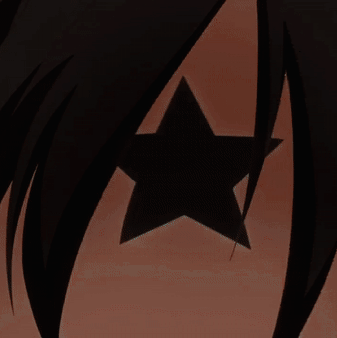
Whether or not Hotaru becomes a Sailor Senshi proper… I’m 50/50 on that. Mostly due to Saturn’s canon role as cleanup duty following the fall of the Silver Millennium. If any non-Moon Senshi were to exist for the long haul, it should be Saturn. Their powers are polar opposites, so it’d be a neat yin-yang deal, with Saturn still being dormant until an equalizer is needed.
Although I'd probably not call her Sailor Saturn, as it is arbitrary to include some planets (Venus, Saturn, Uranus) but not others. In general, I think the names of the non-Moon Senshi that have to be kept because removing them would completely upend the story would have to be a little more generalized than that. The Moon is often paired with the Sun and the Star(s), so that might be a safe bet. Even though the Sun itself is literally a star-
Anyway, keep Hotaru's rebirth a thing, but possibly end her role in the story once she becomes babby. So that Chibi-Usa, as canon manga mandates, seeks horse-boy as her rebound.

Alternatively, we could stay the course of the “Moon only” team narrative and have Sailor Saturn be little more than an artificial Senshi, not unlike the kinds we see all over the place in Stars. Between Dr. Tomoe, Kaolinite, and Pharaoh 90, I can buy them creating what is essentially a bootleg Senshi. Heck, that might even be the intended evil purpose of the Holy Grail once Uranus unlocks it with her Talisman.
Speaking of Haruka... Honestly, as far as the manga goes, she can single-handedly represent the Outer Senshi and their credo by herself.
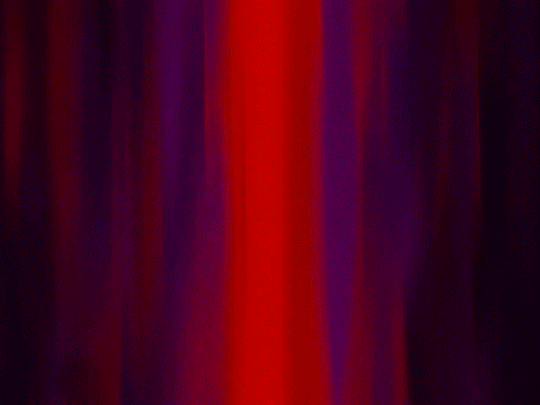
But in the context of this AU, that doesn’t amount to much, lol. Honestly, I’m picturing Haruka as a darker counterpart of Minako. A temp Senshi at best, but one who’s using her powers for morally questionable reasons. This can range from romantic rival… (with no Michiru in the AU, that at least partially makes Haruka less awful - I’d nix the non-consensual kiss on Usagi, but in the spirit of a manga LITTERED with suchlike kisses, it’d probably need to stay as-is)
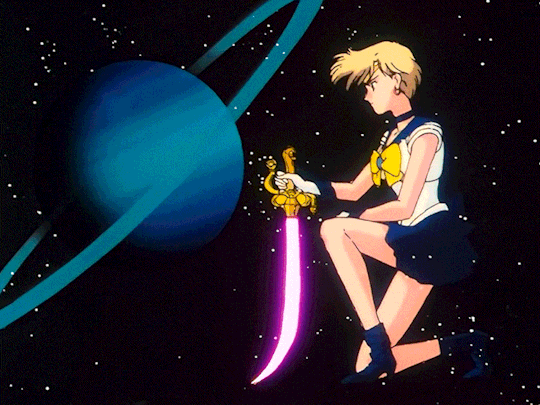
…. to embittered and vengeful foe who fully recalls her past life and blames Usagi+Mamoru for their failings. It was kind of a shit deal for the Outers to be permanently stuck in their post in the outer solar system, never getting to enjoy any of what they're dedicating their lives to serving. Perhaps she now perceives the practices of Queen Serenity as morally dubious at best - and tyrannical at worst, now believing, maybe, that the Dark Kingdom was RIGHT to end the Silver Millennium. And irony ahoy, Haruka - like Minako - can tap into her former life’s power. Make her take up Michiru’s role as the one who awakened as a Senshi on her own thanks to her Talisman.

Hell, one can have Haruka play both sides during Infinity. Tomoe can use his twisted science to amplify the "Uranus" powers to bypass the limitations of Venus’ powers. Probably at a deadly cost down the road.

As for the prerequisites for Super Sailor Moon? The whole “all Senshi aligned + grail” deal? Well… y’know, the Cutie Moon Rod came into existence as a trial run of how UsaMamo’s love is so potent that they don’t even need to do a WooHoo to procreate shit. Do that again, just add the actual product of future WooHooing. Chibi-Usa is familiar with the Holy Grail prior to its creation. Not a stretch. As far as this AU is concerned, Moon, Chibi-Moon, and Tuxedo Mask are the only "valid" Senshi to begin with.
Despite the amount of non-Moon Senshi chapters in Dream, I don’t see much changing in a setting where only two Moons and a Mask are fighting. For pretty much every arc, Usagi gets the lion’s share of killing blows. Mamoru and Chibi-Usa canonly have several as well - so what’s a few several more?
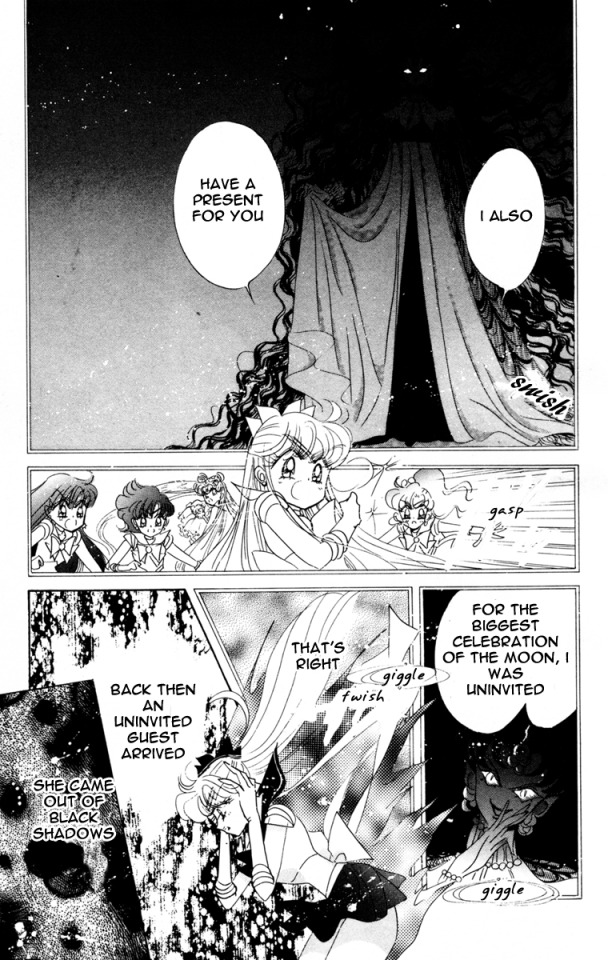
After all, the manga’s focus was always first and foremost on Miracle Romance. More often than not, when other characters got panel time, Usagi, Mamoru, and/or Chibi-Usa were the topics of discussion.
At the end of the day, the antagonists of Dream are squarely focused on screwing over the Moon family; the other Senshi were mere chess pieces for them to knock over. And they only became an actual threat when they literally handed over their newfound powers over to beef up Super Sailor Moon to Eternal Sailor Moon, so... there you go.
And for those few times Usagi was just hanging out with gal pals at school? Well, that’s what Naru is for. Hell, add Yumiko+Kuri too; they might end up with some degree of characterization! Usagi never not had the benefit of company during downtime! There just... tends not to be a lot of that in the manga; that's all.
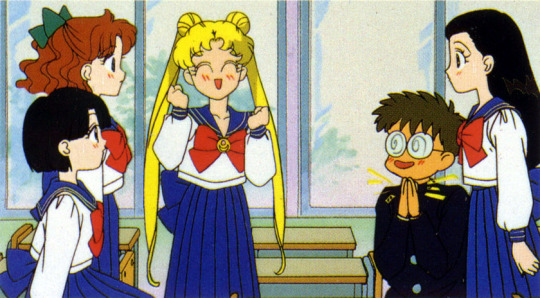
Really, the biggest question in handling Dream is wtf to do about the Amazoness Quartet, considering they eventually become Senshi themselves - namely the equivalent of Inners for Chibi-Moon to have in the future. Since Usagi wouldn't have Inners in this AU, it stands to reason the Quartet are likely not gonna be redeemed and likely one-shotted much like their Trio predecessors.
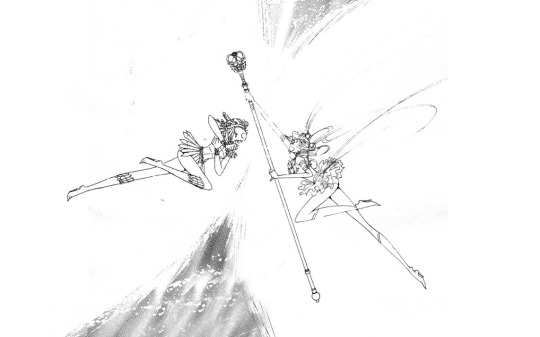
As for Stars...? Well, it's basically this entire AU but dialed up to 20. The running theme of this arc is fake Senshi running around parading as the real deal while they kill, conquer, and pillage for their tyrant, who'd be the culmination of all the worst aspect of not just past antagonists, but past attempted would-be Senshi like Minako, Haruka, and Hotaru who would all either be permanently powerless at best or dead at worst.
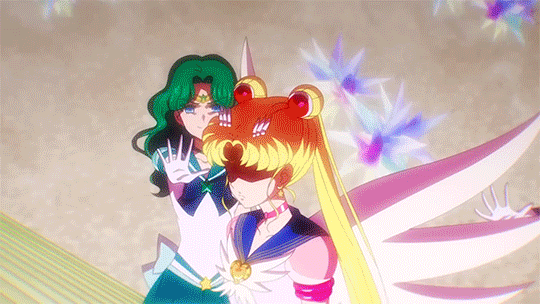
But a worst-case scenario just might make them come back for one last go, and this time, there's be no blurred lines or moral greys: if Venus, Saturn, and/or Uranus made a return in this iteration Stars, that would be their permadeath. Unless, you know, this series still ended with Usagi yeeting herself into an automatic happy ending. And even then it's a big maybe. It'd be in Galaxia's hands, and you know Galaxia don't give a damn.
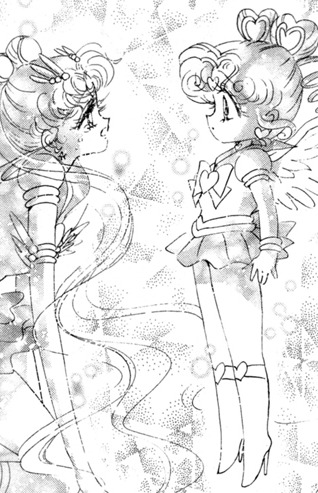
Chibi-Chibi/Chibi-Chibi Moon would still be a thing, as would Sailor Cosmos, obviously, since they're technically a form of Usagi and all. Their stories would largely be the same, I'd imagine.
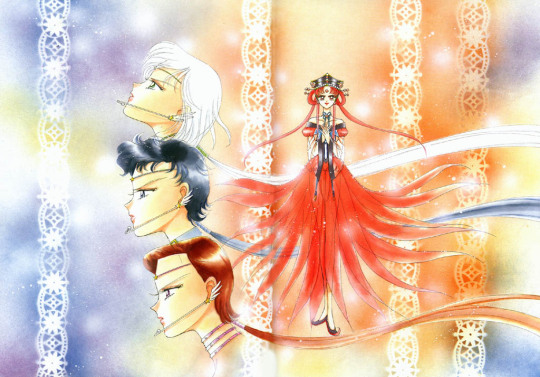
I honestly can't think of where I'd put the Starlights and Sailor Kakyuu as good guys in this AU, though. I think the only way to make them work in the story and not be killed as quickly as possible like the Sailor Animamates is to have them allied with Galaxia and be functionally identical to Animamates (aka they're all fakers), but function as undercover agents to identify the holder of the Milky Way's strongest Sailor Crystal (Usagi's), find her weaknesses and the best ways to corner her, then coordinate a strike.
Alternatively, pull inspiration from the 90s anime where they ARE legit Senshi (they just come from another galaxy and all, so it wouldn't break the AU if they're more just reflections of the minimized Sailor Team) - but make them willingly surrender their Sailor Crystals in exchange for bracelets that will keep them alive, so long as they do whatever Galaxia says. Then they become reflections of Usagi and her family, and even perhaps make analogies between the three Starlights and what Venus, Uranus, and Saturn tried and failed to be for Sailor Moon.

The other elephant in the room is whether or not Mamoru gets killed off in the very first scene of this arc like he does in canon. It's a no-brainer that he'd have to die by Galaxia's hand eventually. Usagi just won't have nearly as many buffers to block her PTSD and be in total denial like she did in canon. Naturally, Chibi-Usa will be even less effectual than canon since she won't have her own personal underlings to pretend she's BFFs with and add firepower, so if only to balance that out (since the Sailor Quartet are literally the only ones who didn't die at any point in canon), Mamoru might be allowed to live a bit longer and make his love-forged bond with Usagi not quite so easily broken. But it will still break by force, one way or another.
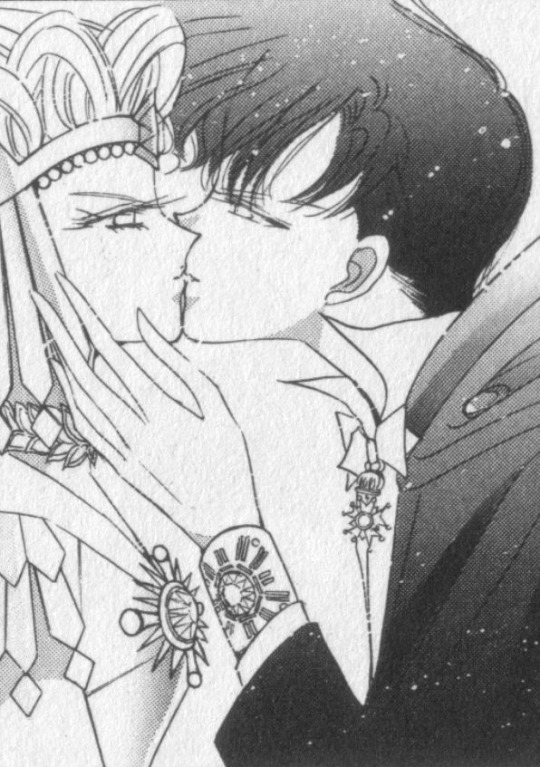
Of course, because Galaxia's intent will still be to break Usagi, no one's getting spared at this point in the story. All of Usagi's normal civilian friends will end up biting it one way or another throughout the arc. Stars is clearly meant to be a depressing af climax to the series - at least that'll kinda deter people from hounding the mangaka into yet another arc for money's sake.

Usagi would ultimately jump into the Galaxy Cauldron at the end, though I imagine it'd be somewhat a different experience than how it was in the manga, given most of her friends don't exist in this AU, and the few that do either left/died on bad terms, or fucked off entirely without remembering Usagi or her family at all.
Maybe, if we're being generous, Usagi reunites and the temp/fake Senshi she encounters here actually make amends and promise to work for a better future? There's a lot of variables here.
It'd still end in a wedding because this is the Miracle Romance Supremacy AU, after all. Guess it depends on your mileage whether or not the ending is worth it.

So yeah, that's the long and short of the really fucked up AU I thought up inside my head because friendship and comradery always came off so hollow in the manga to me. Especially with ~Miracle Romance~ being so infuriatingly inflexible in the manga.
Hope you got some sort of entertainment value out of that. Highly doubt I'd write this proper - it wouldn't be worth the backlash, and I'm not nearly invested enough in UsaMamo to do this concept justice.
Feel free to leave your thoughts or whatever.
#sailor moon#sailor moon au#bishoujo senshi sailor moon#pretty guardian sailor moon#sailor moon manga#sailor moon manga au#usagi tsukino#chibiusa#small lady#usagi small lady serenity#mamoru chiba#tuxedo mask#super sailor moon#eternal sailor moon#sailor chibi moon#super sailor chibi moon#eternal sailor chibi moon#chibi chibi#sailor chibi chibi#sailor cosmos#minako aino#sailor venus#haruka tenoh#sailor uranus#setsuna meioh#sailor pluto#hotaru tomoe#sailor saturn#galaxia#sailor galaxia
15 notes
·
View notes
Text
Hirogaru Sky Impressions (1/5)

We're in for 48 episodes so I'll do these after every 10 episodes until the end.
And I'll try to keep it short since I'm sure most of the major topics have already been discussed in great length anyway so I don't want to add to the redundancy.
Simply put, this anniversary season has been a blast of heartwarming fun so far. Not to mention, quite innovative in regards to the franchise as a whole. The breaking of old trends is excitingly refreshing while the show is still keeping it very Precure in spirit.
If anything, SkyPre (HiroSky? HiroPre? which way are we calling it?) feels the most Precure to me since probably StarPre and I think that's due to how the writing is handled this year.
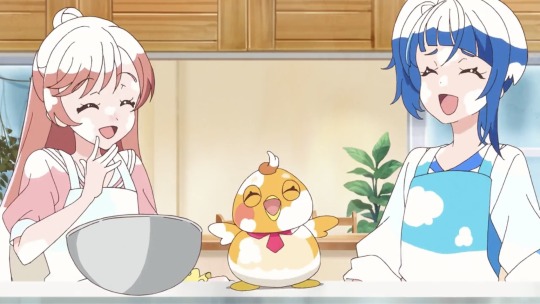

Story format changes
I'm very happy that they went for spreading out the introductions and pacing the debut schedules instead of bunching the first four episodes with one new transformation after another.
True, this technically started with DeliPaPre but last season was rather weak in the characterization and group chemistry departments that the effort seemed almost wasted.
Of course, I'm not saying the DeliPa girls were a poor team or anything. They were alright.
But when you watch SkyPre, the development just feels so much more satisfying, don't you think?
Starting the season off with paired Cures (as a tribute to FutariWa, kyaa! 😆) was a great idea because it gave a lot of time for Sora and Mashiro, the first members, to bond and find their groove as partners while establishing their characters through their individual personalities, goals and inner conflicts.
Then incorporating more Cures as we go along (Tsubasa/Wing and later, Ageha/Butterfly), we have something to look forward to every week instead of letting the hype die down right after everyone debuted already...until it rises up again with the reveal of the next stock footage only to go down again and repeat.

Precure's strongest trait as a magical girl series has always been its theme of friendship and teamwork. However, you can't achieve a solid execution of that theme well if you don't actually devote time and focus to the build up of genuine camaraderie.
And the basic foundations for that lies in everyone acknowledging each other's different strengths and demonstrating how vital and valuable those are to the group.
Ep 10 really reinforced those principles (even letting Sora and Mashiro dismiss the villain cuz their friendship moment with Tsubasa came FIRST 😤) which is great cuz with Ageha's debut coming up around the corner, we can rest assured that this aspect will remain steady for at least another 10 episodes.

2. Characterization
To have a good diversified team, naturally you would need distinctly carved out characters (in other words, more than just archetypes).
SkyPre does display some old patterns but that's not a bad thing since the show largely avoids over reliance on them by giving each Cure a significant amount of depth to work with and specific goal(s) to aim for.
For Sora, Tsubasa and Ageha, their personal character arcs are quite clear and they all fit into a type of hero to go along with the season's motif. Cure Sky being a traditional ally of justice, Cure Wing as the knight to Elle-chan's princess. And Ageha wishes to become a nursery teacher, which is a very admirable ambition as teachers can serve as role models to children.
That leaves Mashiro, who's been troubled on several occasions for not having a dream of her own.
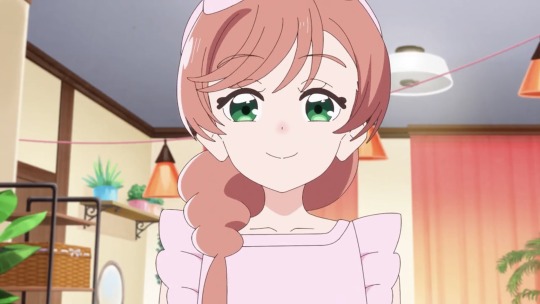
But I don't believe this means an absence of a character arc for her. At the very least, there's certainly no lack of conflict since she realized the "problem" herself and has been given screentime to address it and overcome her own doubts.
Perhaps this is also indicating that "finding her dream" is her goal and learning to accept her own "light that illuminates others" is part of that discovery process.
Mashiro's personality and drive is very supportive in nature, after all. We saw that in how she was very welcoming and accommodating of Sora and Tsubasa, residents from another world. We saw that in how she was the one to comfort Ageha, who is older than her, in the past when they were both small children.
And that is a type of hero, too.
You don't have to be super confident or bold and forthright. You don't have to be a leader or force stereotypical notions of heroism onto yourself to be a hero.
You just need a good heart and to be able to act on it.
Chances are, if you were kind to someone in need or helped someone less fortunate because you knew it was the right thing to do, then you already qualify as a true hero.
I believe that is the message of Mashiro's story.
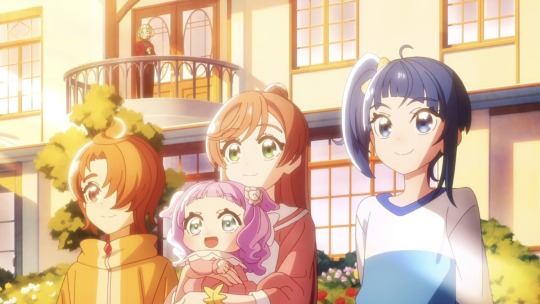
That said, we already got so much good content and we still have so much to look forward to. Yay! 😆
Ageha/Cure Butterfly joining the team foremost (sometime after ep 15 apparently since the next announced titles don't list her name yet)
More villain generals appearing soon and therefore, more insight into what they're really after (though it's probably gonna be generic evil as always but eh, whatever cuz everything else is awesome).
More on the person who saved Sora and inspired her to become a hero, Tsubasa accomplishing his dream of being able to fly w/o the assistance of magic.
Ellee-chan's mysterious powers, oooh~
First group attack, group power-up + power-up attack, ultimate power-up (??)
Midseason Cure already spoiled but we all know who it's going to be anyway and the question if her debut will fall around the early 20s or later with the shift in narrative arrangement (see above).
Hehe, yep it's gonna be great 😁
(on another note, they now have 38 more episodes to fix Prism's transformation sequence cuz god, did they do her dirty. Especially her going MIA on the "JUMP" platform did she jump so hard she went to Skyland?! and the static split screen. I can let go of everything else but PLEASE. FIX. THOSE. DAMMIT!! 🫵💢)
#it's unnerving cuz Sky and Wing's look so magnificent and Prism's is just...like they don't even care#that fed into my fear of Mashiro not getting any proper attention in story cuz it DID happen with other Cures before#no arc and there to just fill the placement seating#but thankfully ep 10 allayed that worry somewhat#so now it's just an animation issue#still can't believe they haven't fixed that JUMP screen yet like wtf#anyways see you in another 10 eps~#hirogaru sky precure#cure sky#sora harewataru#cure prism#nijigaoka mashiro#cure wing#yuunagi tsubasa#hijiri ageha#cure butterfly#ellee-chan
29 notes
·
View notes
Text
Blog Post 1: The journey before Psychology
(This blog post may be a little personal because I'll be sharing personal stories about myself in correlation to Psychology.)
An introduction to my fascination with psychology.
I honestly did not expect that I'll be in a course related to the field of psychology. Even before my elementary days, I have always wanted to study any course in hard sciences, such as pharmacy, biochemistry, and biology. And while psychology interests me, I didn't see myself working in this field before, which is why I chose to remain fascinated by it without considering everything related to it as my course once I enter college. Fast forward to my high school era, and this is when my curiosity in psychology grew bigger, for I, myself, needed some help with my mental health. I was not diagnosed as having any mental health issues, but I knew I was not fine during those years. My mood varied and changed within seconds, I had experienced waking up tired, and I even had constant sleep paralysis that I still encounter up to this day. To summarize everything, those years were when I realized how big of an impact psychology has on society. Of course, I did not think of psychology as a useless course, like most Filipinos, sadly; however, it's true that experiencing the need for service it can provide firsthand can actually increase how you appreciate something, and in my case, I had it the hard way.
A sudden change of heart
Those were the times that pushed me to add behavioral sciences and psychology as my course choice at the university. Maybe having the knowledge of psychology can help me deal with myself, and those that I felt before might gradually improve once I understand it at a higher level of understanding. I didn't even expect I’ll be accepted into behavioral sciences. At that time, what I thought was maybe this is a sign that everything will soon fall into place and that I might have the chance to improve my state and well-being.
Who am I before Psych 101?
To answer the question of who I was before Psychology 101, I am an ordinary person seeking guidance on how to handle myself better—to understand the reasons that caused everything that happened to me over the past years. I may have the fault for not seeking professional help, but I know that my being here and taking up this course can help me a lot. Before Psychology 101, I was also a student dreaming of learning things to be applied not only to myself but perhaps to other people in the future. Since I know that my course can equip me with these skills, why not use it to help other people who are also experiencing things that I did experience as well? If the knowledge I may gain here may be beneficial for others, then why not use it, right?
In Conclusion:
Accept it or not, psychology nowadays is an integral part of society that needs more experts to supply services for people who need help, like me. Despite society being in denial of how vital it is for us, we still cannot deny the existence of mental health problems that are prevalent within societies. This is why I, as an incoming student in Psychology 101, am thrilled to learn to help myself and possibly other people by sharing what I may get throughout this semester.
DRAFT
Introduction: Background tungkol sa sarili na maikokonekta sa psychology.
kahit dati pa, fascinated na ako sa idea ng psychology
Kahit naka pukol sa hard science ang aking inters, hindi pa rin mawawala ang pagkahilig ko sa psychology at sa mga topics under nito.
Never ko kinonsider ang psychology as a course
Naging wake up call ko yung mga oras na nararamdaman kong may mali saakin, mentally.
Mga na experience ko before (hanggang ngayon na pwedeng ma consider as mental health issue).
Considered behsci and psych as course; redemption arc
Answer sa question: who am I before psychology 101
Tao na nangangailangan ng tulong (serbisyo) ng psychology para mas maintindihan pa ang sarili
Isang student na eager matuto ng psychology para magamit ito sa pang araw araw
Conclusion
Isang parte na ng society and psychology
Itanggi man natin o hindi, dumarami na ang mga mental health issues na nararanasan ng tao ngayon.
Bilang isang student ng psych 101, excited na ako matuto ng mga lessons na pupwede ko maapply sa sarili at as ibang tao gamit ang mga kaalamang makukuha ko sa darating na semestre.
Word count= 738 words (including the title and the draft)
1 note
·
View note
Note
avatrice is just so perfect so good. it makes so much sense that after all the cruelty she experienced ava would fall for bea who's so methodical and patient, bea who's so deliberately thoughtful and kind and compassionate. and after so many year of practicing control bea would fall for someone who lives so unrestrained with so much joy and curiosity. ugh just meant for each other. and a bit of a queen/knight thing going on too
Oof, anon, that's so well said! They match sooo perfectly, it really couldn't be anyone but Bea for Ava and Ava for Bea. The parts that contrast, the parts that complement, the way they like each other as people even outside all that.
It had to be Bea who first pointed out to Ava to think outside of herself, but so fairly and gently that then she was the one Ava turned to for comfort, earning her trust that quickly and keeping it. And it wasn't a one way thing, their relationship isn't just Bea being the cool, infallible one who helps Ava, when Bea was struggling with being gay and the perception of it, it was Ava who was so accepting it prompted that frankly super romantic "It was everyone but you."
What's more, even as they keep these core tenets of their personalities, you can see how each affects and slowly changes the other. Bea absolutely grounds Ava and has taught and trained her to be more mature and patient and a better leader, but also provides stability and a home base, a partner she knows she can count on, invaluable after everything she's gone through. Bea is more willing to try new things, more open to what might make her happy instead of living only for the church and accepting their harshest judgments.
This has been the culmination of decades of subtext f/f ships that seemed so perfect if only the writers would go there, best friends, enemies, rivals, partners, narrative foils of all kinds, and every time we'd say "if that were a man and a woman they'd go there" but they weren't and they didn't, not until now. Finally it feels like what we're seeing and that the writers are writing is on the same page.
I'd also like to give credit to the three things that for me were so necessary to this ship's success. First, it's main character/main character. I've always talked about this, right, the trajectory of canon f/f over time, starting with temporary sweeps stuff, then guest stars, then side characters, and even when including mains and leads, often the love interest was still a side character who might leave at any point. But this is as main/main as you can get! And doesn't it show? The amount of time, story, development? Whole plot decisions hinging on their feelings for each other? It's incomparable.
Second, the fact that they did a multi-season slow burn. I've talked about this before as well, the vanishly small number of shows where characters who were introduced in one season get together in another. Even smaller when both the characters were in the first episode, indicating their importance to the show, being a pivotal character from the start. It pays off in such a rewarding way when we get that anticipation and building of tension and speaks to the commitment and patience from the writers in doing it over such a long arc. Everything we know about these characters and their relationship we were allowed to observe over a significant amount of time and get truly invested in. Not to criticize those that write the full arc within a season, especially in these cancel-happy times, but y'all can't tell me this didn't feel AMAZING.
And lastly, for the most part this remains a very character-first kinda show, and I have not a single criticism for how they handled Ava, Bea, or Avatrice (though I'm not happy about certain other aspects). What we know about Ava and Bea, their traits that you can list so clearly, they're such fully formed characters and their actions feel so organic and rooted in what we already know about them. That's been so vital in appreciating their whole romance, it's always just made so much sense.
Oh, the queen/knight thing! I didn't even think about that but it's definitely there, and my favorite kind, where the knight character is awesome and protective, but the queen is fighting for the knight just as hard in her own way (see also: Dani/Grace >_>).
This turned out to be truly special, really hoping the show gets one more season at least to cap things off.
#replies#femslash related stuff#sent on 20221120#Anonymous#5#warrior nun#avatrice#still not recovered from jetlag so you have me typing this up at 3 in the morning
166 notes
·
View notes
Text
hello yall :) the holy month of elul started last night, which is typically a time for contemplation, so since it is impossible for me to stop thinking about leverage, i decided to write an essay. hope anyone interested in reading it enjoys, and that it makes at least a little sense!! spoilers for leverage redemption
-----
Leverage, Judaism, and “Doing the Work”: An Essay for Elul
When it comes to Elul and the approaching High Holidays, Leverage might seem like an odd topic to meditate on.
The TNT crime drama that ran from 2008-2012, and which released a new season this summer following its renewal, centers on a group of found-family thieves who help the victims of corporations and oligarchs (sometimes based on real-world examples), using wacky heists and cons to bring down the rich and powerful. In one episode, the team’s clients want to reclaim their father’s prized Glimt piece that had been stolen in the Shoah and never returned, but aside from this and the throwaway lines and jokes standard for most mainstream television, there’s not a ton textually Jewish about Leverage. However, despite this, I have found that the show has strong resonance among Jewish fans, and lots of potential for analysis along Jewish themes. This tends to focus on one character in particular: the group’s brilliant, pop culture-savvy, and personable hacker, Alec Hardison, played by the phenomenally talented Aldis Hodge.
I can’t remember when or where I first encountered a reading of Hardison as Jewish, but not only is this a somewhat popular interpretation, it doesn’t feel like that much of a leap. In the show itself, Hardison has a couple of the aforementioned throwaway lines that potentially point to him being Jewish, even if they’re only in service of that moment’s grift. It’s hard to point to what exactly makes reading Hardison as Jewish feel so natural. My first guess is the easy way Hardison fits into the traditional paradigms of Jewish masculinity explored by scholars such as Daniel Boyarin (2). Most of the time, the hacker is not portrayed as athletic or physical; he is usually the foil to the team’s more physically-adept characters like fighter Eliot, or thief Parker. Indeed, Hardison’s strength is mental, expressed not only through his computer wizardry but his passions for science, technology, music, popular media, as well as his studious research into whatever scenario the group might come up against. In spite of his self-identification as a “geek,” Hardison is nevertheless confident, emotionally sensitive, and secure in his masculinity. I would argue he is representative of the traditional Jewish masculine ideal, originating in the rabbinic period and solidified in medieval Europe, of the dedicated and thoughtful scholar (3). Another reason for popular readings of Hardison as Jewish may be the desire for more representation of Jews of color. Although mainstream American Jewish institutions are beginning to recognize the incredible diversity of Jews in the United States (4), and popular figures such as Tiffany Haddish are amplifying the experiences of non-white Jews, it is still difficult to find Jews of color represented in popular media. For those eager to see this kind of representation, then, interpreting Hardison, a black man who places himself tangential to Jewishness, in this way is a tempting avenue.
Regardless, all of the above remains fan interpretation, and there was little in the text of the show that seriously tied Judaism into Hardison’s identity. At least, until we got this beautiful speech from Hardison in the very first episode of the renewed show, directed at the character of Harry Wilson, a former corporate lawyer looking to atone for the injustice he was partner to throughout his career:
“In the Jewish faith, repentance, redemption, is a process. You can’t make restitution and then promise to change. You have to change first. Do the work, Harry. Then and only then can you begin to ask for forgiveness. [...] So this… this isn’t the win. It’s the start, Harry.”
I was floored to hear this speech, and thrilled that it explained the reboot’s title, Leverage: Redemption. Although not mentioned by its Hebrew name, teshuvah forms the whole basis for the new season. Teshuvah is the concept of repentance or atonement for the sins one has committed. Stemming from the root shuv/shuva, it carries the literal sense of “return.” In a spiritual context, this usually means a return to G-d, of finding one’s way back to holiness and by extension good favor in the eyes of the Divine. But equally important is restoring one’s relationships with fellow humans by repairing any hurt one has caused over the past year. This is of special significance in the holy month of Elul, leading into Rosh haShanah, the Yamim Noraim, and Yom Kippur, but one can undertake a journey of redemption at any point in time. That teshuvah is a journey is a vital message for Harry to hear; one job, one reparative act isn’t enough to overturn years of being on the wrong side of justice, to his chagrin. As the season progresses, we get to watch his path of teshuvah unfold, with all its frustrations and consequences. Harry grows into his role as a fixer, not only someone who can find jobs and marks for the team, but fixes what he has broken or harmed.
So why was Hardison the one to make this speech?
I do maintain that it does provide a stronger textual basis for reading Hardison as Jewish by implication (though the brief on-screen explanation for why he knows about teshuvah, that his foster-parent Nana raised a multi-faith household, is important in its own merit, and meshes well with his character traits of empathy and understanding for diverse experiences). However, beyond this, Hardison isn’t exactly an archetypical model for teshuvah. In the original series, he was the youngest character of the main ensemble, a hacking prodigy in the start of his adult career, with few mistakes or slights against others under his belt. In one flashback we see that his possibly first crime was stealing from the Bank of Iceland to pay off his Nana’s medical bills, and that his other early hacking exploits were in the service of fulfilling personal desires, with only those who could afford to pay the bill as targets. Indeed, in the middle of his speech, Hardison points to Eliot, the character with the most violent and gritty past who views his work with the Leverage team as atonement, for a prime example of ongoing teshuvah. So while no one is perfect and everyone has a reason for doing teshuvah, this question of why Hardison is the one to give this series-defining speech inspired me to look at his character choices and behavior, and see how they resonate with a different but interrelated Jewish principle, that of tikkun olam.
Tikkun olam is literally translated as “repairing the world,” and can take many different forms, such as protecting the rights of vulnerable people in society, or giving tzedakah (5). In modern times, tikkun olam is often the rallying cry for Jewish social activists, particularly among environmentalists for whom literally restoring the health of the natural world is the key goal. Teshuvah and tikkun olam are intertwined (the former is the latter performed at an interpersonal level) and both hold a sense of fixing or repairing, but tikkun olam really revolves around a person feeling called to address an injustice that they may have not had a personal hand in creating. Hardison’s sense of a universal scale of justice which he has the power to help right on a global level and his newfound drive to do humanitarian work, picked up sometime after the end of the original series, make tikkun olam a central value for his character. This is why we get this nice bit of dialogue from Eliot to Hardison in the second episode of the reboot, when the latter’s outside efforts to organize international aid start distracting him from his work with the team: ���Is [humanitarian work] a side gig? In our line of work, you’re one of the best. But in that line of work… you’re the only one, man.” The character who most exemplifies teshuvah reminds Hardison of his amazing ability to effect change for the better on a huge stage, to do some effective tikkun olam. It’s this acknowledgement of where Hardison can do the most good that prompts the character’s absence for the remainder of the episodes released thus far, turning his side gig into his main gig.
With this in mind, it will be interesting to see where Hardison’s arc for this season goes. Separated from the rest of the team, the hacker still has remarkable power to change the world, because it is, after all, the “age of the geek.” However, he is still one person. For all that both teshuvah and tikkun olam are individual responsibilities and require individual decision-making and effort, the latter especially relies on collective work to actually make things happen. Hardison leaving is better than trying to do humanitarian work and Leverage at the same time, but there’s only so long he can be the “only one” in the field before burning out. I’m reminded of one of the most famous (for good reason) maxims in Judaism:
It is not your duty to finish the work, but neither are you free to neglect it. (6)
Elul is traditionally a time for introspection and heeding the calls to repentance. After a year where it’s never been easier to feel powerless and drained by everything going on around us, I think it’s worth taking the time to examine what kind of work we are capable of in our own lives. Maybe it’s fixing the very recent and tangible hurts we’ve left behind, like Harry. Maybe it’s the little changes for the better that we make every day, motivated by our sense of responsibility, like Eliot. And maybe it’s the grueling challenge of major social change, like Hardison. And if any of this work gets too much, who can we fall back on for support and healing? Determining what needs repair, working on our own scale and where our efforts are most helpful, and thereby contributing to justice in realistic ways means that we can start the new year fresh, having contemplated in holiday fashion how we can be better agents in the world.
Shana tovah u’metukah and ketivah tovah to all (7), and may the work we do in the coming year be for good!
------
(1) Disclaimer: everybody’s fandom experiences are different, and this is just what I’ve picked up on in my short time watching and enjoying this show with others.
(2) See, for example, the introduction and first chapter of Boyarin’s book Unheroic Conduct: The Rise of Heterosexuality and the Invention of the Jewish Man (I especially recommend at least this portion if you are interested in queer theory and Judaic studies). There he explores the development of Jewish masculinity in direct opposition to Christian masculine standards.
(3) I might even go so far as to place Hardison well within the Jewish masculine ideal of Edelkayt, gentle and studious nobility (although I would hesitate to call him timid, another trait associated with Edelkayt). Boyarin explains that this scholarly, non-athletic model of man did not carry negative associations in the historical Jewish mindset, but was rather the height of attractiveness (Boyarin, 2, 51).
(4) Jews of color make up 20% of American Jews, according to statistics from Be’chol Lashon, and this number is projected to increase as American demographics continue to change: https://globaljews.org/about/mission/.
(5) Tzedakah is commonly known as righteous charity. According to traditional authority Maimonides, it should be given anonymously and without embarrassment to the person in need, generous, and designed to help the recipient become self-sufficient.
(6) Rabbi Tarfon, Pirkei Avot, 2:16
(7) “A good and sweet year” and “a good inscription [in the Book of Life]”
#leverage#miko speaks#jewish stuff#jumblr#leverage redemption#spoilers#lr spoilers#leverage redemption spoilers#written for a non leverage audience because i want my rabbi to read it alskdjflaksdjf#elul
178 notes
·
View notes
Text
BnHA Chapter 317: My Boy Was Just Like Me
Previously on BnHA: AFO randomly blew up Lady Nagant as a good reminder of why you should never make a deal with this fucking guy, smdh. Hawks was all “well if it isn’t my two best friends, Deku and Lady Nagant, both of whom I respect and love tremendously.” Everyone was all “??” and Horikoshi was all “shh... just pretend” because it was too embarrassing for him to admit that he forgot to write a couple of set-up flashbacks I guess. Anyway so Hawks got Lady to tell them where AFO was hiding out, and everyone said goodbye to her and Overhaul, who never did get to see his boss (sorry buddy, I’ll send you a vial of my tears in the mail), and headed out to a house in the woods. AFO was all “hello Deku :) :) it sure is fun making you suffer :) :) :) anyways this is a trap”, and blew up the house. Yeah, we all here are getting reaaaaaaaal tired of your shit, AFO.
Today on BnHA: The Hawksquad and Edgeplatoon meet in a warehouse and are all “what should we do about the fact that everything sucks?” Mt. Lady is all “here’s a thought, what if we tried battling AFO with more than six people.” Hawks and Endeavor are all “great initiative, but just a friendly reminder that our friends also suck and would probably betray Deku which would suck further still.” Shouto is all “ANSWER THE PHONE DAD” and Endeavor is all “[IRONICALLY DOESN’T ANSWER THE PHONE].” Meanwhile over in Sadtown, capital of Sadland Prefecture, Japan, Deku is all “All Might, as you can clearly see I am completely fine and good, never been better in fact, definitely not caught up in the throes of an epic mental breakdown which is shutting me down emotionally, anyway so on that note I would like to leave you now goodbye!!” All Might is all “[can’t actually form any words because he’s too distraught].” Fandom is all “o(╥﹏╥)o.” Horikoshi is all “(*^-’) 乃 [pew pew finger guns and barrel rolls into the darkness].”
sweet jesus lord
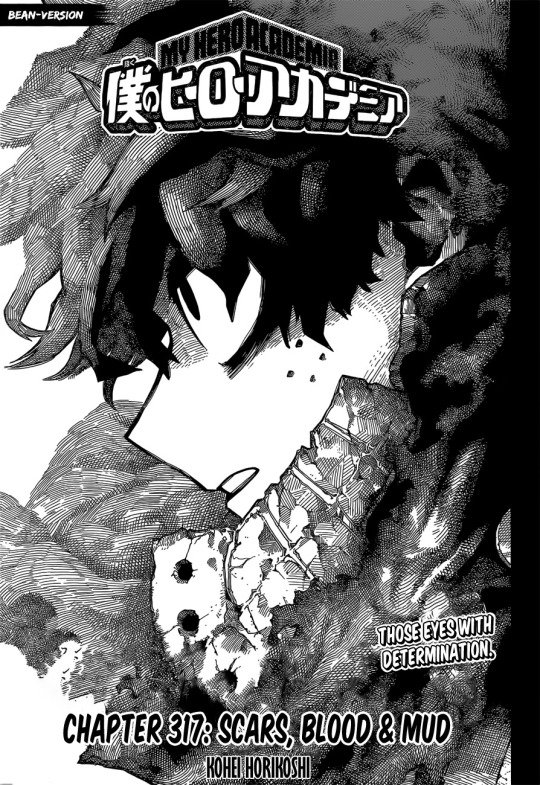
this literally doesn’t even look like Deku anymore?? this looks like Dark!Deku who shows up to fight you in that one room in the Water Temple. he looks like he’s about to crawl out of my television set and murder me with his psychic powers good lord
holy shit lmao Horikoshi is really just shrugging his shoulders and resolving last week’s cliffhanger with a single line of dialogue
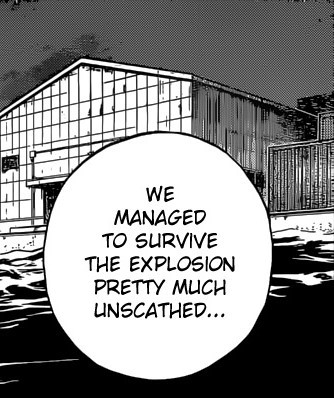
fire is no one’s weakness. idk what other options you’ve got, AFO, but you’re gonna have to go back to the drawing board. maybe try bees or something. I’m just saying. we’re all expecting fire at this point but nobody is expecting bees
anyway so now they’re all sitting in some warehouse somewhere chatting about it I guess. shoutout to Horikoshi for finally giving my man Edgeshot some more dialogue at long last
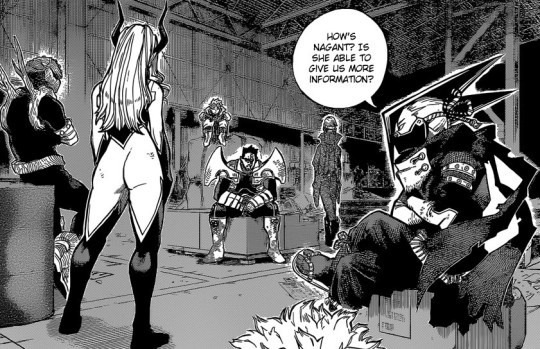
well, Edgeshot, to answer your question, she exploded. so naturally she’s fine
nah just kidding, Hawks says she won’t be able to help them out much because she’s recovering from being exploded. this is the part where we all ignore the fact that Hawks got set on fire for like a full ten minutes back during the War arc and was only in the hospital for a day. anyways enjoy your temporary plot hiatus Nagant
man there’s a lot of dialogue here and I’m trying to figure out where to insert commentary but it’s kinda difficult lol. basically, Edge and the others are saying that they should gather up the other remaining heroes and get them all caught up on the whole OFA situation. which, hmmmm
like on the one hand, these guys definitely aren’t going to cut it on their own, so it’s a reasonable suggestion on the face of it. but on the other hand, do we really want to entrust the OFA secret to a bunch of other people, most of whom shat the bed during the War arc to be quite frank? is it really worth the additional risk? especially given that any one of them might go spilling the beans to the public -- or worse, betray them to AFO??
also just a quick side note here, Mt. Lady’s character development never ceases to delight me. she’s become so committed to her responsibility as a hero these days, and it fucking suits her. I genuinely consider to be one of the elites now. I mean it doesn’t hurt that all the other elites are fucking dead lol but still
wait what? Death Arms retired??
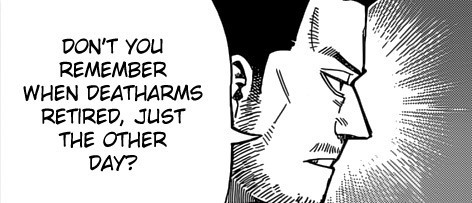
Death Arms as in the guy who was too afraid of a little fire to try and save a terrified 14-year-old kid who was slowly suffocating right before his eyes?? that Death Arms???? color me surprised. shocked, I tell you
...okay but holy fuck
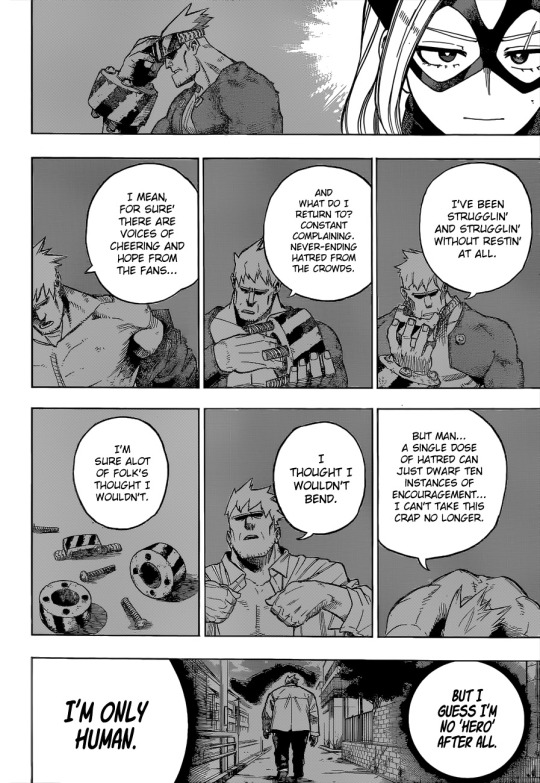
Death Arms. bro. my expectations for you were low but holy shit. like I’m sorry, but I don’t even have it in me to try and pretend like I feel the slightest bit of sympathy for him or Old Man Samurai or any of those other guys today. thanks for a whole lot of nothing my dude. good riddance
(ETA: so I’m rereading this the next day and realize this comes off as kind of harsh, so let me just try to clarify. it’s not the fact that he’s quitting that bothers me, to be honest. it’s the fact that he’s quitting specifically because he feels like the public is being mean to him. that’s it.
seriously. it would be one thing if he was quitting because he was scared, because now that is human. nobody wants to die, and I doubt any amount of training can ever fully prepare someone to go up against that fear. but the thing is, he never once mentions that, or talks about the danger aspect. instead, I got the distinct vibe from this speech that Death Arms is one of those people who only became a hero because of the limelight. and I just don’t have any patience for that. if all you care about are likes and subscribes then go become a fucking youtuber or some shit. nothing wrong with that! but you didn’t; you signed up to be a hero and protect these people. they gave you their respect and admiration because they trusted you to protect them. and now that they’re no longer in the mood to worship and applaud your every move on account of them being scared shitless because they’re living in the literal end times, you decide to dip. so like okay, fine then. don’t let the door hit you on the way out. anyways lol sorry for the rant.)
anyway so yeah. perfect example of why I don’t exactly have a ton of faith in most of the remaining heroes out there lol. also let me just once again give a shoutout to my best girl Mt. Lady whom I suddenly find myself appreciating all the more
“please calm down makeste. drink some water and enjoy this fresh new jeans pun” listen Horikoshi don’t tell me what to do dammit
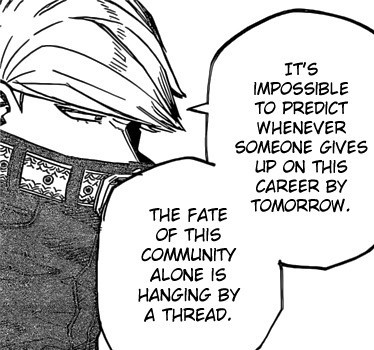
fine. it is a nice pun, I guess
-- damn so now Endeavor’s saying that the media is already being fed info by the retired heroes. so for some of these guys it wasn’t enough for them to abandon all the people they swore to protect and to leave their fellow heroes out in the cold; they decided they might as well actively make things worse for them while they were at it, huh. like I get wanting to spill all the dirty secrets from your old job that you just quit, but this isn’t Jeff Bezos you’re screwing over, this is a sixteen-year-old kid
-- like, yes!! this, right here!!
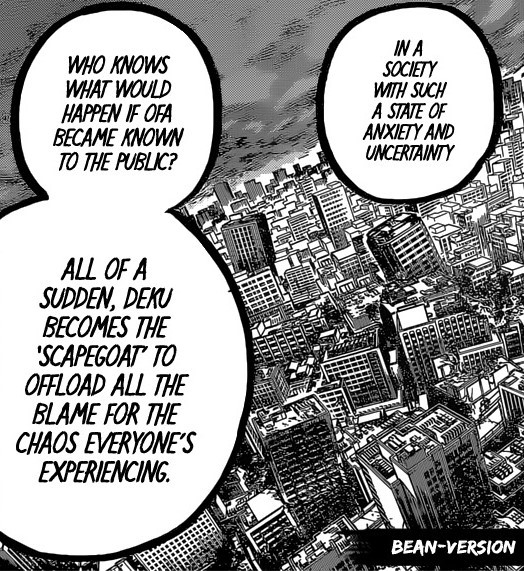
exactly!! let’s not forget that there are already two prior instances of this happening. Endeavor arguably deserved it, but Katsuki not so much
huh. Endeavor seems to have a more optimistic outlook regarding this than I do lol

I mean, this is the same public that didn’t hesitant to blame a kidnapped child for his own kidnapping, and then later on for being the downfall of the Symbol of Peace. but okay then
anyway so blah blah blah, more talk about how they need to use Deku as bait, which basically puts them back at square one, and then they’re all just trailing off into silence and sitting around in the dark lmao this is getting very depressing
SKDJFLSDKJ:LFKJ
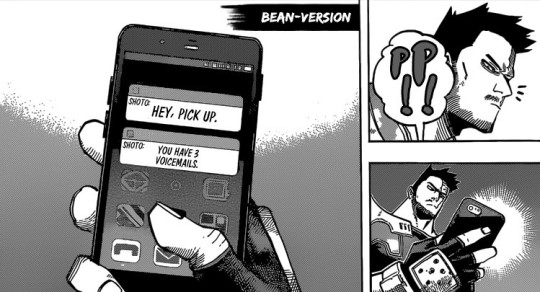
SHOUTO?????
NOOOOOOOO ARE YOU KIDDING ME

OH HOW THE TURNTABLES OMG. THE GHOSTER HAS BECOME THE GHOSTEE. Endeavor you petty son of a bitch. and what a brutal cut to that flashback too. “let’s stop Touya together” nah Shouto I’ve got a better idea why don’t I abandon you in U.A. and sally off with Hawks and Jeanist to found the “let’s pretend like we’re doing something to help Deku” club, which basically consists of us sitting around making terrible decisions all day long
Shouto, honey. you deserve better my little Coca Cola can. .........but if you really do have something important you need to tell your dad you could just text it to him. all the love and support, hugs and kisses, you’re doing amazing sweetie. but if you need to pass on any vital information you can just write it down and hit send honey that’s all I’m saying love
now he’s getting another call?? -- or, no, Hawks is getting a call from All Might
ARE YOU FOR REAL HAWKS OMFG
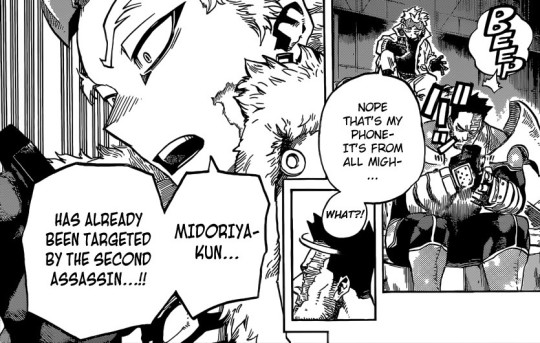
so while you all were sitting around talking about how useless you are, the kid you’re supposed to be protecting was battling another hired gun. I see. please pardon me for one second, I have a phone call to make. the phone call is to RockLockRock and Manual. the reason for the call is to apologize for calling them the worst bodyguards ever back during the War arc. the reason for the apology is because it turns out I WAS SEVERELY MISTAKEN OMFG
JESUS CHRIST DEKU DID YOU JUST KILL THIS MAN LMAO
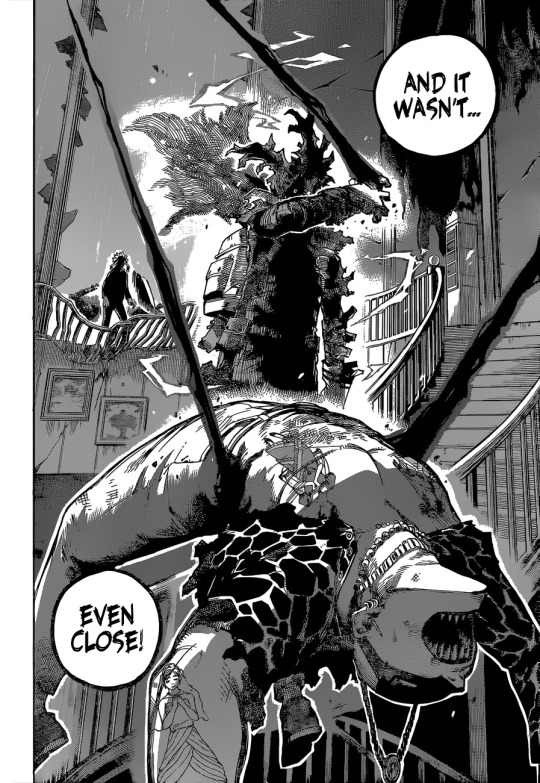
shoutout to Horikoshi for offscreening this fight. we get it, lol. Deku strong and scary, villains ineffectual and feeble, and AFO... [checks notes] yep, still a dick. the angst arc continues
-- the angst arc continues, SIR
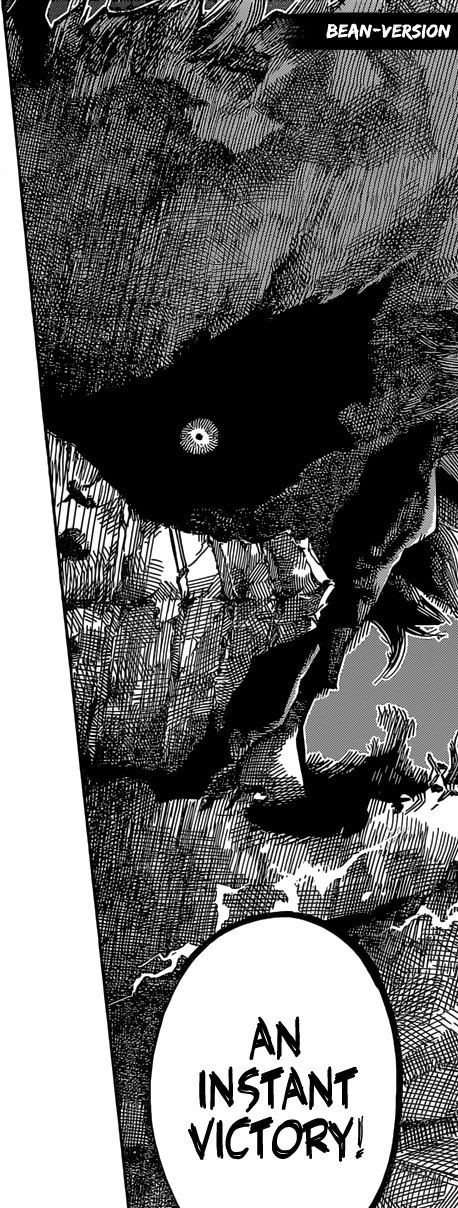
jesus christ I may have to rethink all of my opinions about Deku being framed for murder in movie 3 lmao. never mind. he did it, your honor
holy fucking shit Deku. “he might blow up, so please be careful” fdlskjflk jlskdjflk lwkejflk anyway so I’ve decided the explosion running gag can stay, actually
DEKU WAIT YOU FORGOT YOUR LUNCH!!
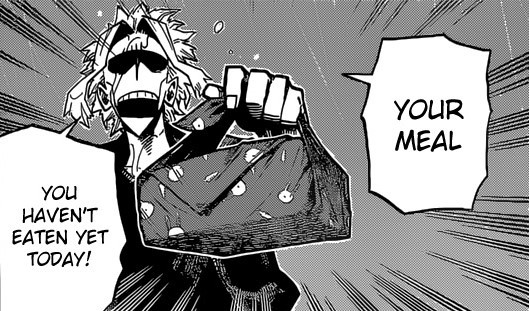
lol why do I get the feeling some serious shit is about to go down. ALL MIGHT NEVER MIND BACK OFF I THINK HE NEEDS HIS SPACE
OH MY FUCK I GASPED OUT LOUD
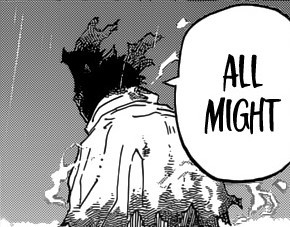
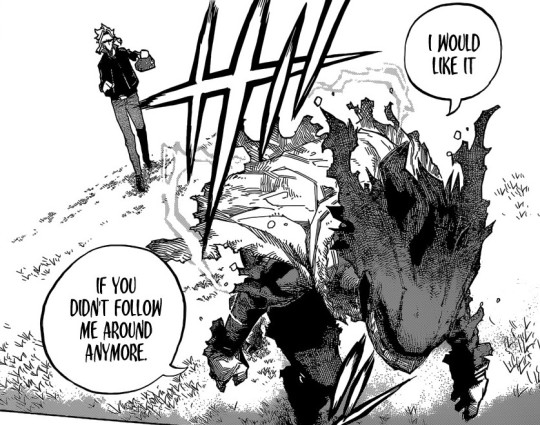
NO NO NO. I KNEW THIS WAS COMING GODDAMMIT BUT NO. NEVER MIND, I CHANGED MY MIND ABOUT IT, I’M NOT READY TO CRY TODAY
shit. shit shit shit shit and OF COURSE all I can fucking think about is that stupid fucking prophecy and gahhhhhhhhhhhhhhhhhhhhh
Deku please. please please please if you really are going to leave All Might here, please be so very careful in choosing your farewell words to him now because have this sudden horrible fear that this might be the last time you ever see him alive and oh god. oh god oh god
DEKU NO, YOU’RE REALLY NOT!?!?


I HAVE NEVER SEEN ANYONE LESS FINE IN MY LIFE, ACTUALLY????
holy shit. and the fucking callback to the prophecy now. just in case we forgot. WHICH FYI, WE DIDN’T. but that’s basically confirming that this is all still very much on the table and HORIKOSHI NEVER FORGETS oh my god someone please hold me
and the fact that Deku’s flashing back to it now too, though?? because he never forgot either, because of course he didn’t, and now all this stuff is happening, and AFO’s words are getting to him, and this is literally his worst fear come to life and so of course he’s distancing himself from everyone, and now it’s finally come to even this. even the person he admires most
-- OKAY NO, FUCKING COME ON ALREADY I CAN’T TAKE THIS
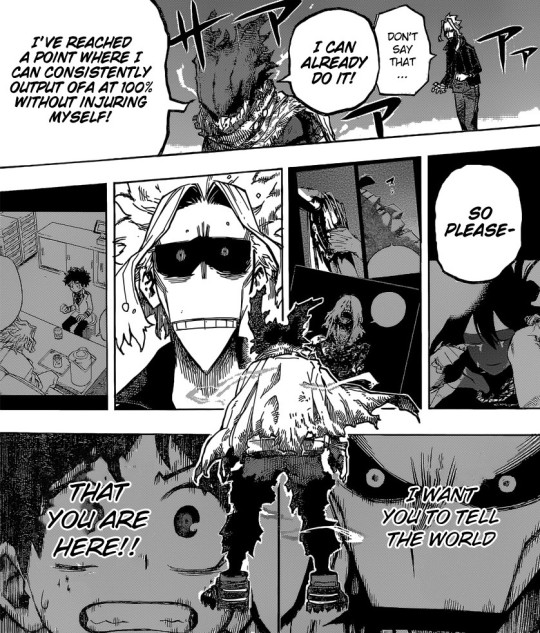
I GET IT OH MY GOD, I ALREADY UNDERSTAND THE EMOTIONAL IMPACT OF THIS MOMENT WITHOUT ALL OF THE DEVASTATING FLASHBACKS THANK YOU SO VERY MUCH!! YOU ACTUALLY DO WANT ME TO CRY, HUH, IS THAT IT. THIS MAN THAT HE THINKS OF AS A FATHER, THIS MAN WHO HAS BEEN EVERYTHING TO HIM SINCE HE WAS A VERY YOUNG CHILD. EVERYTHING THEY’VE BEEN THROUGH, JUXTAPOSED AGAINST EVERYTHING DEKU IS UP AGAINST, EVERYTHING THAT’S AT RISK. LET’S JUST PUT IT ALL SIDE BY SIDE. LET’S JUST PILE ON ALL OF THE FEELS
(ETA: just a quick note that even though some of the posts I’ve read have described these as All Might’s flashbacks, I’m pretty sure they are Deku’s. most of these are scenes that only he was there for, so yeah. even though All Might is the one thinking the thoughts on the next page, the flashbacks are what’s running through Deku’s mind right now, and so we’re getting that emotion from both of them, which makes it extra devastating lol.)
wait, what???
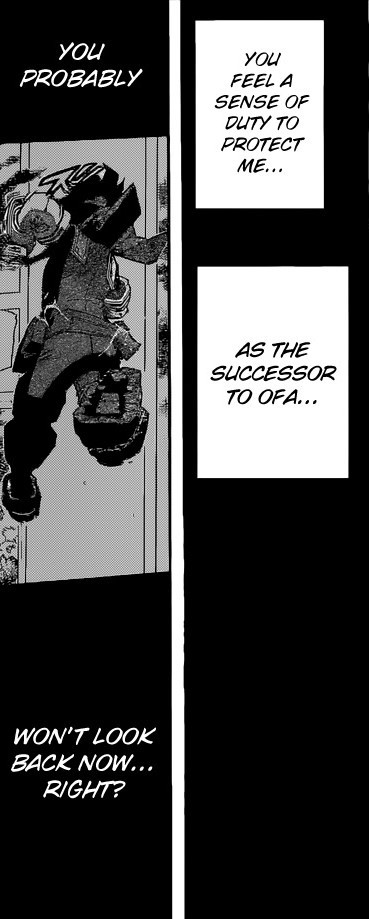
WHAT??? do you really think that’s why he’s been so determined to protect you this entire time?? simply because you’re his successor?
-- oh no wait lol I think I got that mixed up, this is All Might saying that Deku feels the need to protect him. well that makes more sense lol
oh my god I cannot
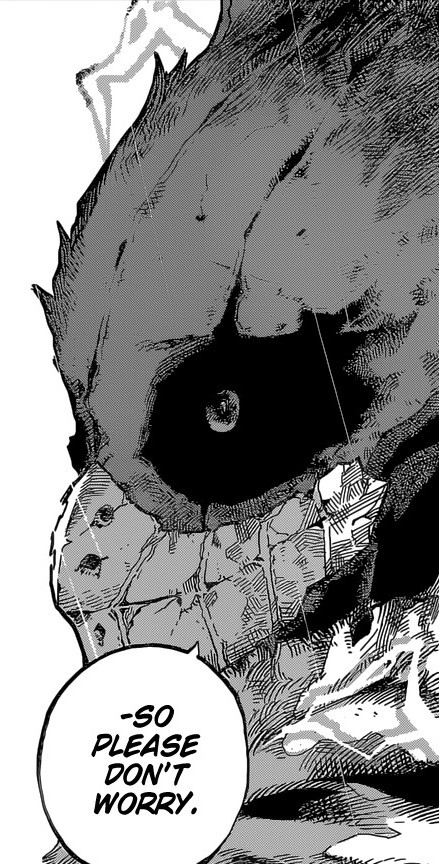
his last words. his last words to him. and we can’t even see if he is smiling, like All Might always encouraged him to do. but what are the odds he can’t actually bring himself to do it. what are the odds he’s actually crying. oh god this scene is going to rip my heart out and STOMP on it in the anime isn’t it. Deku’s VA is going to full on murder me with emotion. not that there’ll be much of me left to murder after the thorough job that Horikoshi has already done here
YOU’RE CRYING. DEKU IS LEAVING ALL MIGHT AND IGNORING HIS OUTSTRETCHED HAND AND YOU’RE CRYING. AND BY “YOU” I MEAN “ME”, FUCK
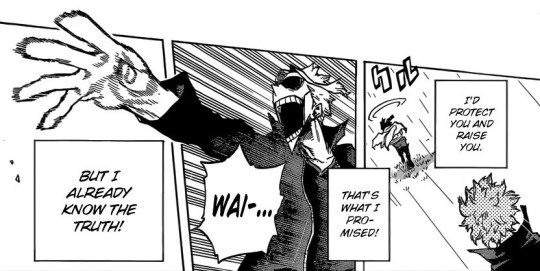
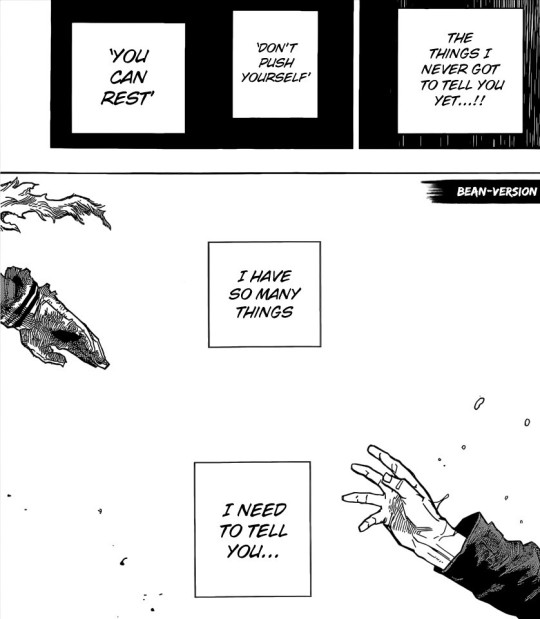
nope nope nope nope nope nope nope nope nope no words just feels just a big ol’ pile of feels. I do not have the strength. future me... [broadly gestures] good luck with all that
(ETA: LOL, WELL THEN.
what breaks my heart here is All Might. All Might, and everything he’s been through, and history repeating itself, and forcing him to live this moment from both sides because he wasn’t strong enough to fix things.
Toshinori had only just turned eighteen when Nana died. like, I feel like we don’t mention this enough. the All Might we know is a sixty-something-year-old man, and so everyone always talks about him like he’s basically been an adult forever. but he was a child when he met Nana. and he was still just a child when she died. barely a year older than Deku is now. younger than Mirio was when we first met him.
and we don’t talk about that. we don’t talk about how devastating that was for him. and we don’t talk about how the reason he grew up to become so reserved and withdrawn -- for all that he always tried so hard to outwardly project the image of a bold, confident, smiling hero -- was specifically because of what AFO did to him. because AFO targeted him in the exact way that he is now targeting Deku. because that’s what he does. he goes after every new user of OFA, and he finds out what’s most important to them, and then he destroys it. and for Toshinori, that was Nana. if you’ve read All Might Rising, you know that AFO basically killed her in front of him (and only killed her, while letting Toshinori and Gran get away). Toshinori (while crying) later says she was like a mother to him. and interestingly enough, during this same conversation, Gran tells Toshinori that he can see “that madness in [his] eyes” when Toshi talks about becoming strong enough to defeat AFO. madness in his eyes. sound familiar??
what’s happening to Deku now is the exact same thing that happened to Toshinori when he was a boy. AFO tried every bit as hard to break him as he’s trying with Deku now. “the path you’ve chosen is a thorny one. every battle grinds away at your soul with no end in sight.” we don’t talk about how Toshinori experienced this same thing for forty fucking years. and all the while isolating himself, exactly like Deku is doing now. pushing people away, exactly like Deku. because he never had anyone who was able to reach out and pull him back. and those words that he now finds himself frozen and unable to speak -- “don’t push yourself”; “you can rest” -- are the same words that no one ever said to him until decades later, when it was already far too late to make any difference.
everything that Deku is experiencing now is what Toshinori also went through. and it’s only now, as he watches it happen to his student, the boy he loves like a son, that he’s finally starting to realize the full extent of how wrong it was. you shouldn’t have to fight alone. you shouldn’t have to bear that kind of enormous burden alone. you shouldn’t have to push yourself, and you can rest. you can rest.
but it’s too late. just as he’s finally coming to understand it all, it’s all too fucking late. and he can’t say the words, he doesn’t know how to say the words, and then just like that, Deku is gone.
and he’s alone. again.)

I can’t. this can’t be their goodbye. I’m not ready. for this to be how they finally part, and then they never see each other again except in OFA. how is that fair. how is that fair. how is that fair
fuck me. lol. how many pages are left in this thing. let’s just wrap this up lol. so now of all the times for this fucking guy to finally show up

I can’t believe Stain has been here literally this entire time hiding behind this random wall and cutting onions. that was you who was cutting the onions, right. no need to answer that we’ll just say it was
HORIKOSHI JUST END THE CHAPTER PLEASE I’M OUT OF SPOONS. YOU HURT ME SO GOOD AND I LOVE YOU FOR IT BUT YOU NEED TO LET ME GO NOW SO I CAN BEGIN THE PROCESS OF TRYING TO PUT MY LIFE BACK IN ORDER HERE. SO WHERE ARE WE CUTTING TO NOW WHAT IS HAPPENING
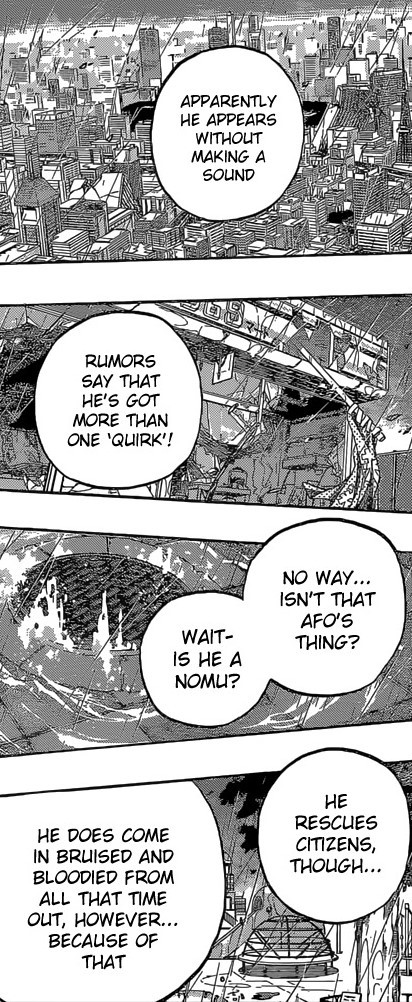
Stain did you also let AFO give you a new quirk. what’s with you guys. do you like blowing up
oh nvm lol because they were talking about THIS GUY ohhhhhh my fucking god
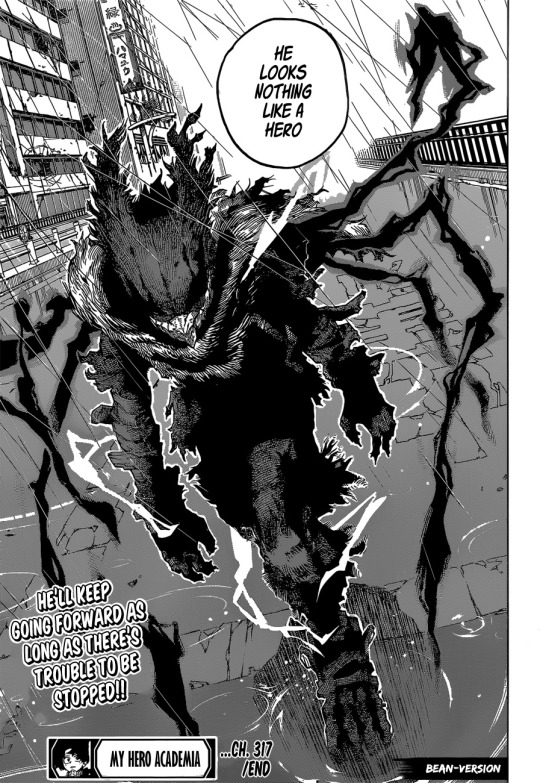
THAT’S BECAUSE HE’S SAD, LINDA!! jesus
omfg. and so yes, good, the chapter is ending here now on page 15. for once I am FULLY on board with that lmao
anyway so tune in next week for more adventures of Werewolf Deku!! that is, assuming we don’t finally cut back to U.A. at long last, which is actually a strong possibility considering that this chapter will likely mark the end of volume 31. it sure wouldn’t kill Horikoshi to start giving us some hope after everything he’s just put us through lol. KACCHAN COME GET YA BOY
#bnha 317#all might#midoriya izuku#and endeavor and hawks and mt. lady and all the rest of them I guess#literally forgot all about them by the end lol#bnha#boku no hero academia#bnha meta#bnha spoilers#mha spoilers#bnha manga spoilers#makeste reads bnha#this wound up so long lmao I'm so sorry
370 notes
·
View notes
Text
Sometimes you just have a really intense week and can’t stop thinking about how much trauma Lan Sizhui experienced by the time he was 5 and how being the Very Best Boy isn’t always healthy and then you need to write Lan Wangji the child psychologist and his incredibly anxious foster-son, y’know?
---
Bunny is on time-out again.
"You have to behave,” A-Yuan says in the voice of the potato-head, packing accessories into its body and shoving it into the bed of a soft plastic truck. “You get in the car now.” The Barbie van is already full, with a dinosaur and a fingerpuppet and one of the new larger Lego figures, and all their carefully packed luggage. A-Yuan does that. Over and over again, for each of his toys, he methodically packs and unpacks luggage. It’s his most common form of play, but not the most enjoyable.
A-Yuan’s breathing is rapid and shallow, so much so that he takes little gasps when he talks to himself. Routinely, predictably, he’s calmer when he turns away from the dollhouse. He’s most collected when selecting items to put into luggage, deciding on pieces of felt and Barbie shoes, but even with the vehicles he can lose himself enjoying the movement and progress of the cars. But underneath it all, there’s a jerkiness to his movements and a certain disconnected quality in his speech and body language that tells Lan Wangji that he’s pretty distressed.
It’s a step forward that Bunny is out at all, Lan Wangji knows. A behaviour therapist at A-Yuan’s last preschool made it a point to extinguish comfort-seeking behaviour towards the toy, which was becoming both careworn and grubby. A-Yuan’s had it at least since he was fourteen months old; it was with him when he came into care. Maybe his birth mother gave it to him. A-Yuan has obediently derogated the toy; if it’s left lying out, he can usually be trusted to throw it into a corner to prove what a big, grown-up boy he is.
Lan Wangji has very carefully gauged his son’s limits of tolerance for some things. When the car ride begins, he waves slightly and says, “Have a nice trip,” which makes A-Yuan glance back at him nervously, but it’s just mild enough, just unemotional enough, just tolerable enough, that it doesn’t provoke too much emotion. A-Yuan can keep pushing his vehicles around, and feel safe enough to drive one into Lan Wangji’s foot. He doesn’t persevere at that point, though; the trip has culminated and he gets up and walks to where he can see down the hallway to the front door, then wanders over to the slide.
A hundred million years ago, Lan Wangji thought he’d be a genetics researcher, like his uncle. Then he thought he’d be a neuroscientist, like his undergraduate thesis advisor. Then he thought he’d be a psychologist like his brother, who focuses entirely on assessment and the development of psychometric tools. For a little bit in grad school, he thought he’d counsel adults, like Wei Wuxian, until a classmate told Wei Wuxian that Dialectical Behavioural Therapy was “objectively badass” and he developed a fixation Lan Wangji could not follow. In retrospect his career path is absolutely obvious, resonating clearly through every bone of him, but it took him a very long time to realize he ought to work with children. It’s a little shocking that he, who was so bad at being a child, feels so prepared to be a father.
He smiles when A-Yuan looks at him anxiously from the slide, the moment of uncertainty as he lets go and begins sliding down triggering the need for reassurance. Lan Wangji is always waiting for that glance, waiting to return it. At A-Yuan’s last placement he’d been assessed as having an avoidant/dismissing attachment style, and despite its uncharitable and parent-shaming nature Lan Wangji can’t help but agree with what his husband had muttered over that one: “Were the parents even trying?”
The most vital task, and the hardest, is being present in the moment with a child. Not worrying about the future, not concerned with the past, not preoccupied with an external standard. He’s surprisingly bad at performing objective assessments with children, because he can see how unfair they all are. His greatest facility is something he built for himself, brick by painstaking brick: the willingness to sit with discomfort, and have faith that the chaos will not remain chaos. All his years of meditation have cultivated a still eye to see the world from, and the faith that patience and compassion will see him through.
Still smiling, still watching A-Yuan, Lan Wangji moves closer to the dollhouse. He carefully stars arranging its contents, righting knocked-over furniture and returning blankets to little wooden beds. He takes out a shark figurine, a couple of doll clothes, then puts Bunny on the floor near his shin. When A-Yuan comes close, magnetically drawn away from the slide, Lan Wangji reaches behind himself for the tea set they were using earlier, arranging cups and plates in front of him as though they’re going to have another tea party. He leaves the placement of the cups ambiguous; it’s not like Bunny is specifically invited, but there is a suggestive proximity, the way the other cup is in proximity to the shark. A-Yuan takes the teapot, and Lan Wangji solemnly holds his cup out while A-Yuan pours. For the sake of the ritual he accepts milk and refuses sugar and mimes stirring his invisible ingredients before taking a sip.
When A-Yuan is done drinking, Lan Wangji turns to Bunny, lifting a cup, and asks, “Would you like some tea?” A-Yuan noticed the moment that Lan Wangji’s hand moves, but as he addresses the rabbit A-Yuan seems to lose interest, which is to say, he slightly dissociates; blink and you missed it, but his eyes go a little glassy, he looks away, and then he acts on the adrenaline and gets up and wanders away.
The current theory about Bunny is like the theory of gravity, which is to say, it’s definitely pretty certain but it never hurts to be humble when it comes to knowledge. It’s honestly a little more speculative and psychodynamic than Lan Wangji is truly comfortable with, and A-Yuan’s case manager, possibly a little defensive over the last preschool placement, absolutely refuses to consider the possibility. But it still feels as essential and true as which way is up that Bunny performs the vital task of holding all the parts of A-Yuan that he blames for making the adults he cares about disappear. Bunny holds both the neediness and the hope for comfort that were so painful, his son shut them down in order to survive. Bunny was how A-Yuan mediated that desire, the source of his comfort, until he was three and a half, and the behaviour therapist.
A-Yuan knew his foster parents didn’t like him being disorganized and distressed and clingy, that they’d rather he behaved more like a six-year-old than four. Which he could, sometimes, because he had a ferocious intelligence which put him cognitively ahead of his emotional development. But he, well... adapted a little too quickly, one might say. Learned his lesson a little too well. Now they’re trying to reignite the behaviours that were extinguished.
Lan Wangji takes a risk, while A-Yuan is pulling picture books off the lower shelf, and lifts Bunny to his shoulder like a colicky infant. He doesn’t do anything else, aside from stroking the rabbit’s fur. He leaves it in place, with a little guiding help from his hand, when A-Yuan brings a Franklin book over and climbs into his lap, demanding to be read to. With interest he notes, halfway through the story, that Lan Wangji holding and petting Bunny doesn’t distress A-Yuan; as the story arc gets as exciting as Franklin books ever do (which is not, to be clear, a criticism) A-Yuan turns in his arms long enough to distractedly reach up and pet Bunny too, before turning back and trying to grab the book for himself.
Wondering how far he can push this, he keeps Bunny in place on his shoulder when they leave the room to check the clock, and A-Yuan goes to the living-room window to watch the street for Wei Wuxian. He looks curiously when Lan Wangji leans down to dig the remote out between the couch cushions, but easily redirects when Lan Wangji turns on the TV and goes to prepare dinner. Having the show on limits his anxious glances out the window to three or four a minute only, instead of sustained attention followed by a meltdown if he had to wait more than five minutes.
Lan Wangji thinks it would be easier to keep Bunny in place, on his shoulder like a dishtowel, if he had weighted plastic beads in his extremities, or if he was velcroed. He’s wary of changing anything about such a strong comfort object, though, so he just learns to move and stand differently to keep the rabbit from constantly falling off.
A-Yuan greets Wei Wuxian with the kind of terrified delight that looks like general indifference if you don’t know better; he runs over, stands uncertainly within arm’s reach of Wei Wuxian’s legs, and then dodges away before Wei Wuxian can reach down to him. Lan Wangji helpfully muted the show when he heard the door open--it gives A-Yuan the space to sit with his back to the room and self-regulate while the adults say hello.
“New friend?” his husband asks finally, an eyebrow raised.
“Modelling it as appropriate,” Lan Wangji says. “I thought perhaps he could tolerate us demonstrating that it is not discouraged.”
“Nice rabbit, Lan Zhan,” Wei Wuxian says seamlessly, in a voice meant to be heard from the couch. “I like it. Makes me wish I had a rabbit.”
“They are very good friends,” Lan Wangji agrees. “This one is not mine, but he is keeping me company.”
“Nice,” Wei Wuxian agrees. “Maybe whoever you borrowed him from will let him hang out with me sometime.”
Their audience does not comment on this, but they didn’t need him to. Wei Wuxian sets the table while Lan Wangji cooks. A-Yuan’s palate is still pretty limited, so he’s used to making three separate elements of one meal, and can live with cutting up cooked hot dog into little coins so long as he doesn’t have to eat them himself. They just supplement their kid’s diet with a multivitamin.
A-Yuan looks askance enough, when dinner is ready, that Lan Wangji takes Bunny off his shoulder and asks, “Where should he sit while we eat?”
There is a fourth chair, albeit completely out of proportion, but he doesn’t dare try it. Instead A-Yuan thinks for a minute, and points to the kitchen counter behind the table. Lan Wangji props Bunny up against the wall, observing dinner if not participating, and after a second to think, A-Yuan accepts this as normal and climbs into his chair. He is meticulously well-behaved.
Lan Wangji aches for his son, and hopes one day he’ll feel confident enough in their love to break the rules around them.
They eat.
#the untamed#my stuff#lan wangji#lan sizhui#AU where everybody's a therapist#the colleague from grad school lan wangji consults most with is nie huisang the family therapist#never saw that coming
268 notes
·
View notes
Note
I love your filling in of the moonflower scene. Just the tenderness of it all 🥺
Do you think you might write a short piece about Dani finding the first grey in Jamie‘s hair in the future? Every time I see the gifsets of Jamie‘s (very sexy) grey strands I have to think about Dani‘s possible reaction
Jamie doesn’t tend to notice these things--little changes in her own appearance, little alterations made by the simple passage of time. Her attention, she scoffs when Dani laughs over her failing to pick up on a burr caught in her hair after a trip to the park, is better suited to other things. “World’s big,” she says, tilting her head to allow Dani to comb the remnants of whatever tree she’d walked beneath from her curls. “Why should I go wasting time starin’ at my own damn face?”
“Because it’s a good face,” Dani tells her. She doesn’t add that Jamie’s face, like everything about her, makes more sense than the rest of the world. That nothing about Jamie seems to come out of nowhere--every scrape and scar is accounted for with a story, every wrinkle turned out from the edge of her lips or around her eyes sparked by the familiarity of her frown, the inevitability of her smile. Everything about Jamie can be traced back to the honesty of time spent in the sun, or injuries incurred at work, or letting another year stroke its fingers across her skin.
She notices the first gray hair maybe five years in. They’re on a camping trip, small tent pitched just upshore of a gently lapping brook; Jamie, crouched beside the water to inspect a turtle, looks up with a grin, and Dani notes a flash of silver at the crown of her head.
She doesn’t point it out. It’s too easy to anticipate Jamie’s amused drawl: “Got a gorgeous beast right here, and you’re worried about my hair?” She tucks the knowledge safely away, entertained by the idea that Jamie is carrying a secret upon her own head and has no idea.
She says nothing, but her fingers seek out the unexpected silver the next time Jamie comes close enough. She trails her hand through rumpled hair, watching the familiar warmth of brown cascade across her skin, pleased to find several more bursts of light wound in among the dark.
“What?” Jamie asks, smile crooking the way it always does when she senses Dani is about to poke fun. “Bein’ a weirdo again.”
“Am not,” Dani replies, and kisses her.
It becomes a bit of a private game, an amusing turn of events: Jamie, the most naturally-observant human being in the world, has absolutely no idea she’s shot through with unexpected arcs of silver. No idea at all. At first, Dani thinks she’s intentionally ignoring the color leaching out of her hair; a flash of memory spirals back, Judy plucking what she called my little secret out by the strand and holding a finger to her lips as she reached for a box of red dye. Heavy maintenance is very much not Jamie’s speed, but maybe turning her cheek and feigning ignorance achieves the same goal.
A month goes by. A year. They’re turning up on their own time, these pops of colorless strands standing stark against dark waves, and Dani takes it upon herself to brush her fingers across each one she finds. She likes very much the depth they bring to Jamie’s hair, the way the sun catches a little differently when she turns her head. Likes the knowledge that each strand is a stamp of memory--proof of time spent.
Likes, most of all, that Jamie legitimately seems to have no idea. Jamie, who tugs a black elastic band off her wrist with her teeth, raking the messy tumble out of her eyes, perpetually annoyed with the curls that always seem to evade her hands. Jamie, who spends hours with a book in one hand and Dani’s hair sifting through her fingers, and still has absolutely no clue what’s happening on her own head.
“You’ve never cared, have you?” Dani asks one afternoon, watching Jamie sort through their spectacular collection of cassette tapes, little plastic cases clicking comfortably to break up the quiet. Jamie, cross-legged on the living room rug with Survivor’s Vital Signs in one hand and REO Speedwagon’s Hi Infidelity in the other, raises her eyebrows.
“Seemed silly to go alphabetical while they were multiplying like fuckin’ bunnies, but now we’ve slowed down a little--”
“About looks,” Dani corrects. She’s hanging half off the couch, the tips of her fingers brushing Jamie’s knee. Life has been getting less predictable lately, messier around the edges; she looks into mirrors with breath held tight in her lungs, uncertain of what will look back. Touching Jamie has become less about habit and more a matter of lifeline. “You’ve never cared about how you look. Maybe the only woman I’ve ever known to say that.”
“I care,” Jamie says, with very little defensiveness. It is astonishing sometimes, looking back at the woman she’d met in that manor kitchen, how little defense Jamie seems to have for her these days. Questions are met in good faith, answered in kind, like Jamie knows there’s nothing Dani could ask that would intentionally bear teeth. “Care when I need to.”
“Like when?”
“At the shop,” Jamie says, tossing aside a Paul Simon cassette with a wrinkle of her nose. She finds Pat Benatar instead, sets it in the pile between The Beatles and Blondie. “Always look professional, don’t I?”
“But you don’t like--think about it? What you’ll look like in twenty years? Or fifty?”
“Fifty, Christ.” Jamie rolls back her head, grinning. “Be a hell of a thing, stacking fifty more years on. What d’you think you’ll look like in fifty years, mm?”
Dani doesn’t answer. It’s too early to tell what the smudged face in the mirror might mean--too early to panic--but the idea of fifty years more with Jamie seems terrifyingly unlikely.
“Anyway.” Seeming to sense her unease, Jamie rocks up onto her knees, awkwardly shifting across the rug to lean against the couch. She braces a hand behind Dani’s head, her eyebrow arched. “You tryin’ to say I don’t pay enough attention to my looks? I don’t scrub up enough for you, is that it?”
Her fingers brush Dani’s ribs, digging in just hard enough to tickle. Dani squirms, laughter burbling out against Jamie’s neck.
She doesn’t bring it up again, preferring the secret of Jamie’s slowly graying hair held within her own heart. The threads are becoming more insistent as the years drift by, joining tiny lines etched into Jamie’s skin. Her hands, put through so much work, are comfortably worn at knuckle and fingertip. Her smile pulls the skin around her eyes a little tighter as they celebrate eight years--nine--ten.
She looks good with the extra age, Dani thinks. She wears it all so well, without pausing to prod at herself in the bathroom mirror; if she’s the least bit unnerved by the passage of time, she never lets it show. If Dani didn’t know better, she’d think Jamie never really looks at herself in the mirror at all.
Too busy looking at me, she thinks, and tries not to ache at the idea that Jamie has forgotten herself beneath the need to keep her attention on what she considers more important things. Like watching for one of Dani’s moods to spike up in public. Like waiting for Dani’s shoulders to hunch against ghosts only she can see.
Dani doesn’t look into mirrors herself much these days, either--though, every once in a while, a glimpse will sneak up. Just the barest flash of her own face in the passenger mirror of the car, or the idling bathwater. Sometimes--less and less often--the face waiting is even her own.
It is so her own, those days, that Dani finds herself embracing a new concern. Something odd, something she’s only started to really see in recent memory.
Jamie is starting to show her age, little by little. Not all at once, not in any way that is strange for a woman creeping into her forties--but the years are there, certainly, stamped gently into her skin. The years are threaded through her hair, these silver pops around which Dani’s hands seem to take on a mind of their own. There’s something wonderful, lively, even sexy about the way time is impacting Jamie--grounding her a little more every year, the natural wearing of all those hours hung like medals around her shoulders.
Dani, catching sight of herself in the bathtub, can’t help but notice: no one could say the same for her. Not that time is beating away at her, not that time is turning her to stone before she’s ready--but that time appears to be doing nothing at all. Her eyes bear no extra marks, though she has spent just as much time as Jamie laughing, frowning, holding her breath as the world spins beneath her. Her hands look just the same as they had in 1987.
Her hair is still stubbornly gold.
“Do you think it’s strange?” she whispers one night--not entirely sure if Jamie is even awake, not sure she can even bear the answer Jamie might give.
“What is?”
She swallows hard, fingers carding gently through Jamie’s hair. The gray seems to gleam in the glow of the streetlamp through their window.
“That I’m not...that I don’t look...”
Jamie pushes onto one elbow, peering at her in the dark. “You look like you,” she says, when Dani is unable to press on. “You look like Dani.”
She’s trying to answer the other question, Dani understands, the one being asked with greater frequency: am I here? am I me? what if I’m her, deep down, and have been all along? She shakes her head.
“That’s not...I’m not...”
Jamie waits, brow knit the way it always has when she’s listening. Even when her expression smooths out into sleep, that small divot will remain, etched into her skin like a tattoo memorializing all these late-night conversations. Dani reaches up, presses her thumb gently to it now, her breath hitching when Jamie turns to kiss her palm.
“It’s nothing,” she says. There’s no way to explain it without making Jamie worry more, worry again, lose yet more sleep watching for signs Dani is slipping away.
Jamie nods slowly, not quite believing, not quite daring to call out the lie. “All right,” she says, and the silver in her hair seems to burn, and Dani loves her enough to close her eyes and pretend everything is okay.
When morning comes, she wards off the thoughts. It’s easier, in daylight. Easier to turn her head, fix her eyes on Jamie, allow the familiarity of Jamie’s hands, smile, kiss sweep the fear back under the bed. The nights are long, the dark heavier than it has any right to be, but in sunlight, Jamie shines. The chain around her neck--the colors in her eyes--the silver shot through her hair. In sunshine, Jamie is the most alive any person can be.
And if she is, so must Dani be--because there is so much love in the way Jamie tips into her arms, so much affection in the sweep of her kiss, in the way she leads them around the kitchen in an impromptu waltz. Jamie, as always, burning away the shadows.
Jamie, who dips her backward, drinking in her laughter with the biggest grin in the world. Who cuts her eyes to the right. Who tightens her mouth in surprise.
“Hang on,” she says, her hands still braced at Dani’s back and hip. “What the fuck is this?”
Dani’s heart gives a giant leap, her hands clutching at Jamie’s shirt for balance. This is it, she thinks. She can see her now. She can see her, not me, and it’s over, it’s all over, it’s--
“Dani.” Jamie is frowning, easing her back to her feet. She crouches down, gazing into the window of the oven. One hand rises to her head, her brow furrowed.
She sees her, Dani thinks, backing toward the sink. She sees her, and--
“Jesus, how long has my hair looked like that?”
She blinks, shaking the panic away. “What?”
Jamie is looking at her, almost awestruck, her face clean and younger than usual with the last vestiges of sleep clinging to her eyes. “All that gray. Knew there were one or two, but--”
Dani is laughing. Leaning back against the counter, the mirth spilling out of her, she laughs. Jamie, straightening up with a low groan--her knees pop audibly, her head shaking--looks bewildered.
“Suppose you thought you’d just wait,” she says dryly, “and see if I ever noticed?”
Dani nods, cackling too hard to answer. It’s become so normal, counting the bright bursts amid Jaime’s natural hair color; she’s honestly forgotten Jamie ever didn’t have these silver sparks. Every inch of her, from the crow’s feet etched near her eyes to the tiny scars on her hands, is quite simply home.
Jamie is plainly trying to look grumpy now, her hand tangling her hair. With Dani giggling like this, unable to catch her breath, she isn’t doing a very good job.
“Been this way a while?”
“Years,” Dani giggles. “Since I proposed. Before.”
Jamie rolls her eyes, slouching the two steps it takes to reach the counter and Dani’s shaking frame. “You,” she says in a mock-irritated tone, “are supposed to help with these things.”
“With what?” Dani brushes the hair back from her eyes. “You’re beautiful. And more than that, you’re...stately.”
“Stately,” Jamie repeats with a snort. “Haven’t heard that one. That’s a Hannah word, if ever there was one.”
They sober, just a little, the appropriate affection offered to memory. Jamie’s head bows against her own, her nose brushing Dani’s lightly.
“I like it,” Dani says, her voice soft. “I like watching it happen. Like growing old...”
She trails off. She isn’t growing old, is the thing. Isn’t changing. Is as incontrovertible as a lake set into ancient grounds. She is not growing old at all.
Jamie’s fingers curl around her chin, tipping her head back. “Growing old together,” she says, firmly. Not denial, exactly--just certainty. Jamie, imposing her will on a world that tries so hard to have its own way with them both.
“Growing old together,” Dani repeats, and even if it isn’t true in the strictest sense--even if it doesn’t look like it should--she knows Jamie believes it. Knows Jamie will fight tooth and nail to make the universe bend around her love.
There are things, Jamie believes, that are natural. Organic. Exactly as they should be. There are things that can’t be changed by dreams, whims, magic spells.
They will grow old together. That is, Jamie believes, the way the world works. The way it has always been and will always be. Jamie’s hair grows silver. Jamie’s skin etches with lines. Jamie’s hands are solid in her own, though she sometimes bends her fingers with a grimace, rubs her wrists when the weather angles toward snow.
They will grow old together. For Jamie, there is simply no other consideration to be made.
“I like it,” Dani repeats, fingering the nearest strand of gray. “It’s distinguished.”
Jamie, shaking her head, is grinning as she leans in for a kiss.
#fanfiction#ficlet#the haunting of bly manor#the haunting of bly manor spoilers#dani x jamie#damie#I either post nothing for six days or multiple things at once#no middle ground we write erratically like kings#anyway: Jamie's silver hair is peak!Jamie I will hear no arguments
101 notes
·
View notes
Text
Our 2020 Drama Recs
What a year 2020 has been - a time of tumultuous change, anxiety and reflection. During this time, dramas have certainly become a safe space for comfort and entertainment. Fortunately, we’ve also seen more and more quality dramas released in 2020!
As we head into 2021, here are our top 2020 dramas picks:
1. Winter Begonia 鬓边不是海棠红 recommended by Admin JY

The story of two seemingly polar opposite characters in 1930s China - a feisty traditionally-trained Beijing opera star and a wealthy Western-educated businessman in a setting where Western influence meets Chinese traditions. Yet when they finally cross paths, their parallels in fact draw them closer to each other. The main characters shine and sparkle both as independent characters with their own depth, flaws and quirks and with their ever-so-natural chemistry interacting with each other, in what could be the most healthy and balanced relationship dynamic I have ever seen between leads.
Winter Begonia presents brilliantly written three-dimensional, human yet relatable characters growing with each other through a time in history of change and uncertainty, in addition to great acting, beautiful costume design, production value and showcase of Beijing opera. If you are looking for a show with drama, history/culture, comedy, family, action (and tragedy), look no further than Winter Begonia for an entertaining yet reflective story of growth filled with all the *feels*.
2. A Murderous Affair in Horizon Tower 摩天大楼 recommended by Admin JL
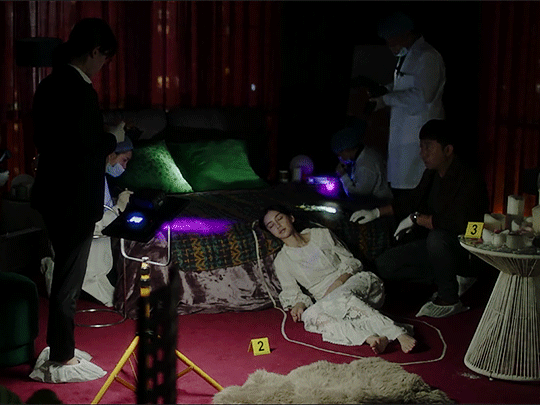
What’s your idea of a feminist drama? An ensemble of badass, confident female cast kicking ass and bonding with each other? For Horizon Tower, it is to be concealed in a mystery. Two detectives take us through the life of an attractive cafe owner after her death, retracing it through the eyes of people new to her and old ones who had known her well. They all have various things to say about her - each have a different piece of the full picture. What part of the truth do we trust? How do we, or can we judge her? While women are often expected to be the “perfect victim”, Horizon Tower says, the simple truth is, a victim is a victim, and a crime is a crime, regardless the conduct of the victim.
Horizon Tower is a sophisticated, brilliantly written and directed story. It’s fast-paced, compelling as it plays with multiple facets of the truth. There is no simple dichotomy - of black vs white, of women vs men. Instead, it fundamentally embraces the complexity of human nature - which is what makes it feminist. For me, this drama will stay in my heart as one of the most powerful and brilliant feminist stories to exist. In a time of feminist movements, it feels extra important and meaningful for China to have produced such a drama this year. Thank you for being the voice we all needed, Horizon Tower!
Watch the official episodes, subbed, on Youtube.
3. Hyena recommended by Admin JY

Not quite simply a law drama, nor a “badass” law drama turned into a sweet romance drama - Hyena is great for its culmination of confident writing featuring strong and unique characters that break stereotypes, balanced with a refreshing focus on morally ambiguous law cases.
Just as much as the focus was placed on the well-paced and exciting stakes in the legal cases featured, the drama always gave space for the characters’ legit explosive chemistry to shine through and be developed further. While KDramas have been attempting to write “badass” female leads, Jang Geum Ja always stayed true to her anti-hero and morally grey character, with her gaudy, loud masculine style, unscrupulousness and shameless ambition to the end - a truly strong and admirable female lead who may not be fully likable. Yoon Hee Jae as the male lead also deserves praise as a more sensitive and softer portrayal of a privileged and powerful male lead, without ever overshadowing others or overstepping his boundaries.
Even as someone who struggles to watch purely-law/detective dramas, there was much to appreciate and enjoy from this drama, with its quality acting, writing and even memorable OST that can only be fully appreciated by watching.
4. The Bad Kids 隐秘的角落 recommended by Admin JL
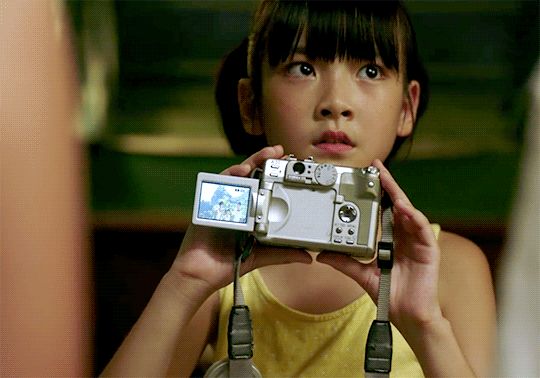
This is China’s year of high quality, sophisticated suspense dramas! Alongside Horizon Tower, The Bad Kids is certainly the one which had first carved out that status. Before it was named one of the Best International TV Series of 2020 by Variety, it had already achieved a phenomenal status in China with plenty of good fun memes and incisive meta created.
The success of The Bad Kids, in my opinion, represents creativity and the heart for storytelling triumphing over rigid, spartan censorship. It’s a testament that witty and thoughtful writing is what you need to tell a good story - and even censorship can’t get in the way of this (sometimes). It told a compelling and introspective story threading into moral fallibility while opening up questions to audience about what we perceive and know. This is a rare accomplishment when so many other recent cdrama stories are increasingly sanitised. The auteur-level of directing was vital in shaping the experience as well, down to the quirky selection of music.
So, do you believe in fairytales or reality? :)
5. Brutally Young 十八年後的終極告白 recommended by Admin JY

How far would you go to hide the secrets from your past to protect your present? - that was the simple but solid foundation that this HK Drama delivered.
A group of high school friends are forced to reunite after 18 years to unravel the mystery of a recently discovered corpse, related to their shared pasts. Through this premise, mystery and suspense unfolds as the characters’ complex motivations and hidden pasts are revealed.
Despite the wide ranging cast, many characters are given good depth and personal arcs for development, and even decent romance feels. The pace of the story is also kept tight and remains consistent and realistic throughout. Definitely an unexpected dark horse from TVB’s 2020 lineup, worth checking out!
6. Candle in the Tomb: The Lost Caverns 鬼吹灯之龙岭迷窟 recommended by Admin JL

Okay, after two heavy suspense dramas from me, is there anything more lighthearted to watch? I’m usually not an action/adventure fan, but I’ve been a fan of the remakes of Candle in the Tomb directed by Fei Zhenxiang along with his team, following after the prequel adaptation last year, The Wrath of Time.
This time, we have Pan Yueming as Hu Bayi, forming the Iron Triangle with Pangzi and Shirley, embarking on a tomb-raiding treasure-hunting adventure. Director Fei makes action digestible and fun to watch, on top of the witty script, great character-writing and performance - true to canon (as far as possible). As far as old fans of the franchise and new ones of the drama know, this is the best remake so far. I’m looking forward to the next instalment, The Worm Valley, likely out early 2021!
Watch the official episodes, subbed, on Youtube.
-
Let us know what your picks for 2020 are!
Written and gifs by Admin JY and Admin JL, unless stated otherwise.
#cdrama#cdramanet#kdrama#winter begonia#a murderous affair in horizon tower#the bad kids#hyena#candle in the tomb the lost caverns#brutally young#hkdrama#drama#鬓边不是海棠红#摩天大楼#隐秘的角落#十八年後的終極告白#鬼吹灯之龙岭迷窟#shoujoinvestigation#sji: recs#sji: year in review#admin: jy#admin: jl#year: 2020
139 notes
·
View notes
Text
[Alright take-two on this damn post. First one got eaten by post editor right as I was ready to post. You see how long this is? Save to drafts, kids.]
I’m here to shove a manga on you: Ookami Shounen Wa Kyou Mo Uso O Kasaneru (The Boy Who Cried Wolf Also Told a Lie Today). It’s a gender bending romance. Despite how awful that probably sounds, it’s actually really fucking good and I do not say that lightly.
(No spoilers, this is all in the first chapter) A high school boy insecure about his intimidating face, Itsuki, has fallen for a shy loner girl, Tokujira, who does not seem specifically phased by his naturally scary face. So he takes a risk and confesses, but she turns him down brutally. Itsuki goes to his sister to lament his insecurities about his face, which he (more or less correctly) attributes as why he can’t make connections. To give him a new perspective on his appearance, his sister (trans btw) gives him a makeover while he’s sleeping and then kicks him to the curb of her salon - fully crossdressed. On his way home, Itsuki (♀) ends up bumping into Tokujira, and she mistakes him for a boyish girl. Under this misunderstanding, she asks "her” for a favor...
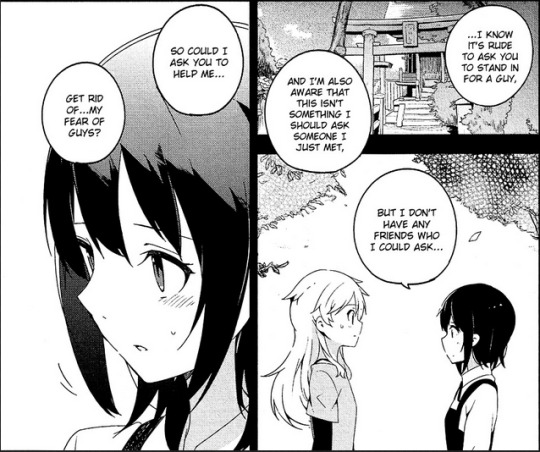
She has androphobia, and she has it bad. So much so she can’t even look at men without snapping violently or becoming physically ill. And Itsuki (♀) is just boyish enough to trigger her, but not enough to lock her down. So she asks for “her” help, to see if she can desensitize herself to her phobia. Itsuki’s in a bind for a couple obvious reasons, not the least being the guilt of deceiving Tokujira. But nonetheless, he genuinely wants to help her. So, he decides to continue crossdressing, diving into a lie that he soon finds he has no easy exit from.
I really recommend this manga. I cannot say that enough times. It is phenomenal, shattering tropes left and right in fun and interesting ways. Do yourself a favor and give this manga a try.
Personal feelings and meta analysis below the cut. It’s, uh, ungodly long, and will get very spoilery. But I will flag spoilers. And there will be pretty pictures?
(Also, no, I did not go into this planning to compare a manga about crossdressing to the abolitionist writings of Frederick Douglass, but reality deserves to be a bit absurd sometimes.)
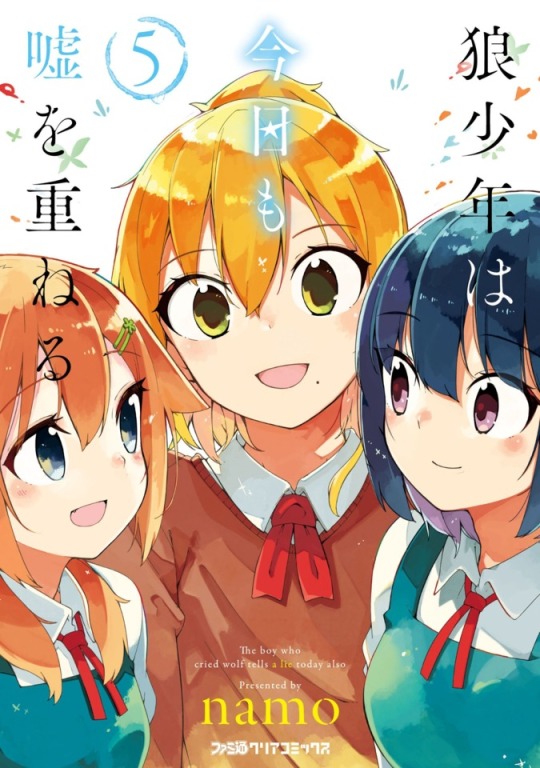
Before you think I’m getting spoilery, with the intro I gave or anything I don’t mark as spoilers, I’m really not. Everything outside of spoilers is right on the package at the start. It sounds like I’m spoiling late-game stuff, right? That’s something that was really fantastic to me: this manga doesn’t spoon feed you. There’s no arcs of pure silent angst, even at the lowest point in the story. These kids are smart, they think and intuit on the spot, and they share what they’re feeling with each other like good friends do. Like that next panel down there with Itsuki introspecting about his confidence level while crossdressing? That’s from the first chapter! These kids are smart. And god damn that is so nice to see.
There was a lot I liked about this manga, but at the top is how compelling the protagonist and his internal conflict are. Right from the first chapter he’s already wracked with guilt about what he’s about to do: deceive this girl by pretending to be a safe space. But Tokujira told Itsuki (♀) she hopes to one day be able to fall in love, and Itsuki wants to ensure she can have that - even if it’s not him that gets to confess to her. He’s fully aware of exactly how fucked up what he’s doing is, and is appropriately beating himself up over it in a really realistic way. But although the guilt never fades, it slowly gains company in happiness. He enjoys this new, fragile life he has constructed around the two precious new friends he's made as a girl.
It was probably easy to gloss over in the synopsis, but arguably the biggest part of Itsuki (♂)’s conflict is his complex about his face. He looks dangerous, and because of that he is afraid to even lift his head or smile in front of others. But as Itsuki (♀), he smiles and laughs without fear. It becomes immediately clear to him on the first day that he's a more confident person while crossdressing. Happier in a way he can't be as a man.

Botan is easily my favorite character in the series. She’s introduced early on, as Tokujira’s first and only friend before Itsuki (♀). At the start she’s a dangerous third wheel, a serious threat to Itsuki’s ability to keep up his lie. And though the situation is (thankfully) defused rather quickly, she becomes a massive source of internal conflict for Itsuki. Nonetheless, she becomes a dear friend for both Itsuki ♂ and ♀. She’s just so...*chef’s kiss*
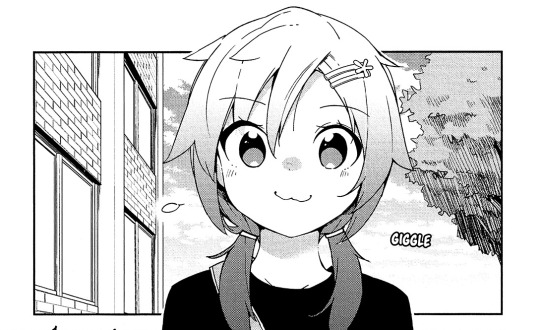
^This face is the repository of all my love and affection.
Mark my words, this is the first and I assume last time I will ever say this: love triangle good. You know it’s inevitable in a romance genre piece, but this manga approaches the trope in a new and compelling way. [Spoiler] Needless to say, it’s between Itsuki, Tokujira, and Botan. But...there’s two Itsukis involved, ♂ and ♀, and in the center of it all is this lie. His lie stops being about him: it's about not hurting these two girls he cares so much about. [/Spoiler]
On a more personal note, I saw so much of myself in Itsuki’s older sister, Ibuki. She runs a salon, catering especially to crossdressers and transwomen. She’s a self-described “Youthling”, an alien from the planet Youth, obsessed with observing the exciting and turbulent lives of the youths of earth. For more or less for the same reasons most of us do: transpeople don’t tend to get the youths we want, if we allow ourselves to experience youth at all. So it’s nice to be able to enjoy it vicariously, through this younger generation that is able to more fearlessly pursue the lives we couldn't.
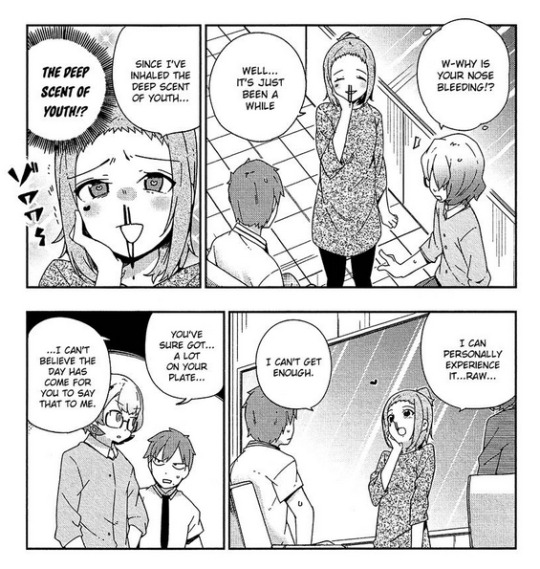
^Incidentally, one of my favorite interactions in the manga.
Despite getting Itsuki into this crossdressing mess, she’s someone he can always return to and confide in, and get good, helpful advice from. Her whole philosophy is to give young people agency to explore their identities and find themselves, and though she tells Itsuki the road he's taking is dangerous as soon as she learns what he's doing, she'll always support him however she can.
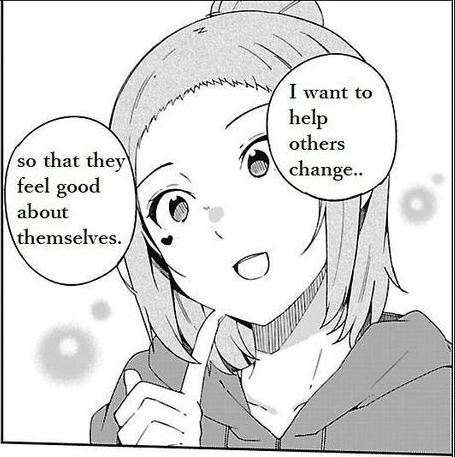
That, I feel, is what separates her from other, more creepy/pedophilic enabler types, like Sawako from K-On! or Lucoa from Dragon Maid. It’s a refreshingly honest and respectful portrayal of a quirky adult just trying to be a good older sister.
The last thing I want to say, and I’m not going to even mark this as a spoiler because of course it’s going to happen and if you can’t predict that then you’re not my problem, is that Itsuki of course eventually has to drop his lie. All I’ll say about it is that it is probably going to live in my head for years. Everything about it, the lead up, the execution, the fallout, and the recovery, are all so masterfully crafted for maximum emotional impact.
That’s all I want to say exclusively about my personal feelings. On to analysis. There will be a lot more contextual spoilers here that, even without reading the parts I’ve specially blocked off will probably leak through. Read at your own risk, but I would recommend revisiting after you have finished the manga.
One thing I really want to talk about is language. That’s right, I’m going to compare a crossdressing manga to The Narrative of the Life of Frederick Douglass, the autobiography of a freed slave turned abolitionist. Douglass talks about a concept that has remained imprinted on my mind ever since I first read it: how and why slaves struggled to comprehend the concept of freedom. This wasn’t anything to do with fear or “racial inferiority” like pro-slavers would argue, but rather with a lack of vocabulary. They have all of these feelings and things they know to be true, but lack the words to make meaningful sense of them. For Douglass specifically, his life completely changed when he learned the word “abolition.” It was like a floodgate burst, as he was suddenly able to put meaning to feeling, create context from chaos.
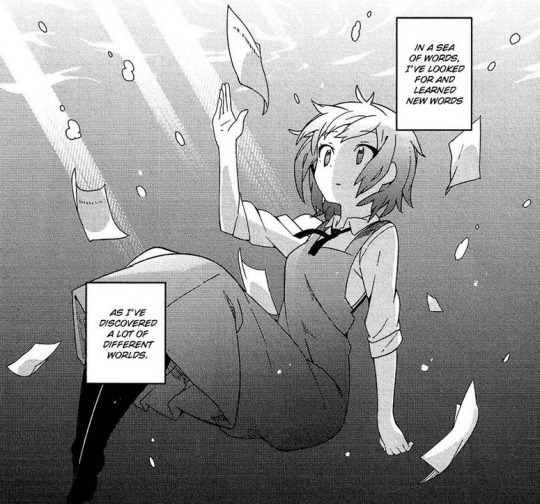

And that’s right, we see that happen in a big way, with Tokujira. This should be an obvious development, but as it happens late in the manga I will mark it [Spoiler]. As Tokujira and Itsuki (♀) practice things like talking, eye contact, holding hands, etc., Tokujira naturally starts to fall for Itsuki (♀). But she doesn’t understand that. An important part of her character is that, growing up, she focused on expanding her vocabulary as much as humanly possible in the hopes of being able to better articulate herself. So words are very important to her. It’s not until she sees a work of lesbian fiction on display that she finally realizes that’s the word she’s looking for. The floodgate bursts, and all of her emotions suddenly make sense. She realizes she loves Itsuki (♀). [/Spoiler]
And I think that is a vital and underexplored concept when discussing LGBT youth, especially in countries where even knowledge of these concepts is taboo. The reason so many LGBT youth struggle with their identities, especially trans youth, is because we do not have the vocabulary to conceptualize our feelings. I am always excited to see this concept play out, especially in this context. It’s such an important thing that needs to be addressed more broadly.
Moving on, I want to talk about historical context of the genre as it relates to what the author did here. Notably, I want to talk about a specific trope rampant in Japanese queer fiction, specifically early lesbian fiction: the idea that queerdom is a meaningless, youthful phase that children will naturally and inevitably grow out of. It’s problematic for obvious reasons.
[HELLA HELLA SPOILERS] My kneejerk reaction to the ending of this manga was that the author fell into this trope. In the end, Itsuki comes to the conclusion that he does not need to crossdress. So again, kneejerk. But...it really wasn’t like that. He never had any dysphoria; crossdressing was always just a necessity of his circumstance. Nonetheless he learned to analyze and value his experience crossdressing as a woman, and because of that grew as a man. And as part of his journey to understand his identity we, through him, see why some people crossdress. Along with his example, we see why his sister, a bona fide post-op transsexual, has made it a permanent change to her life. Likewise, we see Miyama, who crossdresses purely for the gender euphoria, but has no (stated) interest in going all the way. These are all presented as valid and meaningful. [/Spoiler]
Crossdressing, and gender nonconformity in general, is portrayed not as some one-dimensional fetish like cultural taboo would depict it to be, but rather a meaningful exercise for exploring and critically analyzing your own identity. For some, yes, it’s a phase, but an importantly transformative one when done right. While for others, it is a gateway to a new way of experiencing and enjoying life. Or, it’s fun just for the pragmatic reasons...
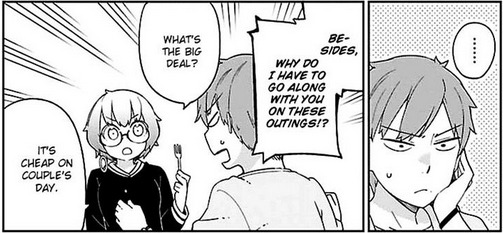
I honestly cannot recommend this manga enough. Tragically, I cannot imagine it ever getting an official english translation, so you’ll have to settle for a scanlation like the one I linked in the title up top (and here, again). It’s a really good translation, though the site is predictably sketchy. Warning for lots of NSFW ads.
Read it, and then come talk to me about it!!! There is basically zero fan community and I need to fangirl with someone!
#long post#and I mean REALLY long post#Ookami Shounen Wa Kyou Mo Uso O Kasaneru#The Boy Who Cried Wolf Also Told a Lie Today#the boy who cried wolf tells a lie today also#analysis
10 notes
·
View notes
Text
Mirror & Misdirection - The Distortions of the Mirror Scene
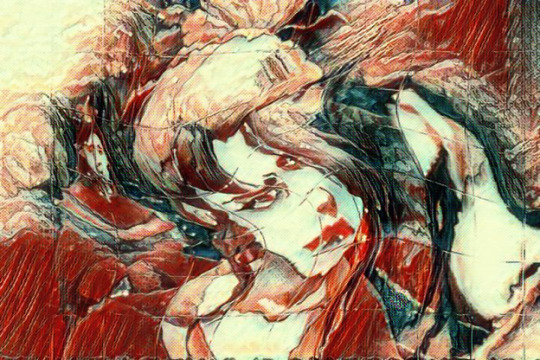
How excessive, myopic emphasis on the Mirror Scene distorted both the fandoms and Brykes’ understanding of Azula, and what the Finale actually says about Avatar’s most controversial villain.
Executive Summary
To understand any fictional character, you have to understand their Goals, Motivations and Conflicts. This applies to Princess Azula from Avatar: The Last Airbender.
Ever since Azula was humanized in the Finale, arguments have raged over whether or not she has the capacity for meaningful growth and change like any other character, or any other human being.
At the core of these arguments has been the infamous Mirror Scene where, while talking to an hallucination of her mother, Azula expresses doubt, regret and tear-stricken grief. As a thoroughly established villain who had never before shown such feelings, this scene was taken as character-defining.
However, the Mirror Scene alone does not reveal all of Azula’s Goals, Motivations, and Conflicts. Instead, the Mirror Scene, when taken by itself, is only a Conflict. As a result, the Mirror Scene has distorted both the fandoms and Brykes’ perception of Azula by assuming she is entirely the work of complex, vague and puzzling psychological phenomena surrounding her mother, versus a variety of well-defined Goals and Motivations.
In actuality, the Finale gives us two other scenes that, combined with the Mirror Scene, give us everything we need to understand Azula’s Goals, Motivations and Conflicts.
In this article, I will provide an alternative explanation of Azula’s character that relates directly to the source material and which does not rely on psychological theory.
First, I will summarize the “Azula Debate” to provide proper context for this subject.
Next, I will explain the character-building concepts of Goal, Motivation and Conflict and why they are especially critical to devising a workable understanding of Azula.
After that, I will explain how the Finale yields Azula’s Goals, Motivations, and Conflicts, and I will provide an alternative explanation of the Mirror Scene as it relates to them.
I will then explain why the fandom incorrectly fixated on the Mirror Scene and how this distorted both the fandoms and Brykes’ understanding of their most controversial villain.
And finally, using these Finale-revealed Goals, Motivations and Conflicts, I will suggest a “path forward” for Azula’s further involvement in the Franchise.
The “Azula Debate”
When the Finale aired in 2008, one of the most striking and controversial developments was the rapid humanization of Azula. For the first time, we saw the fearsome and always-winning Princess scared, paranoid, emotionally fragile and crying. It was a radical shift from our previous image of Avatar’s most hated villain. Nothing like it had yet happened in the Franchise.
The topic of Azula’s newly-revealed humanity was so compelling that even Mike and Bryan were asked about it in the Sozin’s Comet novelization. While their answers were vague and disjointed, the fact they had an affirmative answer shows that Azula’s humanity wasn’t an accident; it was intended.
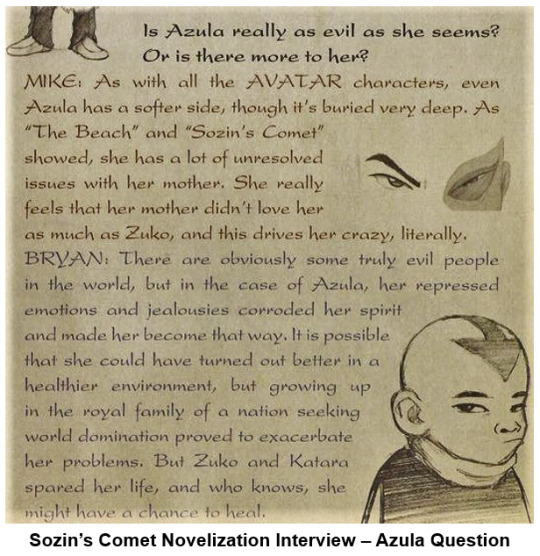
And the fans saw this: they saw an Azula that was more complex than what they had been previously shown, or lead to believe existed.
While Azula’s breakdown in the finale was well-animated, scored and voice acted, and the show wrapped up nicely overall, the Finale created more questions than answers for the Fire Princess, most of which still have not been answered to this day.
What is Ursa and Azula’s relationship? What is Azula’s moral compass? What does she value? What is the extent of her empathy? What lines will she not cross? Why does she use fear to control people? Does she enjoy hurting people? Can she feel love? What does she want in life? Why did she throw bread at turtle ducks? Is she a sociopath? Will she reconcile with Ursa? Is she mentally ill? Will she ever rise from the ashes of her shame and humiliation? What happens to her next?
These were the sorts of questions fans were asking in the aftermath of the Finale, and which fans are still asking.
Unfortunately, the fandom did not approach this topic with unity.
What began after the Finale was an endless back and forth about morality and affective empathy; psychology and personality disorders; juvenile delinquency and abuse dynamics; Dracos in Leather Pants and Freudian Excuses, with one side arguing that there wasn’t anything inside Azula worth exploring, while the other side desperately clung to the hope that there was potential for compelling growth in Azula. You could term the “anti” side the “Azula Haters” and the “pro” side the “Azula Fans”.
The “Azula Fans” are a diverse group that cannot be generalized. In summary, they found Azula compelling for a variety of reasons, they had questions they wanted answered and they desired to see Azula fleshed out fully.
The “Azula Haters” are equally a diverse group and so cannot be generalized. Overall, their motivations are primarily to relate Azula to real-world bullies and abusers, thereby preserving her as a platform to talk about escaping domestic abuse situations and how to give up on toxic family members. Relating Azula to the real-world in this way is not to develop the world of Avatar and its characters, but to express their own anger, cynicism and heartache over what’s occurred in their own and other’s lives, and teach lessons about it.
The key point is this: the purpose of the Azula Debate was not to discover the truth about Azula and determine how to tell a story about her. It was to either admonish “Azula Fans” for being misguided and ignorant in their understanding of Azula, or to prevent the “Haters” from discouraging their last, major interest in Avatar.
In the twelve years that have followed since the Finale, neither side has “prevailed”.
Aaron Ehasz has spoken about the potential for a Post-Finale Azula arc whereas Mike and Bryan have said little, or nothing. Wheras the fandom can all agree about their love for the heroes, Azula is like talking politics at a family gathering; it will not be pretty and passions will be inflamed.
While Azula was brought back in The Search and Smoke and Shadow comics, these works yielded few, if any, answers to her developments in the Finale, and she remains a divisive character. In fact, much of her complexities established in the Finale were ignored in The Search and erased entirely in Smoke and Shadow.
It can be argued that the Azula from the show did not actually make it into the comics and still remains “in an asylum off the coast”, waiting to be further developed. As a result, both Azula Fans and Haters argue to this day with no end in sight.
Driving these debates is the fact that nobody, not even the Creators, have provided a comprehensive, question-answering, Franchise-consistent explanation for Azula that combines her wickedness with her humanity.
To Haters, Azula is the embodiment of all things awful and terrifying that must be removed from society. To Fans, she is the potential for another compelling character-driven story utilizing the original cast.
A word frequently used to describe these “compelling” additional stories about Azula is “redemption”. This is a vague word with multiple meanings. Typically, both Avatar fans and the Creators interpret this as a character who is morally good on the inside realizing their mistakes and atoning for them; these characters are not truly bad people; as long as we don’t think they have crossed any moral “lines in the sand”, they can be accepted into the circle of “good people”.
This is what has caused debates surrounding Azula to be focused on questions of morality, affective empathy and psychological disorders instead of her Goals, Motivations and Conflicts; if “Haters” can prove that Azula is genetically bad, then there is no potential for a story about her because it is impossible for her to change and grow, and stories require their characters to change and grow. On the other hand, if “Fans” can prove she is “human”, then she does have the capacity to change and grow, and the themes of the Franchise can be applied to her.
Unfortunately for Azula Fans, there are two seasons of wickedness, smirking and bedeviling Zuko to back up the Haters’ position.
But Azula Haters also have to contend with the Finale. It demonstrated the existence of Azula’s humanity and was an intentional decision by the Creators; Fans are not “reading into” it. Even Katara felt Azula’s humanity.
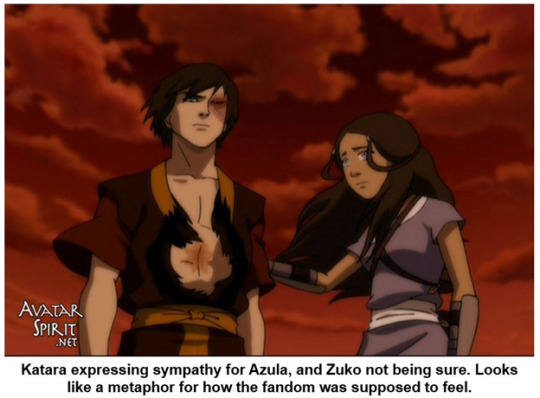
So who is correct?
Well, the Haters are, for the most part.
The show spent a lot of time portraying Azula as unnecessarily cruel without a shred of self-doubt, suggesting her villainy is not just a matter of her upbringing and choices, but intractable psychological defects. Even the Creators wanted Azula to reflect a “deeply rooted malevolence.” To counter this, Azula Fans point to the Finale, and more specifically, to the infamous Mirror Scene.
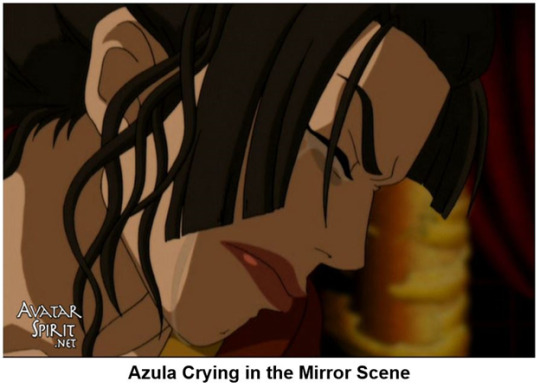
The Mirror Scene shows Azula expressing doubt, remorse, hurt and even tear-stricken grief. The Mirror Scene has been used by Azula Fans to explain all of Azula’s humanity, sort of as a Rosetta Stone of her innerworkings. Even the Creators seem to think this way, as shown by their answers to the Sozin’s Comet interview, and their choice to make Azula’s relationship with her mother in The Search take center stage, and drastically so.
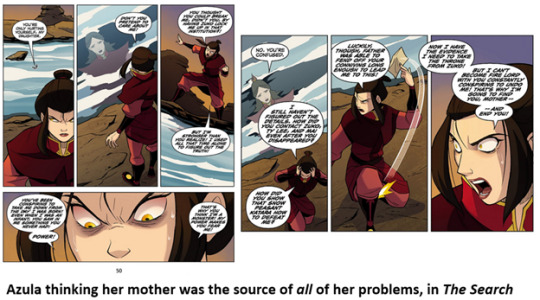
THIS. IS ALL. WRONG.
In order to understand a character, you have to understand their Goals, Motivations, and Conflicts. Any character, especially Azula.
The Mirror Scene and her relationship with her mother are not what’s vital to understanding who Azula is, what she wants and how she fits into the Avatar world. This is not an attempt to be “edgy” or “different” or “contrarian”. You will never, ever find your answers in The Beach or in the Mirror Scene alone, no matter how hard you try. This is because the Mirror Scene is only one of three scenes from the Finale that must be taken together to understand Azula on a fundamental level.
The Mirror Scene is not enough. It has not answered the fandom’s questions about Azula’s Goals, Motivations and Conflicts. It has not provided a compelling argument against the evidence that she is a monster whose villainy was only limited by the censors and, most importantly, the Mirror Scene is not Azula’s most defining moment.
These three, together, are:
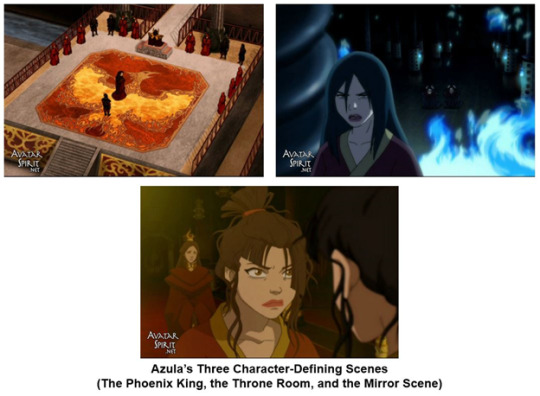
And I will explain why.
Understanding Characters: Goals, Motivations, & Conflicts
This section gets into some of the “nuts and bolts” of storytelling, but it is necessary for understanding Azula; she is too complicated and the source material too thin on her. Stick with this and you should learn something.
In order to understand a character, you have to have a clear understanding of their Goals, Motivations, and Conflicts. Other writers have different terms for these concepts (Need, Want, Desire, Obstacle, etc.), but they are universal to storytelling.
Stories are not meant to be exact replicas of real life. Yes, they can say something about life, but ultimately, stories are about characters having problems to solve and their journeys to solve them. It is not enough for a character to just “feel”. They have to want things, need things, do things, and something has to prevent them from getting what they want and need.
Conflicts are what prevent characters from achieving their goals (their wants and needs). Motivations are what drive characters to pursue their Goals, and Goals are what characters strive to physically achieve.
Goals are physical; they can be touched, held, acquired. They can be a person, a place, or a thing. They are not emotional or psychological. “Love” is not a Goal. Being in the arms of someone or waking up in bed next to them, however, is a goal. Goals are what enable characters to be active in the story, to move through the world, exert force on their surroundings. Sitting on the sofa, or ruminating in a prison cell are not Goals; getting up to join the protest or hatching an escape plan are. At the same time, “wanting power” is not a goal, but “becoming president” is.
For some Avatar examples, “Capture the Avatar” is a Goal. “Master all four elements” is a Goal. “Liberate Ba Sing Se” is a Goal, but “My mother thought I was a monster” is not.
Goals, however, do not exist by themselves. They are the result of Motivations.
Motivations are internal. They are abstract. They cannot be touched or acquired. They derive from the thoughts, feelings, philosophies and psychologies of the characters. Some motivations can be caused by external forces, such as fear of breaking the law, a military commander giving an order to a soldier, or the threat of dying from starvation, but those external forces are not Motivations: fear of imprisonment, commitment to one’s leaders, and the will to survive are because they are emotional, philosophical, psychological.
Motivations are where characters encounter those moral “lines they won’t cross”. It’s where they doubt themselves and wonder if they are willing to go “all the way” to stop the villain. Motivations are what drive a character to question if they should kill the man who murdered their mother, if they should kill the Fire Lord and ignore their culture, or betray their uncle to return home. Without Motivations, characters are robots. With Motivations, characters become people.
But a story where characters face no opposition is not a story. This is were Conflicts arrive.
Conflicts prevent characters from achieving their Goals. They can come from a variety of sources: internal or external; emotional or religious; psychological or philosophical, or combinations thereof. Conflicts can stem from Motivations (for example, somebody violating their moral code), but they are not themselves Motivations. For example, if a character is motivated to carry on the cultural values of their lost people, but their duty requires them to violate that culture, their struggle to reconcile the two is a Conflict. Or, if a character is motivated to be the image of the son his father wants, but finds out that image is completely against everything he stands for, his struggle to remain at his father’s side or leave is a Conflict.
The type of Conflicts that “build character” are the ones that result from Motivations, not merely external forces. A character simply climbing over a fallen tree is not as compelling as a character who must decide if they should cut down the tree when there’s a nest of endangered owls living in it. Characters must decide for themselves. They must struggle with their feelings and values.
However, Goals, Motivations and Conflicts are not the end-all-be-all of character. Characters can have secondary goals and motivations. They can have quirks, flaws and personality traits that give them depth and round them out, but their Goals, Motivations and Conflicts are what creates a story about them. They’re why Zuko being willing to burn down Kyoshi Island does not tell us the full story of Zuko, but it tells us something about him. They’re why Azula hanging Ty Lee over a burning net does not tell us the full story of Azula, but it tells us something about her. And they’re why Aang killing a buzzard wasp in cold-blood does not tell us the story of Aang, but tells us something about what he’s going through and what will make him ignore his values.
In short, we have to know a character’s Goals, Motivations, & Conflicts in order understand them, only then can a character be fully fleshed out in a story that makes them overcome diversity, change and grow.
The Goals, Motivations & Conflicts of Princess Azula
In order to answer the lingering questions about Azula, including how to tell a story about her in the Post-Finale world, you have to understand what she wants, why she wants it and why she is unable to have it. In other words, you have to understand her Goals, Motivations & Conflicts.
As it turns out, the Finale gave us all of this. Now, keep in mind, the Finale doesn’t tell us everything about the Fire Princess, just like how the show doesn’t tell us everything about General Iroh prior to Lu Ten’s death, but the Finale tells us enough in order to develop a workable explanation of her character. This explanation of her character was revealed in three scenes, starting with the one in The Phoenix King where she is speaking to her father on the platform, followed by the scene in Into the Inferno when she is talking to Lo and Li in the throne room, and, finally, the Mirror Scene.
Not everything is explicitly stated and neither does it explain her bullying, teasing, smirking and smugness, but it doesn’t have to. Those are flaws, quirks and other personality traits. These three scenes in the Finale give us the big stuff; the information that’s needed to tie her into the franchise at large and make her a product of the Avatar world versus a mere set of villainous qualities.
And it begins with The Phoenix King.
Pivotal Azula Scene #1: The Phoenix King

I’m sure you can picture it: Azula racing to join her father on the platform, getting told she’s being left behind, frightened because she thought they were going to burn the Earth Kingdom together, snapping at her father for treating her like Zuko, desperately insisting she deserves to be by his side, and, finally, flinching as she gets yelled at.
That’s some big, heavy stuff, huh? She’s been afraid of being treated like Zuko all this time? Burning down the Earth Kingdom is some child-like, emotionally needy ploy to be with her father?? She feels she deserves to be by his side?!? Azula has problems?!?!?
This scene reveals a portion of Azula’s Goals, Motivations and Conflicts.
Before I begin, I must warn you: I’m not going to spend a lot of time using clever words and metaphors to convince you. If you ever have the urge to shout “But wait! I disagree with that and here’s all the reasons why!!” I encourage you to slow down, approach this with an open mind and try to ignore your existing ideas about Azula. Forget about her smirking and smugness, her throwing bread at turtle ducks, her tormenting of Zuko and especially the psychological disorders that people have tried to tie her to. We are focusing on her Goals, Motivations & Conflicts as revealed by the Finale, not essays and fan interpretations. We are applying time-honored storytelling principles to Azula as if we were trying to tell a professional story about her.
Azula’s Goal #1: Be With Her Father
In the Phoenix King scene, Azula said she wanted to “do this together.” She said she deserves to “be by his side.” She doesn’t want to stay behind. These are physical, tangible things. They comprise a Goal.
Why does she have this Goal? Don’t worry about that right now; we’ll get to that later, but right now, the Phoenix King shows and tells that Azula wants to be in the presence of her father. She wants to stand next to him. She wants to do things with him, and she is willing to snap at him over it. This scene also reveals her Motivations.
Hold on. Wait. Stop. I know you’re doing it; you’re thinking, “”But they’re both predators feeding off each other! ‘Be with her father’ must actually mean something sinister and her real goal is to extract power and influence off of him!”
Stop.
Relax.
Forget all of that. We are exploring what the Finale shows and tells us. Ignore fan theories. We are in unexplored territory right now.
Azula’s Motivation #1: Not Be Treated Like Zuko
Not being “treated like Zuko” is abstract. Being “treated like Zuko” means being openly disrespected, thought of as irrelevant, viewed as a disappointment, not being wanted, sent on fool’s errands, belittled and cast aside.
Being challenged to an Agni Kai isn’t being treated like Zuko as the Agni Kai is a standard Fire Nation practice; child Zuko was perfectly willing to fight the general over his mere “disrespect”. If the General had burned him, would the General have been treating Zuko “like Zuko”? Neither is the act of being physically punished being “treated like Zuko”; lots of kids in the Avatar world probably get physically hurt by their parents. Terrible, but not unique.
It’s not the physical abuse that makes someone be “treated like Zuko”, but the emotional. In a society where Agni Kais are commonplace and soldiers are expected to be tough and aggressive, being “treated like Zuko” is a state of mind; it is emotional, philosophical, psychological. Think of it this way: if Azula had been challenged to an Agni Kai, fought with aggression, and Ozai “merely” burned is favorite on the arm somewhere to end the fight because it had served its purpose, and later expressed pride to her because of her aggression, would that physical harm be treating her “like Zuko”? The Fire Nation’s leadership is supposed to have a warrior culture.
In the Phoenix King scene, the Motivation behind Azula’s Goal of “being with her father” is not merely to avoid the physical harm of an Agni Kai, but her fear of being “treated like Zuko” and everything that means. This isn’t the entire message of the Finale, but it’s what this particular scene is saying, and Ozai’s response to Azula’s fear reveals one of Azula’s Conflicts.
Azula’s Conflict #1: Her Father Doesn’t Want Her
Imagine if Ozai had taken Azula with him and they drank tea, played Pai Sho while and, together, lost to the Avatar. She’d probably be far less distraught than she was at the end of her Agni Kai with Zuko. Certainly her hair wouldn’t have been disheveled and she wouldn’t have been screaming and crying.
What prevents Azula from achieving her Goal of “being with her father” is that her father doesn’t want to be with her.
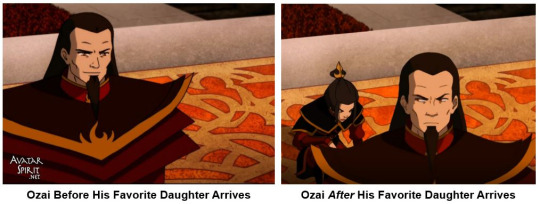
Look at that sequence closely, in particular the change in Ozai’s expression after Azula arrives. Is that the face of a man who wants his supposed favorite around?
Wait. Stop. I know you’re doing it again: you’re thinking about Ozai’s capacity or lack thereof for love, why Azula feels this way or what her ulterior motive is or what psychological disorder is driving her to cling to him like a parasite.
Once again… Relax. We’ll get to that. Just focus on what the Finale is telling us here: Azula wants to be with her father (a Goal), she is scared of being treated like Zuko (a Motivation), and her father is not giving her what she wants (a Conflict).
Does Ozai assure her that he isn’t treating her like Zuko? Does he put his hands on Azula’s shoulders and tell her that that isn’t what’s happening?
No!
He buys her an expensive car to get her to shut up. Azula hasn’t been given what she wants in this scene. “Fire Lord Azula” is not being at her father’s side. Being coronated is not “doing this together”, in fact, it’s leaving her alone. It can be argued that Ozai manipulated Azula in this scene by giving her something she wanted, so how was he able to manipulate her?
By understanding her Goals and Motivations, next of which are revealed in the Throne Room Scene.
Pivotal Azula Scene #2: The Throne Room
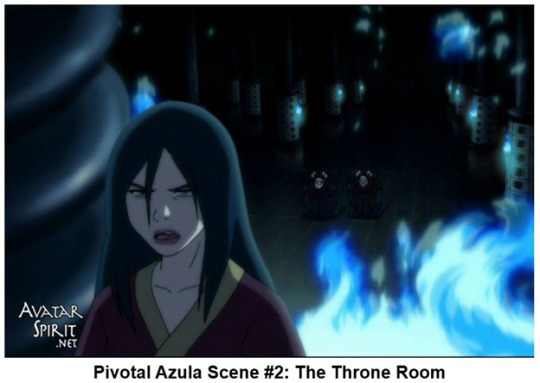
Ever hear the phrase “show don’t tell” in storytelling? Show the reader what the characters feel and what they want? Show what a character is willing to do to achieve their goals? Well, sometimes you do need to tell a reader what a character is thinking in order to make it starkly clear to them, and in the Throne Room scene, we get just that: a clear statement by Azula of what her Goal is, and it is a whopper.
In fact, this stated Goal by Azula is so monumental that it can be considered character-defining. It ties her royalty into her relationship with her father into her being a prodigy into her high standards (“almost isn’t good enough”), even into her struggles to be a “normal” teenager in The Beach. It makes the “Princess” in Princess Azula actually mean something. It makes “Princess of the Fire Nation” actually relate to the Fire Nation.
Azula’s second Goal, as stated explicitly in the Finale, is to be the greatest leader in Fire Nation history. Those are her exact words.
Be something; a physical condition. It requires her to take action, to be active, to accomplish things. It is a Goal.
Azula’s Goal #2: Be the Greatest Leader in Fire Nation History
In the Throne Room scene of the Finale, Azula says that she will be the greatest leader in Fire Nation history. She says it. This is not an interpretation or “reading into” things. The Finale has told the viewer what the Princess component of Princess Azula wants to be when she grows up: the greatest leader in Fire Nation history. This is a Goal; something that can be physically achieved. While it is true that what constitutes “greatest” can be subjective, certainly it involves a combination of reputation and physical accomplishments, especially given the goals of the Fire Nation at the time: conquering other nations and advancing the country’s wealth and power.
That this scene has flown under the radar for so long is mind-boggling. It is akin to asking a child what they want to be when they grow up, only this is a flame-throwing, feudal-era teenager who is being raised to command armies. Look at it this way:
“Little Jimmy, what do you want to be when you grow up?”
“An astronaut!”
“Little Susy, what do you want to be when you grow up?”
“A doctor!”
“Little Princess Azula, what do you want to be when you grow up?”
“The greatest leader in Fire Nation history!”
Azula told us what she wants to be when she grows: the greatest leader in her country’s history. That is a pretty lofty goal that has been tempered by age or experience, something a young person could easily think they could achieve, but then again, maybe it wasn’t so unreasonable for her: she captured Ba Sing Se, defended the Capital from invasion and can bend blue fire and lightning at a young age.
So, why would a princess strive to be the greatest leader of her country versus just lounging around all day? That is for her Motivation to explain.
Azula’s Motivation #2: Her Father’s Expectations + Pride & Belief in Her Royal Title
This Motivation is really multifaceted, but in order to simplify things, it is being tied to her royalty in order to emphasize its connection to the Throne Room scene.
If “being the greatest leader” is a Goal, then the reason why she wants to be the greatest leader is her Motivation.
This is where some speculation becomes necessary. Even though the Throne Room scene stated this Goal very clearly, it doesn’t say much about why she desires this. You have two ways you can approach this question. First, you can cynically assume that Azula is motivated by nothing honorable or relatable, therefore she is closer to a parasite feeding off of the Royal Family, or second, you can assume she is a product of the world she lives in and so is motivated by things that can tell us about the Royal Family, the Fire Nation, and life under her father. Because the former results in no room for growth and change, and is entirely based on psychological theory, this article will assume the latter.
Because there are no clear answers for why she has this Goal in the Finale, I am simply going to list a variety of potential Motivations. Most likely, the answer is a combination of these at the same time:
· Ambition to achieve (like a great athlete striving for excellence);
· Enjoys challenging herself;
· Desires to be someone (famous, notable);
· Internalizes her role as Princess and sees herself as nothing else;
· Enjoys fighting, firebending and military subjects;
· Enjoys politics, ruling and statecraft;
· Excels at her royal role, so enjoys being good at it;
· Believes in the purpose of the Imperial Government;
· Takes pride in Fire Nation history and wants to contribute to it;
· Enjoys having power over people;
· Seeks praise;
· It’s what her father expects of her;
· Believes her father is a great leader and so wants to be like him;
· It’s what’s expected of a Fire Nation Princess;
· Wants to maintain the legitimacy of her family and “prove her worth”;
· If there’s any sort of sexism in the Fire Nation, maybe she feels she needs to work “twice as hard to get half as far”;
· Following the sexism angle, maybe she wants to distance herself from any “limiting” feminine roles;
· And others.
In the Throne Room scene, we are given a hint as to what might be one of Azula’s motivations for wanting to be the greatest leader in Fire Nation history: not being treated like Zuko (i.e. living up to her father’s expectations).
Right before she gives the aforementioned line in the Throne Room scene, she says to Lo and Li that her father doesn’t think she “can handle the responsibility of being Fire Lord”. Perhaps one of the reasons for pushing herself toward ever greater achievements and abilities is to prove to her father that she truly does deserve to be “by his side” and not “treated like Zuko”.
But Azula is also a princess. That is extremely important.
Azula is a member of the Royal Family and is a military and authoritarian leader by default. The Throne Room scene is the chance to inject the Fire Nation into Azula’s character, not just emotional disfunction and psychological dependency. Remember what kind of country Azula lives in: it is full of walking flamethrowers who must be kept in line.
Remember all the warfare in ancient Japan? No? Then take a look at this article, The East Asian Origins of Fire Nation and Its Villains, for an idea as to why the Imperial Government exists and why the Royal Family is very concerned about being successful, and using force and intimidation to do so.
“I want to be the greatest leader in Fire Nation history” is the chance to use Azula to convey broader subjects about the Fire Nation’s politics, history, culture and how they effect someone who is either too young or unable to be what is expected of them: a feared military ruler in a militarized society at 14 years old.
Also note that her goal of being the “greatest leader” was stated after she learned she would be Fire Lord. This means the Goal was not accomplished; the Motivation didn’t go away. Being Fire Lord is not being a great leader; it is simply being Fire Lord. To her, wanting to be the “greatest leader” comes from a much deeper source and, in fact, could be argued as a character-defining Motivation. Along these lines, Azula is not merely Azula; she is Princess Azula at all times, everywhere. To her, there is no “Azula”, but only “Princess Azula”. Her title is her identity.
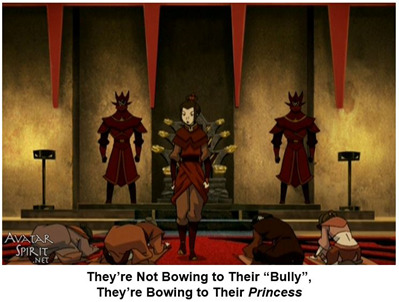
You might have to apply some artistic license here, but you can do so in a way that is both faithful to the source material and builds upon it. For example, while the show was active, there was a description of Azula from the viewpoint of the Fire Nation on Nickelodeon’s website. Note that it sounds very similar to what Zuko said about his sister in Siege of the North: Part 2. This heavily suggests that not only is Azula what her father wants, but also what the Fire Nation and Imperial Government want in a princess.
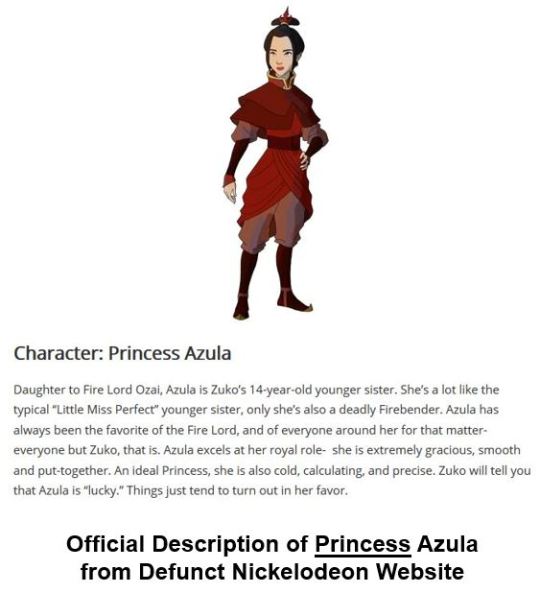
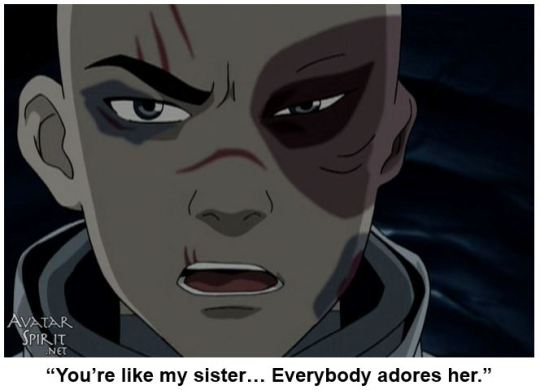
To summarize, Azula’s second Goal is to be the greatest leader in her country’s history and her Motivation for this Goal is a combination of wanting to meet the expectations of her father and flat-out believing and taking pride in her role as Princess. But what about her Conflicts as a result of this Goal? Well, as the Finale demonstrates, she isn’t the greatest leader yet. Once more, some reasonable speculation is required.
Azula’s Conflict #2: She Struggles to Be a Great Leader
Azula felt she had to compel the Captain into taking the ship through the tides right now in order to exert her dominance (this is explained in the Tale of Azula novel). She relies entirely on fear instead of using a combination of trust and fear, like someone who read Machiavelli but wasn’t old enough to actually understand what it was saying; she failed to understand Zuko’s motivations and so he turned against the family; she failed to understand that people are willing to sacrifice their lives for loved ones, or even make stupid mistakes, so she felt personally wounded by Mai; she didn’t know how to handle both Mai and Ty Lee’s betrayal and so lost all faith in her subject’s loyalty; and she banished all of her servants and guards instead of figuring out how to act differently.
If Azula’s father is her “measuring stick” for success, then being at his side and doing things with him is not only protection against “being treated like Zuko” but also a sign that she is doing everything right as a leader in training. Remember that her Goal of being the greatest leader didn’t go away when Ozai gave her the crown; the Goal is coming from someplace deeper.
But Azula begins to doubt herself in the Finale. She begins to feel paranoid and she doesn’t have the life experience and knowledge to tell her why Mai and Ty Lee betrayed her, how to adjust accordingly and what to do differently. She’s never failed before. She’s unsure of what the future will be and she doesn’t have her father to measure herself against. She is not yet a great leader.
She wants to be the greatest leader in Fire Nation history, but how will she become that if she keeps failing and her father left her behind? She wants to be by her father’s side, but how can she be if she’s back in the Fire Nation struggling to have the loyalty of her closest subjects (guards and servants)?
If Azula’s second Goal is to be the greatest leader in her country’s history and the Motivation behind it is a combination of her father’s expectations and pride and belief in her royal title, then her second Conflict is that she doesn’t know how to be a great leader or live up to her father’s standards. In the Finale, she is trying and failing and she doesn’t know what to do.
This leads to the third and final pivotal Azula scene: the famous Mirror Scene.
Pivotal Azula Scene #3: The Mirror Scene
If there were any key emotions during Azula’s breakdown, they were paranoia, fear, anxiety, grief, uncertainty and doubt.
It’s been established by the Phoenix King scene that she wants to be with her father to avoid being “treated like Zuko”. Knowing what happened to Zuko, that must create a hell of a ton of fear, anxiety, stress and doubt within her.
It has also been established that she wants to be the greatest leader in her country’s history. That must also create a ton of fear, anxiety, stress and doubt: will she be the greatest leader? Will she fail? Does she even have what it takes? What if she doesn’t? What if Zuko is better than her? What will her father think of her? What will her country think of her?
During the Finale, she is paranoid about the consequences of disobedient, vengeful subjects who might assassinate her.
She doesn’t know what to do or what the future holds.
She is doubting herself, she is afraid she might fail.
She feels grief, but about what exactly?
There is a pattern emerging from the Phoenix King and Throne Room scenes. You have a teenage girl (remember, that is what Azula is) who is anxious and panicky about being left behind and mistreated by her father; you have a young, military ruler-in-training who has very high standards for herself and is failing to live up to those standards; and you have a member of royalty who is alone, afraid and doesn’t know how to deal with failure or handle what she is feeling.
Remember what I said earlier about ignoring your existing conceptions and feelings about Azula? Well, you also have to ignore the 30-year old voice actress and general appearance of being older. You need to think about the franchise at large.
What were the ages of the main characters: 12? 14? 16? 17 at most? Kids and teenagers, essentially. That is a unique selling point of the franchise—young people going through adversity—and it makes it easier to feel sympathy for them, just as the youth of the characters in the Hunger Games made it more relatable to kids and teens, and allowed adults to feel sympathy as well (adults are the ones who take care of kids and teens).
In fact, the characters of Avatar being kids was an important part of the story: themes of family were critical to Katara, Sokka, Toph, Zuko, Mai, Ty Lee and even Azula (in the end). Therefore, you have to keep in mind the importance of youth to the main cast and franchise at large.
How old is Azula? 14-15?
Do you now see the pattern?
Who do kids and teenagers rely on when they are in trouble?
Who helps them understand their feelings?
Who is supposed to have all the answers?
Who tells them they’ll be okay, they’ll figure it out, they’re not alone?
Parents.
What is Ozai to Azula? A parent. A terrible one by our eyes, but still a parent. Is he there for her during her time of need in the Finale? No. Does he help her understand the myriad of feelings that are causing her to unravel? No. Does he provide guidance as to why Mai and Ty Lee betrayed her and how to learn from it? No. Does he tell her she’ll be okay, to not worry, that she’ll figure it out and she’s not alone? No. Could he have done these things? Yes, because he’s a parent of Azula. Did he? No.
Would it have helped her to have a parent who could walk her through her struggles? You’re damn right it would have. She would have still had a platoon of Dai Lee and Imperial Firebenders to protect her and she’d have been Fire Lord.
But she didn’t have Ozai, either physically or emotionally. She didn’t have a parent to help her. Teenage girl, military-leader-in training Azula couldn’t handle the tidal wave of adversity that struck her, and so she drowned. Lo and Li weren’t parents; they were advisors; subjects. Her servants weren’t her parents; is she going to expose her weaknesses to the people she doesn’t trust and whose respect she must command? Neither were her Dai Lee or Imperial Firebenders (her guards). But she wanted a parent to help her… And she has two.
One of them, her father, not only wasn’t physically present, but also made it clear, in subtle ways, that he wasn’t ever going to be there for her “in that way”; she didn’t jump to the “you can’t treat me like Zuko” conclusion if it wasn’t clear to her that that’s exactly what was happening.
So who is the only other person in the world who can say the things a parent can to Azula? Who is literally her only other parent?
Her mother.
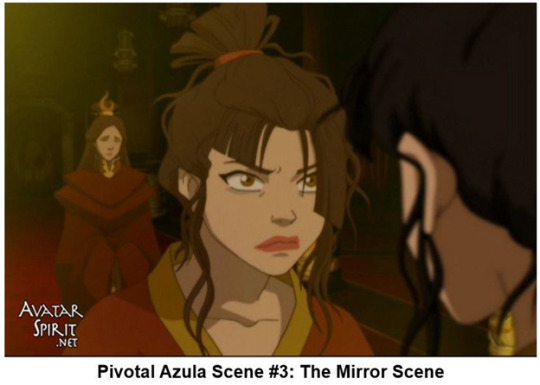
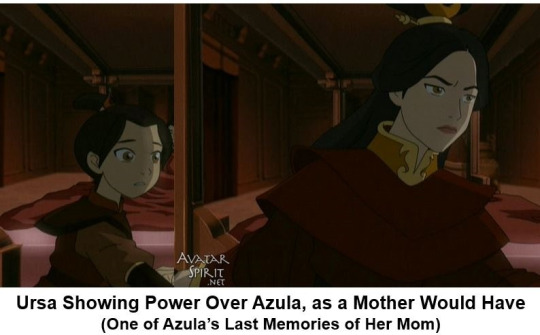
Ursa is not Azula’s conscience speaking to her. Ursa is not a Freudian Excuse. Ursa is not a Shakespearean metaphor for god knows what. Ursa isn’t even a spirit talking to her through the Spirit World. Ursa is, in Azula’s mind, her parent and this reveals Azula’s third Goal.
Azula’s Goal #3: Have a Parent Who Can Help Her
Remember what Avatar is based on: kids and teenagers going through adversity. Ask yourself this: do you believe that all of Avatar was a “lie” and that the “real” Avatar is full of nudity, torture, rape, grotesque violence, “grimdark” themes and the cast is really 18+? I don’t. Work with the source material; it’s what we have, it’s what was made.
Azula is a teenager at the top of a feudal, military government who has extremely high expectations for herself, a father who has her living in fear of being spurned and abused, and who has certain proclivities (i.e. flaws) that are causing her harm. As a result, she is full of fear, anxiety, stress and doubt as a result of her struggle to achieve her Goals. She wants a parent to say and do the things that parents can: sooth their children’s fears, teach them life lessons and help them understand why they’re wrong and how to set them straight.
Azula’s third Goal is to have a parent who can help her, physically be there for her, do and say the things that parents are supposed to in order to make her fears, anxieties, stress and doubts go away.
You always had such beautiful hair?
I wouldn’t miss my daughter’s coronation?
I think you’re confused?
I love you?
Who the hell says those things to someone like Azula?
A parent, or at least Azula thinks a parent would. She might not be able to put this combination of Goal-and-Motivation into precise words, but the teenage girl in her feels it. Her Motivation to achieve this Goal is her feelings.
Azula’s Motivation #3: Alleviate the Stress Caused by Her Goals
Is having a parent the only way for Azula to alleviate her fears? No. She can achieve great things for her country, make marked progress in firebending, be praised by her father, be with her father, have friends to hang out with and, most importantly, she can alleviate her stress by making sure she never fails. If she works hard enough to never experience failure (“almost isn’t good enough”), then eventually she’ll come to believe that she can’t failure, and so won’t be burdened by it. It’s simply impossible… Like an inexperienced person would believe. There is certainly no shortage of highly talented young people in the real world who are both very confident and afraid of failure.
No one wants to live with fear or anxiety or stress; it’s painful and draining. Same for Azula. In her time of great adversity during the Finale, these feelings were not unknown to her; she was already afraid of failure; she was already full of stress over meeting her father’s expectations and becoming the greatest leader; she was already guided by very high expectations. She already lived with fear, anxiety, stress and doubt and it was kept in check by being naturally talented, working exceptionally hard, having the personality for the environment she lived in and never failing. But in the Finale, she was struck by a tidal wave of failure and did not have the knowledge, or support, for staying afloat, like a teenager.
In the Mirror Scene, Azula wants a parent—Ursa, Ozai—to help her with her problems, with her feelings, because she can’t handle them. She is motivated by the fears, anxieties, stresses and doubts of a flawed, inexperienced teenage girl who was raised to be a feudal, military dictator in a rapidly changing world, and is failing.
But as we know, she didn’t find a way to alleviate her feelings in the Finale. Why? Because of her third and final Conflict.
Azula’s Conflict #3: She Doesn’t Have a Parent Who Can Help Her
Could Ozai have helped her? In theory, yes. He knows how to rule through the same manner that Azula is emulating and he’s a 40-50 year old man with the experience, emotional maturity and, most importantly, respect of his daughter. Does he help her? We know he doesn’t. So during the Mirror Scene, Azula retreats to the other parent who could help: her mother, the one who, while not a military leader who rules through fear, can still tell her the sweet, soothing things that mothers are known to say, and say it with the authority of a parent.
But Ursa is not physically present to say those things. Not only this, but Azula doesn’t even believe her mother would say those things, let alone mean them if she did. Why is her relationship with her mother this bad? We don’t know; the show or comics never showed or told us.
However, “my mother thought I was a monster” is not a revelation of Azula’s Goals or Motivations. It is a statement that reveals one of her Conflicts: she doesn’t have a parent who can help her. Either she literally doesn’t have parents who are physically and emotionally present (Ozai), or she doesn’t believe she has parents who are (Ursa).
To repeat, we do not have an explanation for “my mother thought I was a monster”, but ask yourself this: if the “Bear Mother” had actually been standing there during the Mirror Scene, would her words have sounded so haunted, shallow and detached-from-the-moment as if an inexperienced, confused teenager was saying them? Hell no. We’d have gotten the earth-shattering Mother-Daughter heart-to-heart that has eluded the franchise for 12 years (and which likely will never occur).
In the end, Azula did not get the parental support she needed and she didn’t accomplish any of her Goals. She got swallowed by the tidal wave of failure, bashed against the rocks, swirled in the mud and dragged off to an asylum where she will wallow in her misery for all time, never to rise from ashes of her shame and humiliation. Her motivations did not leave her, though; they will burn inside her until the end of her days…
Unless her story is advanced.
The Flaws, Quirks and Personality Traits of Azula
Before this article explains how and why the fandom and Creators misunderstood the Mirror Scene, I want to spend some time exploring Azula’s Flaws, Quirks and Personality Traits.
These are general terms for the variety of additional features that add “depth” to a character. Flaws, quirks and personality traits are separate from Goals, Motivations and Conflicts, but they can cause Motivations and create Conflicts.
For example, if a character wants love (a Motivation) but they struggle with feelings of jealousy (the result of a flaw, quirk, or personality trait), then their Conflict becomes their struggle to overcome this part of their personality when dating their romantic interest. This is a rudimentary example.
Another example would be a husband enjoying watching and hearing his wife scream when she finds fake spiders in the bed (YouTube can reveal lots of example of family members playing pranks on each other). Scaring his wife is not his Goal or Motivation in life; he simply enjoys doing it, and if he is trying to maintain a happy marriage with his wife, this flaw, quirk or personality traits creates a Conflict.
This is how you have to approach Azula’s wickedness in the series. Remember how I said earlier not to think about all of that? Well, now you can.
Smirking triumphantly while Zuko is burned for refusing to fight? Threatening the Ship Captain over a reasonable concern in order to exert her dominance? Throwing loaves of bread at turtle ducks as an 8 year old and still having turtle ducks swim away from her when she’s 14? Shoving Ty Lee to the ground and laughing at her because she upstaged her? Tormenting Zuko over something as awful as his father being ordered to kill him and enjoying it? Smugly hanging Ty Lee over a burning net to make a point? Enjoying teasing and inflaming Zuko? Smirking deviously? Has little respect for others perceived as beneath her? Makes flippant, dismissive comments? Can’t separate herself from her title? Doesn’t appreciate the “softer” sides of leadership (trust, loyalty, love, etc.)? What are these things?
They are Flaws, Quirks and Personality Traits.
Azula’s primary Goals, Motivations and Conflicts are independent from whether or not she feeds turtle ducks by hand or throws the entire loaf at them, or smirks while bullying Ty Lee to establish her dominance, or enjoys teasing Zuko for his perceived weaknesses; Ty Lee would remain a subject to the Crown and Zuko’s problems with his father would not go away.
Azula’s smirking, smug, nasty, sassy, Hyeena-woman persona is what makes her distinct. They are her flaws that create additional Conflicts and exacerbate existing ones. They are the quirks that make Azula a warm body and not simply a set of villainous specifications moving around on screen. They make her feel “alive”. They are the personality traits that separate her from all others in the show.
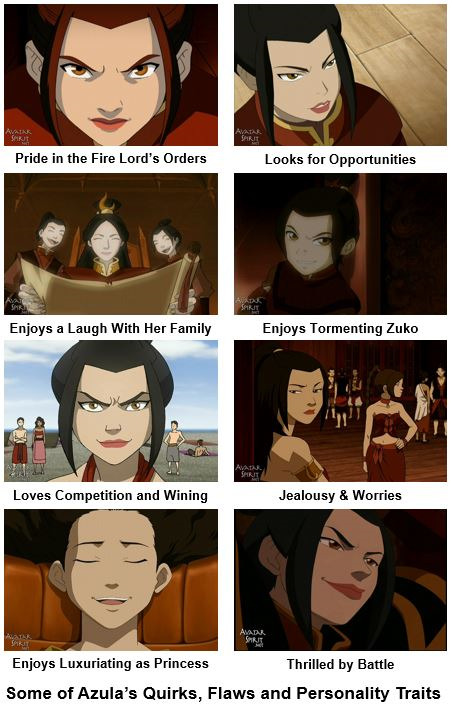
Remember what Azula’s Goals are: be with her father, be the greatest leader in Fire Nation history, and have a parent to help her. For two of those, her wickedness will both help and hinder her.
Not being concerned for peoples’ feelings and having no tolerance for weakness? Makes her able to manipulate corrupt, militant organizations like the Dai Lee. Pushing Mai and Ty Lee too hard and making them resent her? It got her their cooperation, for a time, but it ended up creating the chain reaction of fear, anxiety, stress and doubt that eventually ruined her. Embracing her father’s treatment of Zuko and doing everything necessary to avoid the same? Well, she never really got “treated like Zuko”, did she?
Not having appreciation for trust and love and focusing solely on leading through fear? Makes her able to thrive in the current Imperial Government, but also incapable of adapting to failure. Teasing Zuko? Tormenting him? Perhaps her acting in “evil” ways strained her mother’s relationship with her and lead to the “monster” impression. Now that would be quite the flaw.
Azula’s wickedness both helps and hinders her, and in the case of the Finale, contributed to her downfall. Her wickedness is a flaw. It harmed her. It prevented her from achieving her Goals.
Flaws, Quirks and Personality Traits only tell half the story of a character, and in the case of Azula, they’re not enough to understand who she is and what she wants, and more specifically, they’re not enough to advance her story in the Post-Finale world.
The Distortions of the Mirror Scene
By not paying attention to the two other pivotal Azula scenes in the Finale, the Fandom and Bryke developed a distorted, myopic understanding of the Fire Princess where mental illness, unexplained issues with her mother and violent action against hallucinations comprised the sum total of her complexity.
As a result, just about every piece of the Mirror Scene, from physical actions to key words, along with Azula’s Flaws, Quirks and Personality Traits ended up becoming stand-ins for her Goals, Motivations and Conflicts in official franchise content: The Search and Smoke and Shadow.
By focusing on Azula’s feelings and feelings alone, the Mirror Scene wound up becoming perceived as the pivotal scene for exploring her depth and even became the source of Bryke’s understanding of her when they wrote the comics. Take a look at these panels from The Promise and The Search to see what this means:

Where are her unresolved feelings concerning her father?
Where is her relationship with her country?
Where is her connection to the “Princess” in her name?
This is not to say that Azula’s time in the asylum couldn’t have resulted in her developing such extreme feelings for her mother. In fact, it does make a certain amount of sense: if she is spending her days racked by endless, gut-wrenching shame, humiliation and hopelessness, then the idea of her temporary psychosis from the Finale getting worse is reasonable; it becomes a Conflict for her to overcome.
However, this is not portrayed as what has happened to her. Instead of the Azula from the Finale getting worse, we get the Azula from the Mirror Scene falling off the cliff; all of her complexities from the Finale are absent. Once more, it isn’t that Azula couldn’t have gotten worse, she definitely could have, it’s that Azula’s relationship with her mother alone does not explain the depth of her complexity established in the Finale, which includes her father and country. If she really is suffering from gut-wrenching shame, humiliation and hopeless, leading her to succumb to wacko delusions about her mother, those feelings have to be coming from something already established: her father and country.
If you think I’m cherry-picking, go back through The Search. Scenes like the above happen over, and over and over again with zero mention of anything close to her Goals and Motivations from the Finale. Remember, feelings are not Goals or Motivations; crying about “destiny” and having “proof” in a dream sequence are not enough, especially when the Finale already established the myriad of things she wants, why she wants them and why she can’t have them.
In The Search, Azula is not shown to be motivated by a sense off shame or humiliation over her defeat in the Finale, or sense of responsibility for failing to stop Zuko’s take over of the country. You would expect that someone who wanted to be “the greatest leader in Fire Nation history” would not be dismissive of what their failure resulted in, whether or not her enemies had outside help or not. The closest The Search comes to giving Azula Goals and Motivations separate from her mother is wanting to claim the throne from Zuko over arbitrary reasons of “destiny”. Never in the Finale did Azula espouse “destiny” or a desire to be Fire Lord just for the sake of being Fire Lord; it was tied to her desire to be the greatest leader and please her father. Instead, Azula spends the entirety of The Search lashing out at hallucinations of her mother and wanting to make the voices stop. Not once is her father or country mentioned as Motivation.
Azula does not get portrayed like this unless “love” and “hallucinations” and “being confused” and “my mother thought I was a monster” are taken as the full extent of her Goals, Motivations and Conflicts. You do not portray Azula like this if you properly understand the Mirror Scene as depicting a troubled teenager believing their parent is lying to them (”Don’t pretend to act proud. I know what you really think of me...”) versus her conscience trying to “weaken” her with “love” (”Same as always, Zuzu. Even when you’re strong, you’re weak). In The Search, Ursa is not Azula’s parent in any capacity, past or present, and we are not shown how she has come to feel this way.
You do not make Azula’s relationship with her mother this drastic unless you fully believe that everything about Azula can be acquired from the Mirror Scene and the Mirror Scene alone, and it appears this is precisely what Bryke believed.
In a way, the Azula in The Search is an answers to the macabre question: “How much further out of her mind can Azula go if she believes her mother is the source of all of her problems and every key word and emotion from the Mirror Scene is carried forward?”
To further this point, here are some key lines from the interview in the Sozin’s Comet novelization where Bryke discussed Azula’s “evil”, with commentary added:
“As The Beach and Sozin’s Comet showed, she has a lot of unresolved issues with her mother.”
Yes, it appears she does. Where do they come from?
“She really feels that her mother didn’t lover her as much as Zuko, and this drives her crazy, literally.”
Wait, what? She was already falling apart by the time the hallucination occurred. What about Mai and Ty Lee, her father and her role as Princess?
“There are some truly evil people in the world, but in the case of Azula, her repressed emotions and jealousies corroded her spirit and made her become that way.”
Made her become what way? She’s the Fire Princess; she enjoys being mean and powerful, and she just had a mental breakdown and fell flat on her ass in front of her nation’s capital. What “corroded spirit”?
“And who knows, she might have a chance to heal.”
Heal from what, her villainy? Her personality? Her breakdown? She wouldn’t be Azula anymore?? What are you referring to??
By itself, the Mirror Scene does not reveal Azula’s Goals, Motivations and Conflicts. By itself, it only shows examples of things that give Azula grief and confusion and clearly recognizable human emotions that the viewer can relate to. In other words, feelings.
Feelings are not Goals. Feelings by themselves are not even Motivations; they have to be in the context of wanting, needing, desiring something in order for them to become Motivations.
“My mother thought I was a monster” is not a want or a need or a desire. It is a statement of a Conflict and nothing more, whereas, “My mother thought I was a monster (Conflict) and this eats at my soul (Motivation) because I want my mother in my life helping me (Goal)” is getting somewhere.
Using the mirror scene as a sole reference is how Azula’s throwing of the hair brush in the Finale turns into shooting lightning at water, or her gripping her hair and screaming to reject the words of “love” from the hallucination, or her desiring to literally murder the physical embodiment of the hallucination; it’s because the writers are trying to wring every drop of meaning from this out-of-context interpretation of the Mirror Scene.
It’s how her want for the throne is based on vague, brand new notions of destiny instead of duty to her country. It’s how you get not a single word from Azula about wanting to correct her image in the eyes of her father... Because the Mirror Scene didn’t say any of this; it was all about her mother, love and confusion.
And don’t think this myopic, excessive emphasis on the Mirror Scene and Azula’s feelings was limited to Bryke. Oh no. Nobody is getting off easy.
Take Aaron Ehasz’s comments about his brain bugs for a Post-Finale Azula arc in a hypothetical Season 4, which many fans have found inspiring and also devisive:

He focuses on “pain”, “love”, “feelings”, “change”, even uses the magic word “redemption”. These are all abstract. Where are Azula’s Goals, especially those revealed in the Finale? Where is “I will be the greatest leader in Fire Nation history?” What does she want to accomplish in this Season 4? What will she be doing? Feelings are not enough. Motivations are not enough. There have to be Goals attached to them.
“Azula is in the depths of her abyss” is not a Goal, whereas “Azula is in the depths of her abyss (Conflict) because she wakes up every day with gut-wrenching feelings of shame and humiliation that she wants to go away (Motivation), so she wants her normal life back (Goal)” is, once more, getting somewhere. And better yet: “she will do whatever it takes to end her misery” is the beginnings of a story.
Now take a look at what author Gene Yang wrote when he was asked by a fan if it is possible for Azula to have “happy closure.” What does “happy closure” mean? Well, as someone who now understands Goals, Motivations and Conflicts, you know that it means a character achieving their Goals and no longer having any Conflicts, but what is Gene Yang’s answer?
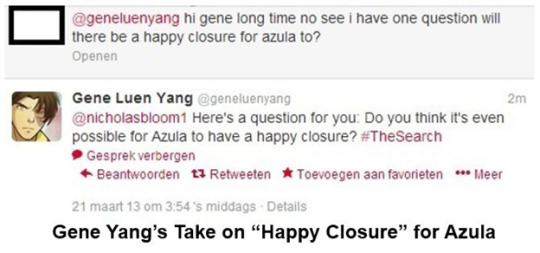
He says it’s not even possible.
Of course it’s possible for Azula to have “happy closure”. Any character can. It’s a matter of them achieving their Goals or losing the Motivation for them. She’s not a robot.
But hold on! Wasn’t Gene Yang just being vague? Wasn’t he only trying to make a point to get the fan to think for themselves? Maybe even hide the plot of Smoke and Shadow?
You could have thought that at the time, but as we now know from Smoke and Shadow, Gene Yang wasn’t making a vague, thought-inducing comment to that fan. He was stating that Azula can’t achieve her Goals or change her Motivations. Remember what her Goals and Motivations were from the Finale: be with her father, be the greatest leader in Fire Nation history, and have a parent who can help her. None of those Goals and none of the Motivations behind them were resolved at the end of the Finale, or by the end of The Search; they were ongoing. We didn’t even find out if they had changed between the Finale and The Search. Now take a look at these two scenes from Smoke and Shadow:

Not even Azula’s mother and brother know what she wants, and in fact, neither do Gene Yang, Bryke, and for the longest time, the majority of the Fandom.
Why can this conclusion be made about the Creators? Because Azula’s Goals, Motivations and Conflicts established in the Finale, and which had not been resolved by the end of The Search, disappeared entirely in Smoke and Shadow.
Without hallucinations, without her mother’s voice giving her haunting assurances of love, without feelings directly attached to the Mirror Scene, there is nothing else inside Azula in the minds of the Creators. Once she runs away into the forest at the end of The Search, after hearing hollow platitudes from her brother, she becomes “weightless… free”.
There are no unresolved issues with her father. There is no goal to be the greatest leader in her country’s history. There is no desire to absolve herself of her failures to prevent the old regime from falling. There is no sense of personal responsibility for failing to stop Zuko and thereby prevent the destruction of the colonies. There isn’t even a relationship with her mother if it can’t be tied to hallucinations.
By placing all emphasis on the Mirror Scene in the comics, everything about Azula became searching for “love” and feeling “confused” because those were the key words used by the hallucination in the Mirror Scene. “Love” becomes just a word she needs to hear (“I love you, Azula” from the hallucination, “You’re still my sister” from Zuko) without regard to who it comes from (supposed to be from her parents) or whether it is actually meant (there is no reason for Azula to believe Zuko, or even seek it from him; he’s not a parent and he’s a mortal enemy responsible for her ills).
There was nothing about one’s duty to their country as a Princess; there was nothing about living up to her parents’ standards, both parents’ standards; there was nothing about becoming the greatest leader in Fire Nation history, and becoming Fire Lord (either via the letter or vicariously in Smoke and Shadow) is not becoming the “greatest leader” to Azula. It simply means being Fire Lord. This is what was revealed in the Finale when she still wasn’t satisfied despite being on the verge of being crowned. And finally, there was nothing about resolving her feelings of fear, anxiety, stress and doubt that resulted from her failures to achieve her Goals during the Finale.
So why did this happen?
On the Creators’ side, it’s impossible to speak for them, but judging by the interview in the Sozin’s Comet novelization, not even Bryke paid attention to the Phoenix King and Throne Room scenes. They became myopic about Azula’s relationship with her mother too, and forgot all about her other relationships and motivations, namely those involving her father, country and self. As a result, their understanding of their “favorite villain”, as they described her in the Art of the Animated Series, became a vacuous, distorted mirage (literally a ghost in Smoke and Shadow) of her former self and her Arc that was begun in the Finale was abandoned entirely.
On the Fandoms’ side, it’s a combination of things:
1) The Fandom had not been “primed” to have their view of Azula challenged, so the “subtleties” of her relationship with her father and country got overshadowed by Ozai donning a ridiculous outfit, Azula banishing people in a blue-colored throne room and “Oh my god, Ursa!!”;
2) The Mirror Scene was “sexy”; it was eye-opening, jaw-dropping; it made you go, “Holy crap!” The eerie violin score was haunting, the voice acting was top notch and it had big, bad Azula on her knees sobbing like a wimp. Naturally, it stood out in peoples’ minds whereas the Phoenix King and Throne Room scenes fell behind the desk, and thirdly;
3) Azula’s relationship with her mom is primarily about feelings. A show as visually stunning and well-voice acted as Avatar is, first and foremost, about inspiring feelings in the viewer. In fact, all stories are about inspiring feelings. The Fandom did not go into the Finale looking to learn about Azula’s complexities, so The Phoenix King and Throne Room developments did not receive the same amount of intense, emotional attachment as the Mirror Scene. Simply put, the hallucination of a mother telling her teenage daughter that she loves her, and that same teenage daughter collapsing into tears over it, is much more heart wrenching and relatable to kids and teenagers than the pressures of ruling a military feudal dictatorship in the image of the Big Bad.
Summary
To understand a fictional character, you have to know their Goals, Motivations and Conflicts. Next, you have to identify their Flaws, Quirks and Personality Traits, which add distinction and depth and provide internal sources of Motivation and Conflict.
Azula’s Goals, as revealed in the Finale, are as follows:
Be With Her Father;
Be the Greatest Leader in Fire Nation History;
Have a Parent Who Can Help Her;
Azula’s Motivations, as revealed in the Finale, are as follows:
Not Be Treated Like Zuko;
Pride & Belief in Her Royal Duties;
Alleviate the Stress Caused by Her Goals;
Azula’s Conflicts, as revealed in the Finale, are as follows:
Her Father Doesn’t Want Her;
She Struggles to Be a Great Leader;
She Doesn’t Have a Parent Who Can Help Her;
The Mirror Scene and Azula’s relationship with her mother are not enough to reveal her Goals, Motivations and Conflicts. The Mirror Scene, by itself, is only a Conflict, whereas the two additional scenes in the Finale—the Phoenix King and Throne Room scenes—provide her other Goals, Motivations and Conflicts that make the meaning of the Mirror Scene clear: a teenager looking for the support of a parent.
Excessive emphasis on the Mirror Scene and, by extension, Azula’s relationship with her mother, have created a distorted view of Azula that has harmed her portrayal in the comics and stymied explorations of her value to the Franchise. Instead of Azula being a feudal military leader-in-training who struggles with both her feelings and Goals, she has been reduced to both a myopic interpretation of the Mirror Scene and is limited to her Flaws, Quirks and Personality Traits, none of which are enough to advance her story in the Post-Finale world.
Closing Remarks: How to Move Forward with Azula
For those fans of Avatar who are curious about what to do with Azula’s Goals, Motivations and Conflicts, and makes use of her Flaws, Quirks and Personality Traits, you have to ask this question: what value can more Azula bring to Avatar?
No individual character will be more popular than the franchise itself, especially a hated villain who might have the ability to change and grow. Below is a screenshot from Google Trends showing the relative popularities between Azula, Zuko and Avatar: The Last Airbender search results. It demonstrates that secondary characters like Azula are nowhere near as popular as the franchise they are a part of.
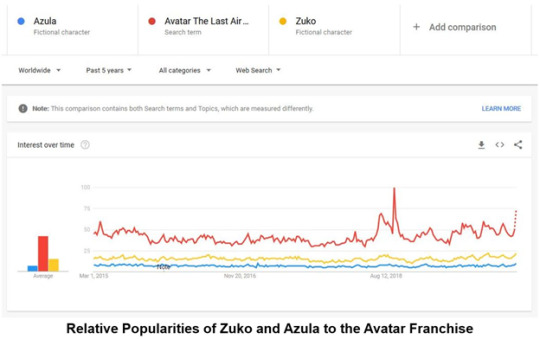
In order to make a character like Azula worth exploring in detail, they have to be made important to both the Main Cast and the Franchise at large. It’s not enough to just have “a” story about Azula; her Goals, Motivations and Conflicts have to be valuable to the Heroes and world of Avatar. There are no hard and fast answers as to how to achieve this, and the franchise has clearly moved on from Azula, but with Avatar being rebooted in live action form, here are some ways to begin approaching this in case the live action version moves into Post-Finale territory.
Azula’s Unique Selling Points
These are the things that make a character fun, interesting and enjoyable to have on screen. In other words, likable. Toph’s cheekiness, for example, is a Unique Selling Point. Aang’s free-spiritedness is a Unique Selling Point. These can also be called the “fun and games” of a character. They are what viewers want to see, hear and feel when these characters appear on screen. For example, if Toph and Azula are going to appear on screen together after Azula is taken out of the asylum, there better be sass, like in Day of Black Sun.
Azula: Um, right. I think your friend just said that genius. And since you can't see, I should tell you I'm rolling my eyes.
Toph: I'll roll your whole head!
So what are some of Azula’s Unique Selling Points?
Blue fire;
Lightning;
Skilled martial artist and firebender;
Royalty;
Intelligent;
Snarky and smug;
Smooth-talking;
Confident;
Female in a militarized society, but who does not eschew femininity;
Makes “princess” associated with power and aggression, not passivity;
Dark subject matter surrounding her (e.g. the unresolved emotions in the Finale);
Determination;
Emotional fragility;
Youth (the kid/teenager themes of the show).
Azula’s Value to the Franchise
This is what makes a character more than just a background character or plot device. It’s what makes them create new fans of the Franchise, add interest, sell product. In other words, add value.
Haru, for example, adds little value to the Franchise because he’s just a regular Earthbender with no Unique Selling Points and his relevance to the plot and characters is over. Iroh, on the other hand, is absolutely full of Unique Selling Points and provides insights into the Avatar world and its characters. His perspective adds value. His abilities add value. His importance to the Heroes adds value.
So what makes Azula relevant to the franchise beyond just being a villain?
She can teach us about firebending through her blue fire and lightning;
She can provide an aggressive firebending female, which ATLA does not have;
She can teach us about the Fire Nation through the eyes of someone who doesn’t appreciate Zuko’s transformative policies;
She can teach us about what it means to be a girl/woman in the Fire Nation;
She can teach us about the Fire Nation’s military, government and history;
She can represent the “old” Fire Nation that Zuko must reform.
Azula’s Critical Relevance to the Heroes
Since any story is ultimately about its characters, Azula not only has to be relevant to the Heroes, but critically relevant to justify deeper exploration. So to which characters is Azula critically relevant?
Ursa, Zuko, and to a lesser extent, Iroh.
As Azula’s mother, Ursa will be implicitly concerned with her daughter’s well-being regardless of how us fans feel; as a young member of the Royal Family who can firebend, she is relevant to the Royal Family’s continuation, and by extension, Zuko’s legacy; and as the sister of Zuko, she is Iroh’s niece, in other words, family.
Essentially, if there is any drama surrounding the Royal Family in the Post-Finale world (and how could there not?), Azula is a fundamental part of it. I call this the “Royal Family Drama Triangle”.
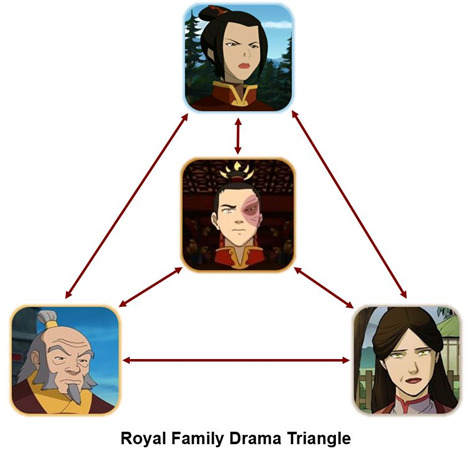
Azula’s Critical Importance to the Plot
Azula must also be essential to both resolving the Primary Conflict of the story. This forces the viewer or reader to implicitly care about Azula’s Goals, Motivations and Conflicts since she impacts the fate of the Heroes directly.
What are some of the problems that Azula can be critically necessary in solving? To begin answering this question, you have to sit down and think about what kind of problems the Heroes would face in the Post-Finale world. This article series, How to Develop Avatar’s Season 4, provides one such scenario.
One way to answer this question is to look at the unchanging aspects of Azula’s character, the thing’s that don’t go away whether she is a villain or not, and these are: 1) she is a young, firebending member of the Royal Family; 2) she is a member of the old regime that Zuko must reform; and 3) she is Ursa’s daughter. This suggests that the type of plot that Azula can take a major role in is one where the Fire Nation and Royal Family are at the center. Princess Azula of the Fire Nation might not care about the rest of the world like Zuko, but certainly she will care about the Fire Nation and its Imperial Government.
Some of the specific problems in the Post-Finale world that Azula can help solve:
Quelling unrest in the Fire Nation over Zuko’s policies;
Stopping a rebellion against Zuko and the Imperial Government;
Saving the Royal Family from assassination/coup (i.e. eradication);
And others if you can come up with them.
How to Develop an Arc for Azula
Finally, how do you go about developing an Arc for Azula in the Post-Finale world? Remember that to understand a character you need to identify their Goals, Motivations and Conflicts. This also applies to creating a character, but when it comes to creating an Arc, you have to add in the Epiphany.
A character’s Epiphany is simple to describe, but difficult to execute: it’s how they grow and change in order to either achieve their Goals, or lose their Motivations and move on in life. The Epiphany is the result of the character’s journey to achieve their Goals combined with their Motivations, Conflicts, Flaws, Quirks and Personality Traits. It is, in essence, what the story is all about. For example, Zuko did not arrive at his Epiphany easy and his decision to betray Iroh in Crossroads of Destiny was not a random step backwards: it was the result of everything about him. An Epiphany for Azula would undoubtedly be complicated and multi-layered, probably much, much more so than Zuko’s.
To begin developing an Arc for Azula, you first have to identify what remains of her Goals, Motivations and Conflicts from the Finale when the story picks up with her in this new Post-Finale story. Remember that she suffered a mental breakdown, was humiliated in the eyes of her nation and has been locked away in an asylum for some length of time.
Next you have to devise a new Central Conflict that drives both her and the Main Cast through the story, something that requires all of their actions to solve. Then you have to establish her new Goals, Motivations and Conflicts in relation to that Central Conflict and the Post-Finale situation she faces, and finally, you have to put her in situations that test her, make her think, challenge her values, that make her change and grow. How you do this is up to you, but her are some pointers:
Always think about her Unique Selling Points. Blue fire? Make her ability to produce blue fire important to the story and not just a thematic decision. For an idea as to how to tie blue fire into the Avatar world at large, see the article, The Science and In-World Reason for Azula’s Blue Flames.
Azula was locked in an asylum? Make it have lasting effects on her that she struggles with. She is royalty? It better be more than just a title, but responsibility and a part of her personal code. Snarky, confident, intelligent and brave? There’s a lot you can do with someone who doesn’t shy away from danger and enjoys infuriating people, especially when they have the literal firepower to back it up.
Always strive to make her add value to the Franchise. She is a female firebender, something that ATLA has a dearth of. This is good; make her femaleness mean something. Along these lines, she is a great opportunity for a “Female Power Fantasy”. Just ask R.F. Kuang about it. She is also not the victim of circumstance or the actions of others as many characters in Avatar are. This gives her a different type of change and growth story compared to Zuko’s.
Use her to talk about the Fire Nation’s militarized culture, the same culture that “pure heart and unquestionable honor” Zuko somehow has to change. Use her to reveal the Fire Nation’s history and politics as it pertains to Zuko’s rule without going into “Info Dumps” since, as a princess, Azula would naturally be concerned with those subjects. Also use her to help advance Avatar’s East Asian themes. The fact that Azula is a feudal leader-in-training and female can give you a lot of material to work with (east Asian origins article).
Maker her critically relevant to the heroes. Find legitimate reasons for why Zuko, Ursa, Iroh and even members of the Gaang would care about Azula’s thoughts and feelings; if they care we care. Don’t think this is possible? It is definitely possible.
And finally, make Azula critically important to the plot. She cannot be a side character; she is too loathed and hated and has too much bad blood with the Gaang for her presence to be tolerated without some pressing need for her to be around. Whatever role she takes, it has to be big. It has to be obvious that Azula’s involvement is required. The Gaang has to think, “Well, damn, we need Azula’s help.” Zuko has to think, “I hope she makes the right decision and helps me. I know she can.” Iroh has to think, “I hope my niece isn’t killed.” Ursa has to think, “I want the love of my daughter. I want my daughter back.”
In short, you have to make Azula important.
Remember: her Arc in the Finale was not finished. It still can.
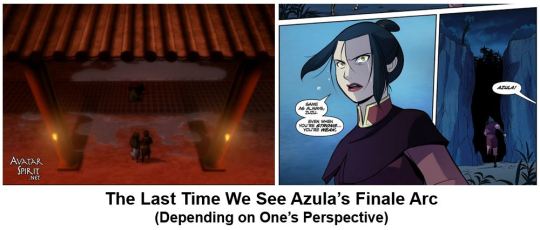
454 notes
·
View notes
Link
Chapters: 6/6 Fandom: Destiny (Video Games) Rating: General Audiences Warnings: No Archive Warnings Apply Relationships: Eris Morn/Ikora Rey Characters: Eris Morn, Ikora Rey Additional Tags: 5+1 Things, Hello destiny sapphics; allow me to introduce myself, Femslash, if nobody is going to write the content i want to see then i will create it myself, listen. it's about perceiving the weak and wounded places in someone you love, and lavishing love and care upon them even when they won't admit they need it, it's about the Mutual Support, it's about being kind to them even when you don't know how to be kind to yourself, Light Angst, Fluff and Angst, Hurt/Comfort, oh and ikora has the most Distinguished Bisexual energy i've ever seen so jot that down, it doesn't come up but you needed to know, this is all just a bunch of softness and tenderness don't @ me okay
Summary:
Five storms Eris and Ikora weathered and one they didn't need to.
The Shadowkeep weblore lives in my head rent free. Set post-Taken King and mostly during Shadowkeep.
“As I told Asher, there is a storm coming...” “Oryx is dead. We’ve weathered the storm.” Ikora is upset. She has yet to understand the bigger picture. “Yet his sisters would see his will done. There will always be another storm.” “Then let’s weather it together.” -Shadowkeep Narrative Preview #1
Many thanks to @hencegoodfortune for the beta read and of course for the memes.
Chapter: | 1 | 2 | 3 | 4 | 5 | +1 |
Set just after The Taken King.
Eris knows she is not in the Hellmouth. Although the Tower has never felt the same since her ordeal on Luna, she recognizes it easily nonetheless. At every moment, the freshness of the open air reminds her that she is here, she is on Earth. She has been for some time now.
However, she has never forgotten how to move like a ribbon through the darkness, arcing undetected round predator and prey alike. She doubts that she ever will. Sometimes the habit returns of its own accord, and she’ll find her feet and hands floating weightless as she moves. Joints and muscle and sinew flex in careful concert to absorb every sound before it is made. The lines of lightly tensed limbs spiral seamlessly into the coiled core of her, tethering her in perfect silence. At the same time, she remains ever ready to fight, ready to flee. How often has Eris’ last, Lightless life lay along the knife’s edge of a split-second choice, the divergence between action and stillness, vengeance or survival?
Somehow, the smooth stone of the Tower’s level floors is harder to walk quietly on than the rough winding warrens through Luna’s porous rock. There are no edges to test with the edge of her boot, no uneven surface to ease her soles onto by swift and silent increments. There is only the unsubtle strike of heels on a flat, unforgiving surface. She makes the most of it, as every Hunter here does. Still, it leaves her uneasy. Her feet cannot quite keep to the ground.
Consequently, she often finds herself pacing, wandering from her post in the heart of the Tower whenever she grows restless. Every step falls lighter than the last, chasing silence in a meditation on weightlessness. It does not make her feel any better.
After so long underground, she is unaccustomed to the plenitude of open space here. While she has traced much of the Tower’s perimeters, the negative spaces in the centers of broad rooms and vaulted halls she leaves less frequented. She is too exposed there.
Yet maybe she is less affected by the empty space than the sheer number of souls that so often fill it. After so long so alone, they are simply so many, pressing at her survival-sharpened awareness from every angle. Not to mention she attracts too many of their stares in the crowded plazas. Although detection here is not followed by shrieking howls or the lightning strike of boomers, distrustful eyes still make her hunger for shelter. The choice to endure or to withdraw still needs to be be made. And whether well-meaning or ill-intentioned, a close approach still makes her instinctively recoil.
Eris has scraped out a place for herself here, lingering close enough to share with those who will listen the knowledge she has gained at a terrible price. But it has been made clear enough that she does not belong here anymore, not as she once did. If the condemnation of the Speaker and the only begrudging trust of the Vanguard’s Commander were not enough to tell her that, then the wary regard of most of the Tower’s populace would. So she holds herself back, toward the edges of things. It is difficult to do so at her station so near the Hall of Guardians, the greatest locus of Guardian activity on the planet. She draws herself to her full height and stands there proud, but never takes the ground she stands on for granted. When it becomes too much, like now, she paces.
This time, her pacing has led her to the edge of the Tower where her ship was once tethered. With how wary she has grown of exposed spaces, the open sky above that lays bare every courtyard and balcony should send her seeking cover - and yet, it does not. If anything, its incomprehensibly vast expanse calls to her. Strange.
Eris has traversed the spaces between planets with her own fragile body, with only a ship’s hull to keep the cold from swallowing what remains of her. Yet from Earth’s surface, a few mere miles of atmosphere transforms that emptiness, and its beauty holds her spellbound. It scatters sun into prismatic slices of light. The stars’ unblinking gaze softens into a flutter of eyelashes. No longer can she see the narrow spectrum of colors that humans evolved to discern; it has all faded into endless shades of the same hue. But the contrast of such brightnesses against the dark have become sharper than ever. Indeed, daylight has become a blaze to truly blind her. These stolen eyes of hers were made instead for depths and shadows.
Even so, she often finds herself staring out into the searing sky until her head aches. The sensations make her remember. She is no longer buried beneath stone, lost to this cosmos. She is free now, in some ways.
Eventually, her wanderings bring her back to the shaded refuge beneath the stairs just outside the Hall of Guardians. She is glad for this, too. Her station provides some small respite for her sensitive, ever-weeping eyes. And there she stays, until exhaustion drives her to rest, or else grief or fear or restlessness or her ever-smoldering rage drive her to pacing once again.
It’s true that many other eyes pass by that shadowed alcove of hers. Guardians constantly sweep in and out on either side of her, running and jumping and gliding up and down the stairs with urgent reports and important orders and burning questions for the Vanguard. They are so bright. Few of them spare a glance for her, these days, save for startled new Lights.
There are a few, though, who look upon her not with distrust or fear or begrudging tolerance, but with recognition. Once in a great while, cousin Asher will grace her with his inimitable company. It gladdens her heart, even when he merely stops to exchange research notes or brief insults. He cleaves to his research with a passionate vengeance, as does she. Unlike most, he pays more attention to her knowledge and her current work than her past. With the way he helped care for her in the months after her escape from Luna, she has come to hold him in close confidence.
On occasion, her friend the Guardian, who avenged her fireteam upon the very souls of Crota and Oryx, stops to greet her. Sometimes they bring her news from Luna or Mars. Words are few with that one lately, though. These days, their outgoing ghost is the one who relays whatever tidings they carry. The change leaves a cold shadow over Eris’ heart. Therefore, she values their quiet presence all the more. She fears for them.
Of course, Ikora’s is the kind regard she is subject to most often. Eris has never forgotten that Ikora believed her since the beginning. Most met her genuine warnings of inbound danger from the Hive with distrust, dismissal, or fear. Ikora not only listened, but met her with endless kindness. Even now, as the Warlock Vanguard steps into nearer chamber of the Hall for a brief consultation with Lord Shaxx, she spares a moment and a smile for Eris.
Ikora’s smile has always been warm and real and reassuring, a balm on the fibers of frayed nerves. Among the very few who welcomed Eris back to Earth, that smile was a signal of genuine care and safety that she homed in on immediately. The one directed at Eris now is subtle, a mere quirk of the lips. Yet it hints at the vast depths of passion and compassion below the surface, like a ripple that disappears swiftly on the surface of a deep, deep pool.
Ikora’s outward cool composure that obscures that intensity is not a façade. It is more an ingenius piece of architecture, a mighty aqueduct capable of holding and channelling the endless font of her inner immensities. It is an elegant and functional work of art well-kept and expanded over centuries.
The warmth that must be behind such a small yet genuine smile is palpable; it falls on Eris like the creeping warmth of sunlight, sinking in deep even though it scarcely touches her skin. Even the lower half of her face, where her many layers do not shield her from long-lost Sol, is still sallow and nearly as grayed as the dust of Luna. She hadn’t known at first, with the changes to her vision, not until Asher had told her. He never does shy away from the speaking of truth. In those endless years of darkness, the lack of light and loss of Light took something from Eris, sapped something vital, and left something strange in its place.
Yet Eris can feel the sun again, now. She can walk out into the courtyard at any time of day, find a south-facing wall to lean on, and bask in the radiating warmth like an ectothermic reptile.
Even without leaving the cool shadows of her post, another warmth still reaches her. Ikora offers her one more smile as she goes to return to her own station. Eris stands a little taller under the aegis of her regard, her spine the stem of a sunflower lifting her toward its steady kindness.
Eris takes not a single one of these boons for granted. Each one is a precious gift far beyond what she ever expected to experience again, after her descent into the Hellmouth. Yet none of it can quell her restlessness, for it springs from the same source as her gratefulness. It always comes back to what happened to her on Luna.
Each time she returns to her pacing, the Tower feels a little smaller. The scope of the sky distracts her for a shorter time. Now, even after her sworn vengeance upon the Hive has been fulfilled twice over in double deicide, the path of her vow still pulls her feet forward. She does not know where its shrouded course leads, only that there is still a threat yet to be met along it. More and more, she is certain that she cannot wait here to meet it, or it will be too late.
However, she never expected to leave behind wounds when she leaves. After she departs to sight the next storm on the horizon, she is haunted as often by the surprised hurt that she left in Ikora’s eyes as by the memory of her smile.
#eris morn#ikora rey#destiny 2#eris/ikora#erikora#ikoris#destiny the game#destiny fanfiction#lizzie's adventures in writing#destinewt#long post#fic#HELLO I AM FINALLY HERE WITH THE FEMSLASH#apologies if i misled you with the o14 this is actually my usual abode#it's mostly written so look out for updates soon!#happy season drop have some sapphics#it's a beautiful day in a non-femslash-focused fandom and you are a terrible little lesbian here to cause problems on purpose#please talk to me about these ladies i love them so much#; ;
8 notes
·
View notes
Text
IF24 speculation screaming
Preview
With all of the preview caps available, there’s been a lot to take in; from Ibuki with Majesty Lord to Emi’s fairy wings to all the boys’ younger selves playing together in the park. So this might be a tad all over the place but hoping to condense thoughts coherently.
— Emi and Aichi are both shown to be wearing their powered forms; this might be as part of a flashback which covered Emi’s first interaction with Aichi after his disappearance, allowing Shuka to remain in the season past her sacrifice. For Aichi, there seems little reason (or even if it’s possible) for him to done the Alfred costume at this stage, and with his eyes normal, I’ve my doubts that the new screencap of him takes place in the present, more so after the glimpse in the preview after IF23. Something assuming full control isn’t likely to care what state he’s in or continue any pretense that he has any control over himself. It might be in part why Aichi hasn’t paid that much attention to Ibuki, picking to brutalize Ren instead, when their history might be crucial in the foundation of IF’s story. It may come from Emi and Kai’s taking flight, comparing the Aichi of then to the one of now radiating all kinds of ominous energy or Nome’s recounting earlier events. The point for Emi when Aichi was no longer missing but the enemy; she was well aware by her and Shuka’s infiltration in the first episode and we’ve been shown notable moments through their fight, but not the moment when they discovered the identity of the Jammers’ commander-in-chief.
— Twitter Fanguards are excited at the prospect that the young boys playing in the park is a sign that the timeline’s resolution will grant the ideal timeline where no-one is left alone. To be cautiously optimistic, the thought that had come to my mind initially was the scene being a depiction of a timeline that Kai and/or Ibuki are fighting for or one they imagine might have come about if they had done something differently, sparing Aichi the anguish of his IF childhood and connecting everyone far earlier. If it’s the former, there’s hope that IF25 might serve as an epilogue to emphasize on giving us an glimpse at this perfect timeline while the Outside World characters establish all is well on their end and returning to their normal lives.
Destiny Conductor 2.0 Nome
The glow of Nome’s screencap insinuates his usage of the Akashic Records, but the smile he has is rather ominous, suggesting that his taking off after recruiting Ibuki and Suiko always had a much more sinister undertone to it. The possibility that’s been sprouting personally since Kourin was debunked as being the one pulling Aichi’s strings is that Nome has been the one in that position all along.
During the PsyZombie arc, it’s possible that, whether through Takuto or by another means, Nome became infected by Brandt’s power, positioning him as his brother’s successor. With Brandt defeated once, by taking hold of the Akashic Records, he/it was able to take an entirely different approach: if it couldn’t twist the original timeline to its will, it would use another. The starting point: the boy who crushed Brandt’s ambition.
As established by Takuto as the strongest, Aichi became the primary target of this second effort. Whether the Aichi of IF is his Outside World self pulled within the world and overwritten to live a second childhood like Kai-kun, or the one native to IF World, it works either way. — Outside World Aichi, who might have still held a fragment of Brandt’s power within him from Destiny Conductor’s direct involvement in his sealing, through his Psyqualia which has remained tainted since, thus never freeing him entirely from the power, even though he was unaware ever since, had that exploited as a seed from which his imagination would fester from the below. — IF World Aichi, whose life was monitored by Nome, to prevent any future possible encounters with Vanguard. Using the Akashic Records, Nome mapped out both Kai-kun and Aichi’s so the former’s would be as happy and peaceful as possible while the latters’ plunged him into the depths of solitude, haunting him with images of Kai-kun to ready Aichi for breaking, by his own hand or seeing Kai-kun by happenstance. As a result, Aichi’s power had no outlet and festered, spilling over ultimately when Takuto appeared and turned the key. In the scenario of Outside World Aichi, his line “it’s been a while, Kourin” would reference their time together directly, but in the case he was native to IF’s timeline, it might be Brandt speaking through him. In a manner of speaking, IF serves the same purpose as the Sanctuary from Legion Mate; a means of containing Aichi so that he can’t wreck havoc, whether in good way or bad.
The colour scheme of Aichi’s power has resembled Brandt’s and his binding Kai-kun resembled Link Joker’s (a clan with which Brandt has a connection) power to Lock — Ibuki even saying “Unlock” while Superior Realizing Harmonics Messiah — so until it’s 1000% debunked, I’m still clinging to this theory that’s been building over the past few months.
Aichi isn’t Nome/Brandt’s sole target, however. Charged with their duty to oversee the multiverse, the Tatsunagis are in the enemy’s sights. Takuto and Kourin placed half of the family within IF straight away, Rekka and Ren following and we were witness to Nome roping in Ibuki and Suiko. Aichi was used as bait in order to draw the family in its entirety within a world that is distorted to the point of requiring intervention, where the strongest fighter has been twisted into the enemy. There’s simply no coincidence about collecting them in one place, Takuto was used as the objective for Rekka and Ren. — Takuto specifically has the additional motivation of being the failed first Destiny Conductor. If Brandt has been within Aichi, that might have been reflected in his demeanour leading up to and during the meeting with Takuto; there’s not enough to discern if IF Aichi truly has the hostile side we’ve been seeing or that be a result of the current crisis. — Like Aichi, if IF Kai-kun is the Outside World version sealed, that would likewise remove him from being an immediate threat, as one of the strongest Vanguard fighters. Meaning that Ren and Ibuki, as the other greatest threats to a Brandt resurgence, were perfect candidates for the remaining Tatsunagis’ teams, bringing all the vital players for Brandt’s previous failure onto the board.
And in a world without Vanguard, a world where Aichi is overflowing with power that even he couldn’t control, it’s the perfect time for Nome to step onto the stage and reveal himself.
Emi, Kai and Aichi
The screencap of a winged Emi and Kai gives the impression that they, alone, are heading to the final battle with Aichi, and it’s tremendously fitting. Emi began this journey with one partner by her side, and this way, she would end it with one. Though the nature of that partner will have changed drastically: from someone important to her, who belongs to another world, to someone invaluable to Aichi, presumably native to the timeline with them.
The dynamic between IF Emi, Kai and Aichi is quite unique; with the state of the multiverse in mind, Emi represents the life of isolation Aichi has lived until this point, the only person who was with him throughout years of torment and loneliness. Whereas Kai embodies the possibility wrought from other timelines; what Aichi could and should have grown into, the friends around him that Aichi was meant to have connected with. They represent Aichi’s family and friends respectively, the two people most important to him in IF’s timeline where one was his reality, his daytime, and the other his long-off dream, his nighttime. Both, equally, want him back, even if it might cost the existence of the three of them — like Aichi, they’re prepared to sacrifice themselves if it means grasping what they believe is right.
For those who know Fate/Grand Order, IF very much resembles a Lostbelt, so at the resolution of the fight, with its correction, the world is likely to vanish — with anyone who belongs there. If Aichi, Emi and Kai are all native to IF — and they’re the only characters at the heart of this story who we don’t know for certain come from the Outside World — Emi and Kai separating from the others spares their friends the anguish of losing someone else right before them. The Outside World characters know the cost, but they don’t have to witness it, and can remember Emi and Kai by their happier times. Ibuki and the others instead are charged with stopping Nome’s ambition with the family and their partners gathered as well as seeing the small Kai-kun and Aichi meet, so their assignment to correct history is complete.
Emi and Kai’s battle with Aichi is a much more personal one, so they go ahead to save him by their own hands. Emi to get back the brother she’s been chasing all along, Kai to see the happiness he was gifted shared with the person who gave up so much to protect it, whom he wants to see smile by his side, who he wants to return Blaster Blade to. When Aichi is rescued, the three of them remain together, accepting the end of their world and their anguish. Kai-kun doesn’t return to his parents, having already made the choice of Aichi and the original timeline over them long ago, it serves as a demonstration for Aichi’s eyes that he won’t be left behind in the shadows anymore. After losing so much, none of the trio are alone as they watch their world fading away, reconciling and huddling or even Kai-kun and Aichi having a cardfight so that Kai can share with Aichi the fun they were supposed to have, Emi watching as her brother shows the side she’s always known him to have before someone else. It’s bittersweet, but all three of them could be united and experience true happiness at the end.
#Cardfight!! Vanguard#Cardfight!! Vanguard IF#cfv spoilers#speculation#goes out there hard for maybe one last time for this season#IF is honestly a blessing for all the fun theorizing it's brought back to me#no matter how bumpy it got at times I love it for that alone
11 notes
·
View notes
Text
Better Call Saul Season 5 Review
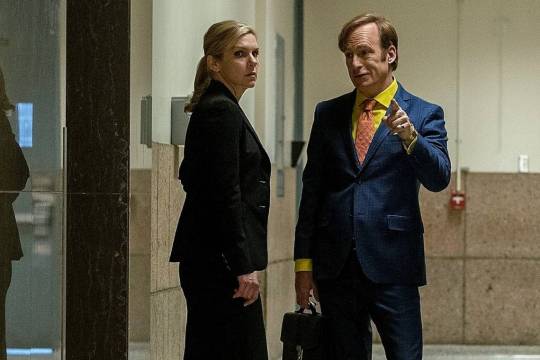
The difficult penultimate season. It is a somewhat under-discussed but common occurrence in TV drama. FX greats: Justified, The Americans and The Shield all had near faultless runs, but in their second to last seasons stumbled to different degrees. Depending on how you break it up The Sopranos experienced its weakest run of episodes in 6A before hitting its classic final stretch. Add to the list Six Feet Under and probably quite a few others and you can see that it resembles something of an obstacle for long-form TV drama. Why is this? In the aforementioned show they spend much of their penultimate season table-setting for their final run of episodes. It can sometimes be forgotten about because all of these shows stuck the landing (similarly Game of Thrones’ weak first half of its last season is largely forgotten about because the last 7 episodes are even worse) but nevertheless there can be a difficult balancing act between setting-up the all-important final season and delivering hours of TV that are satisfying in and of themselves. Thankfully it is a balance Better Call Saul strikes, not only managing to not falter but in fact exceeding with its strongest season yet.
So how does Better Call Saul succeed where others struggled? I think the answer is indicative of very nature of the show. Where the shows mentioned above spent 10 or so episodes, making sure all the dominos were set-up before they were to come crashing down, for BCS the end has always been in place. While Breaking Bad was a propulsive ride full of events; BCS has always been less concerned with getting to the next big moment, instead favouring the times in between. As a prequel we have always know the destination of this journey, admittedly with a couple of significant caveats.
The most significant of which being Kim Wexler. More than just the MVP of BCS, Kim is one of the most compelling characters on any TV series at the moment. Of course her story has the biggest question mark over it because she is the most major character in BCS not to appear in Breaking Bad, but through this season and in particular in the finale a whole new ambiguity comes over her arc.
Mimicking the finger guns gesture Jimmy made toward her at the end of the last season, which had signified his identity shift to Saul Goodman (as he made it official with a name change) Kim truly turns the tables here. After a night of appearing to be jokingly discussing the ways in which they may sabotage Howard’s career, it turns out Kim may not have really been joking. Despite everything Jimmy has done to Howard this season he is taken aback by the notion Kim would actually consider ruining a man’s career and life. Where we had always thought that this was the story of all the things that break Jimmy down into becoming Saul, the question now becomes whether this is in fact the story of Kim’s transformation?
The other key strength of Season Five was the way in which the show was finally able to intertwine its two halves. My biggest criticism of BCS in the past has always been that it felt like two separate shows edited together. On the one hand you have the Jimmy and Kim show and on the other you have the Mike show. The Mike show has always felt like more of a direct prequel to Breaking Bad, sometimes to its detriment. It is not to say it hasn’t been responsible for some great scenes or whole episodes in the case of season one’s Five-0 but at its worst it can sometimes feel like it is just filling in gaps in the Breaking Bad mythology (e.g. how did Hector lose the use of his legs). In the second half of this season though there’s none of that fragmentation. By finally having the two often separate strands linked the Mike show feels more vital than ever and we get the best run of BCS episodes yet (from about 5-9 I would say).
A large part of that is certainly down to Lalo Salamanca. Breaking Bad loved a big bad, whether it was Tuco, the cousins or a certain Gus Fring, the show was populated by some of the greatest villains in TV history. BCS in its earlier seasons had a fantastic villain but of a very different variety in the form of Chuck but with Tony Dalton’s scene-stealing turn as Lalo they have a truly great out and out antagonist.
The fact he is not in Breaking Bad would seem to point to only one conclusion when it comes to what exactly his fate will be, but the question remains just exactly what havoc he will wreak on his way there. Many expected this season to end with the death of Nacho, but while Gilligan and Gould spared him for now only time will tell. The finale itself actually felt a tad underwhelming on first viewing after the above mentioned run of classic episodes. In some ways it was frustrating but in a way that is typical of BCS.
Having said that, this season BCS was more willing than ever to embrace aspects of its predecessor. This season’s outstanding eighth episode (directed by Gilligan) largely set in the desert evokes some of Breaking Bad’s best hours. At the same time though BCS always feels distinct in various ways. In the penultimate episode Kim and Jimmy are backed into a corner when Lalo arrives and are forced to work some way out of it, much in the way Jesse and Walt so often were, but unlike Breaking Bad BCS revels in the anti-climax. No blood is shed in that scene. The finale is similar in this sense, while Lalo does admittedly massacre a small army of guys, the tragedy of this story lies beneath the surface. After their big confrontation with Lalo, Jimmy and Kim spend most of the finale in a hotel room not even discussing what had happened. Yet the show still mines a great power out of the smallest of gestures. No planes come down, no hospital rooms explode but this show never lacks in emotional depth.
While I recently re-watched Breaking Bad in its entirety, reminding myself what a clinically perfect piece of storytelling and film-making that show still is, season 5 goes some way to legitimizing the BCS vs Breaking Bad conversation. While I personally can never see myself subscribing to the view that BCS is a better show than Breaking Bad, the quality of this season on top of the already excellent previous four seasons, makes it seems a somewhat less outlandish claim, which I don’t believe could ever have been anticipated five years ago when this started.
Grade A
31 notes
·
View notes
Note
litcherally anything where geralt is being mean to jaskier and then is guilty when it actually upsets the bard bc he doesn’t think before he speaks :( and then making up for it and realizing how all these things he’s said over the years have weighed on jaskier and JUST TRYING TO BE BETTER AFTER THAT. tysm i love ur writing
Get ready to hurt.
______________________________________
It happens so suddenly that Geralt finds himself stunned and stumbling like a soldier in his first battle.
He’s surrounded in a field full of growling, snapping ghouls trying to kill the fucking massive alghoul in the center when he hears it. Unmistakable despite the unexpectedness.
“Geralt!”
Jaskier’s voice is high on adrenaline and foolish courage as he rushes into the fray with his Geralt’s spare sword held high. He slashes at the ghouls who turn toward the noise, managing through luck or skill to hack off the head of the first and shove another away.
Geralt curses viciously--torn between the need to protect the damn fool and the logic of killing the alghoul first.
The beast decides it for him, slamming one hand into Geralt’s chest and leaping to close the distance between itself and Jaskier.
Jaskier turns--blue eyes wide and frightened--and takes the hit on his side, falling beneath the onslaught of a monster of nightmare and legend. He disappears beneath the weight of it.
And Geralt sees red.
He feels his hands grip onto the oily, slick, and rotting skin of the next ghoul and yanks its head loose in one vicious pull. His sword moves in a violent arc through the next, clearing the way to the alghoul with almighty purpose.
He can’t get the image of Jaskier’s expression out of his mind.
It drives him to madness as he roars and slams his weight against the alghoul--the last of the monsters left in a field of blood and viscera. The beast shrieks, bloodied jaws reaching for his throat, but Geralt is beyond caring. His sword is too large for such close conflict so he lets it fall to the grass, rolling with the rotting creature as they struggle bodily for control.
His hand slips low and finds the familiar hilt on his thigh.
He thrusts upward, blade moving like an extension of himself. High and sharp and cutting deep--
He feels the wet pull of muscle giving way beneath his fingers and snarls into the face of the beast above him--
A twist, and then it goes still, face frozen in a permanent maw of agony.
Geralt lays still for a moment, panting, before he shoves the carcass off of him and gets to his feet. His heart is still pounding a vicious rhythm in his chest thanks to the adrenaline and potion he’d downed before wading into the fray. He scans the impromptu battlefield desperately, terrified of what he’d find.
Then, a groan and a small shift of movement.
Panic and terror gives way to anger as Jaskier slowly gets to his feet using Geralt’s sword as a crutch. He turns--his face streaked with mud and oily blood--and beams at Geralt.
“Well, Geralt, I think we really proved--”
“What the fuck do you think you were doing?” Geralt’s voice is whip quick and carries the same sting. He sees Jaskier’s expression falter, but he’s near seething now. “I told you not to come near this area.”
“I know, but you didn’t come back when you said and I--”
“What? You thought you would be able to come in and save me?” Geralt’s sneer felt as sharp as the ghoul’s hunger. “Did you really think you would be anything but a gigantic pain in my ass here?”
Jaskier’s voice trembles slightly and he leans more heavily against the sword. “Geralt-”
“The only thing you are good for is crafting lies to charm women into your bed and getting on my last damn nerve--neither of which is any good here!” Geralt paces away from him, trying to blow off some of his frustration by kicking on of the corpses.
“Please, I--”
“What, Jaskier? How could you possibly think that I would be glad to see you rush in like a damn fool just to get yourself included in the next stupid ballad you--”
Geralt’s words give way to horrified silence a moment after Jaskier fell unconscious on the ground.
He runs forward, ignoring the mud soaking into his clothes as he pulls Jaskier up against his chest. The bard is pale, completely limp in his grip. The stolen sword falls to the ground from lifeless fingers and Geralt feels his fury drain away so quickly he is breathless.
“Jaskier,” he calls, shaking the man. “Jaskier, wake up.”
Nothing.
The only sound he hears is the echo of his vicious words and the heart beneath his palms beginning to slow...
_____________________________
The bite is high on the chest, just above a dusky nipple and the heart that continues to pulse weakly.
The sight of it makes Geralt feel a cold sweat creep down his back. A ghoul’s bite is poison for human, Vesemir’s voice murmurs from his memories. Better to kill the poor creature than to let it make the change.
Just the thought of using one of his blades to slit Jaskier’s throat makes him turn and vomit bile and regret onto the grass.
There are more injuries littering Jaskier’s body, but Geralt knows that it is the bite that will doom them both. Already black lines filled with poison are spreading away from the cutting--taunting Geralt with their inevitability. This close to Jaskier’s most vital organs, it might only be a few hours before the bard would draw his last breath and awake a monster.
Unless...
Geralt’s hands shake as the reach for the knife at his side. It’s still caked with ghoul’s blood and he pauses to wipe it clean meticulously. He reaches out and cups one of Jaskier’s clammy, cold cheeks and whispers,
“Forgive me.”
And begins to cut.
_____________________________
Jaskier’s wakes--wild and glassy-eyed--after Geralt makes the second incision.
The ghouls blood stinks like rotten pus and burns like acid as it drips sluggishly from each carefully placed cut around the bite. His mouth is bloody from coaxing the black liquid free and his hands are forced to pin Jaskier flat against the earth as he works.
The bard screams, high and agonized. His eyes fix on Geralt mindlessly and tear carve pale trails through the dirt streaked across his face.
“Please--no! Don’t!” he begs, “Geralt, please!”
Geralt grits his teeth, feeling his own eyes burn at the betrayal in those blue eyes. “I have to get the poison out.”
His knife digs deep once more, the line jagged as Jaskier arches bodily in a weak attempt to escape the pain. He thrashes, wild as an animal caught in a trap, and sobs.
“Please, Geralt. I’m sorry. I’m so sorry. Please, I’m sorry.”
The bard babbling cuts off with another scream as more blood gushes from the wound. His body seizes and Geralt is forced to lay bodily against his in an attempt to keep him from hurting himself more.
Geralt’s heart is made of ice and stone as he sees the last of the darkened and sickly blood run clear of the wound. His hand clenches around the slick handle of his knife and he takes a deep breath. The scent of poison and rot has faded now beneath the acid sharp scent of pain radiating from the sobbing bard.
He takes a breath and tells himself he deserves this suffering.
His hands trace the sigil Igni as he looks over the trembling man beneath him, face turned away from the Witcher and teeth chattering in agony.
He waits until the blade is red hot before he presses it firmly against the bite.
Jaskier’s scream sends the birds into flight.
__________________________
There are no towns close enough to risk moving the bard nor does he have some hidden trick that will summon a mage or a healer to his side. It is the first time since the mountains of Cairgorn that he has wished to see Yennefer, if only for her ability to heal what he seems incapable of not destroying.
Jaskier is still in his arms as Geralt carries him out of the woods and down a game trail that takes him to the trapper’s cabin that had started the mess. There are scratches and blood along the walls, but the door and windows are still intact. The bed stinks of old sweat, but Geralt finds fresh sheets laying limp and forgotten on the clothesline outside.
He makes the bed quickly, the unfamiliar task sped by the sight of Jaskier lying silently on the ground nearby.
The silence, he decides, might be the worst of it. It gives him plenty of time to remember the cruelty of his voice and the hurt he seemed to spew at Jaskier at every opportunity. Somehow, he always manages to lash out against the only person who has ever remained loyal and devoted even after seeing the worst parts of him.
But this, this might be the final blow that brings Jaskier’s endless faith to its knees.
Geralt tries to tell himself that he could watch Jaskier leave him if it meant the bard would survive this.
It is little comfort.
____________________________
Geralt stands watch over the too-still body for three days before he begins to hope that Jaskier might live.
He’s barely left the small bedside except to call for Roach and bring water and food for the bard. He washed away the blood and mud until Jaskier looks soft and young--so damn young--and almost peaceful. If you ignored the red, angry burns across his chest.
The scars are brutal--far more fitting for a Witcher than a bard. He winces when he thinks of what Jaskier will say when he sees them. The vanity and snobbishness of the courtiers Jaskier plays for is foreign to Geralt, but he would strip the skin from his bones to keep Jaskier from feeling their scorn or pity.
Geralt has ruined so much of the man laying pale and broken before him.
He leans his head against the mattress, feeling his eyes burn once again at the reminder of what he had done. Jaskier could have died with Geralt’s sneering and mockery still echoing in his ears. He would have believed every bit of the poison the Witcher spewed in place of real emotions and to avoid the concern he truly felt. It proved what Jaskier had been trying to disprove all along:
Geralt was a monster.
_____________________________
The Witcher wakes to hands carding through the tangled strands of his hair.
For a moment, his mind is at peace, enjoying a rare moment of calm with Jaskier--
Geralt’s head snaps up so quickly the bard jerks in surprise, wincing as the gesture irritates the wound on his chest. Geralt feels his body tremble faintly and his voice is raw with emotion when he speaks. “Jaskier?”
Jaskier gives him an awkward smile that doesn’t quite reach his eyes. “Ah, yes. Sorry for waking you. It just, it looked like you were uncomfortable.”
The bard’s voice is raspy and rough from the screams Geralt will hear in his nightmares for the rest of his life. He stands quickly and grabs a cup near the water pitcher to press to Jaskier’s lips. “Stay still,” he says, “You still need to rest.”
“Must be bad if you stayed,” Jaskier answers with a trace of bitterness. Blue eyes flick to Geralt and then skitter away to focus on the fingers toying nervously with the sheets. “You don’t have to, you know. Stay, that is. I know I shouldn’t have distracted you like that. You don’t owe me anything--it was my fault.”
Geralt’s throat goes tight and he falls to his knees beside the bed. He grips Jaskier’s hand like it’s made of glass, pressing his forehead against his palm. Tears drip unnoticed down his cheeks and his voice trembles, “I thought I’d lost you.”
“Geralt...”
The Witcher shakes his head when Jaskeir starts to speak, determined to release the words that had been swirling in his mind since he’d seen Jaskier charging into battle.
“I should never have said those things to you. It’s just--I thought you’d died when that alghoul turned on you and it was easier to be angry than be scared. Then you nearly died right after I said all those horrible things, and I--”
Jaskier’s hand shifts against him, coaxing Geralt’s chin up until he was staring at the bard while tears dripped down his cheeks.
“I would never survive losing you, Jaskier. Not now, not decades from now when we’re both old and slow. I will never forgive myself for all the scars and the pain I’ve caused you and I wouldn’t blame you if you chose to leave me for it.” Just the thought made his stomach twist in knots. “But if you give me a chance, I will spend the rest of my life making up for every horrible thing I’ve said to you.”
Jaskier’s eyes are bright with an emotion that Geralt is too terrified to hope for. His fingers tighten around Geralt’s jawline until the Witcher raises up on his knees to close the distance between them.
“Ready to start making it up to me?” he purrs and leans forward to swallow Geralt’s sigh of relief with his lips.
100 notes
·
View notes